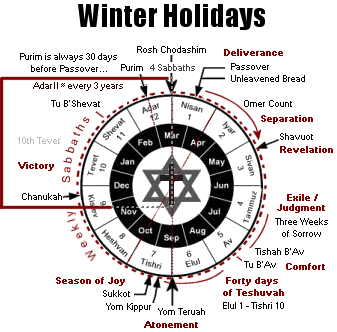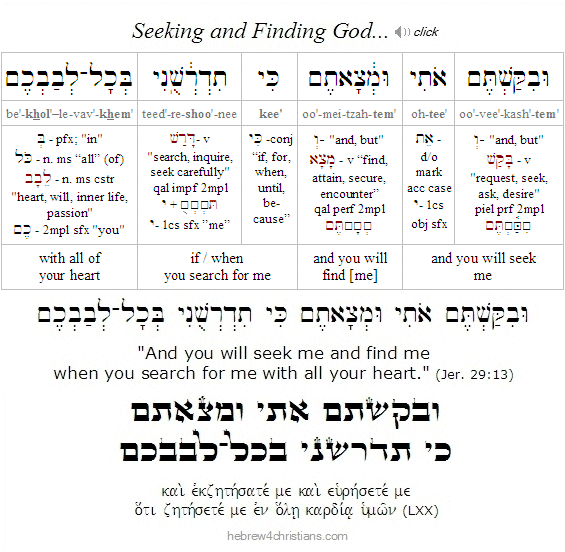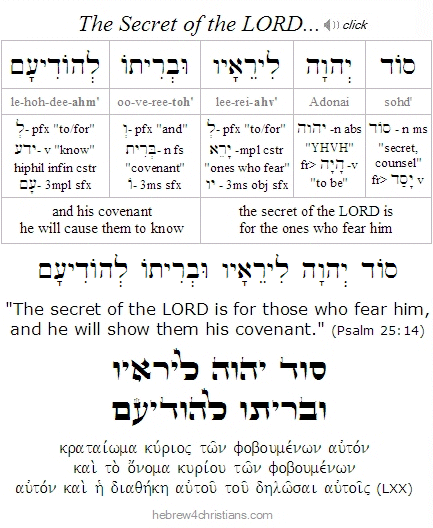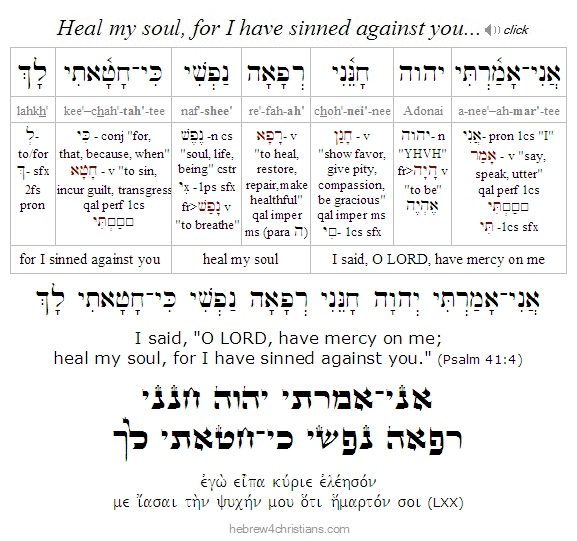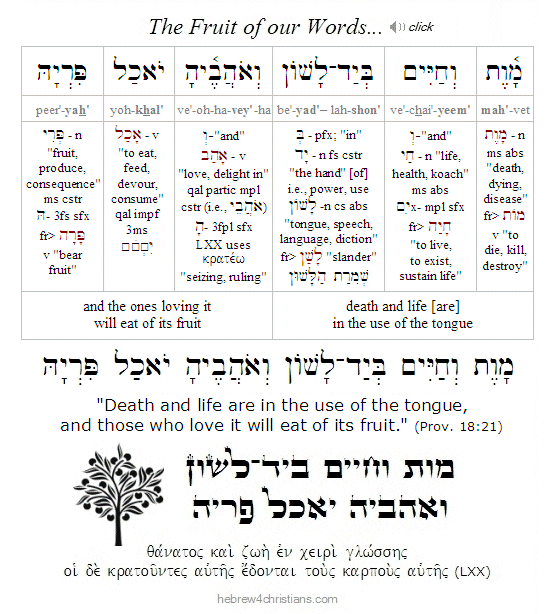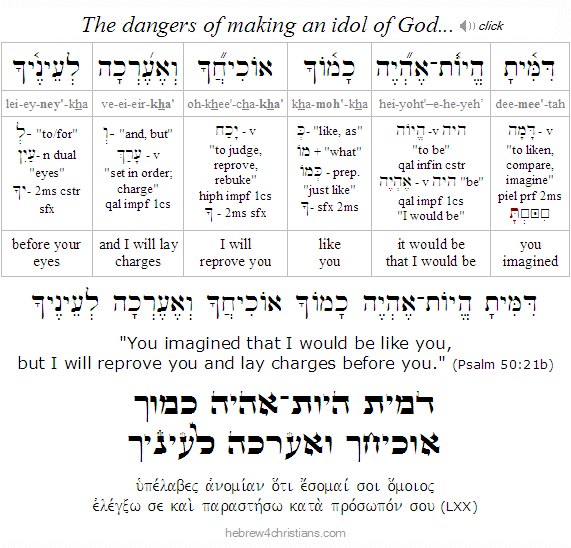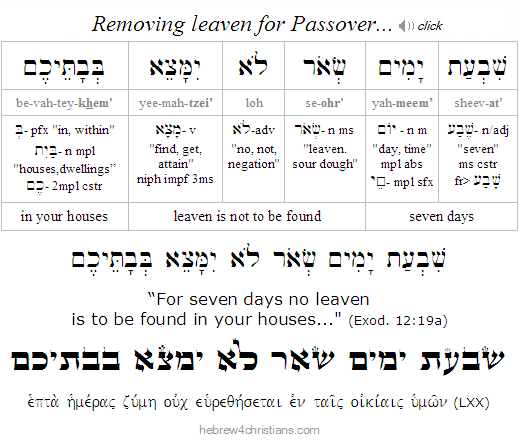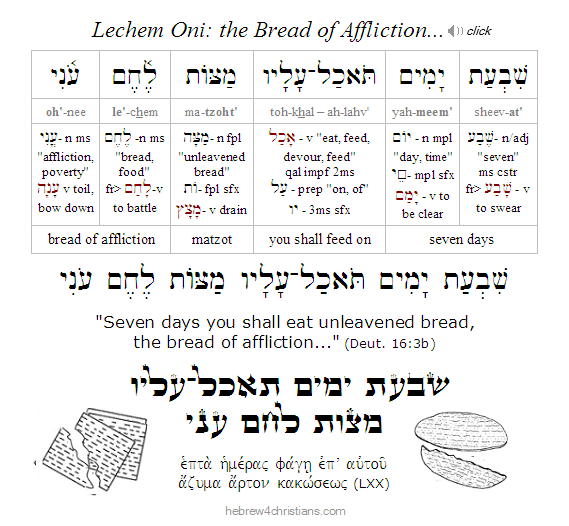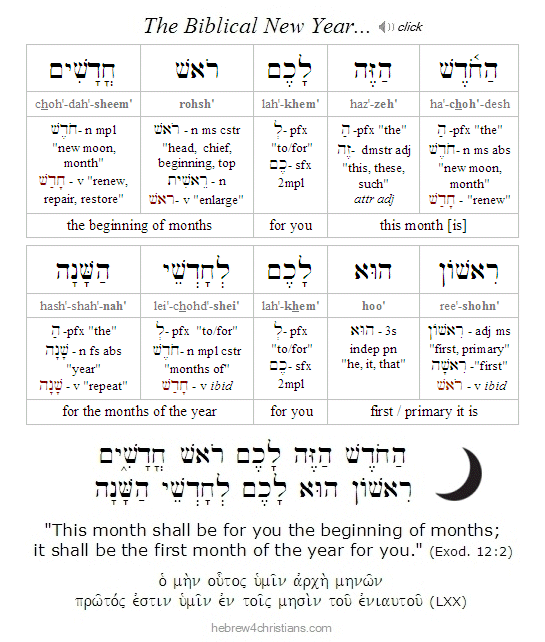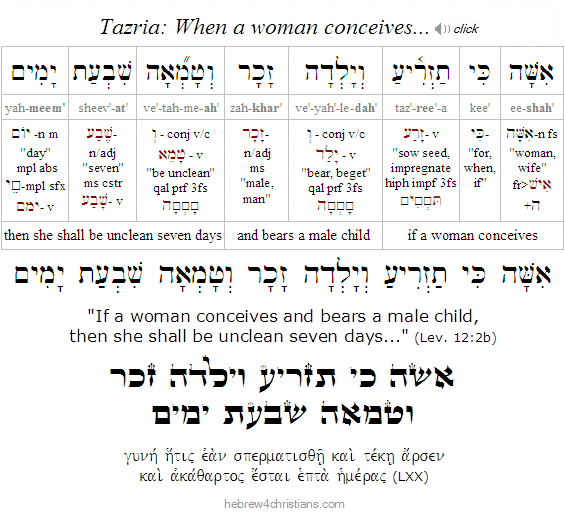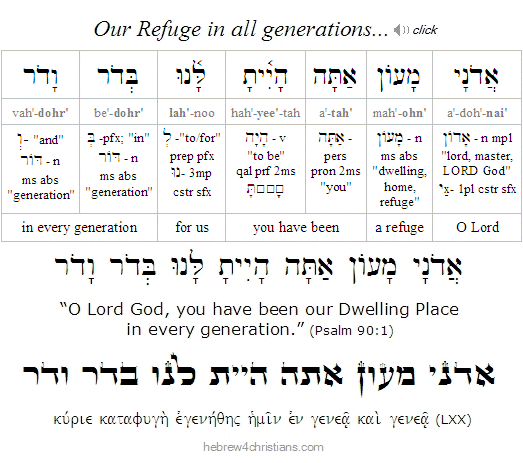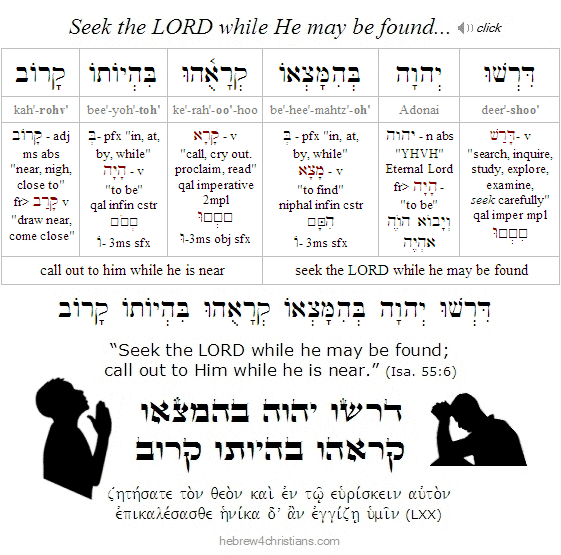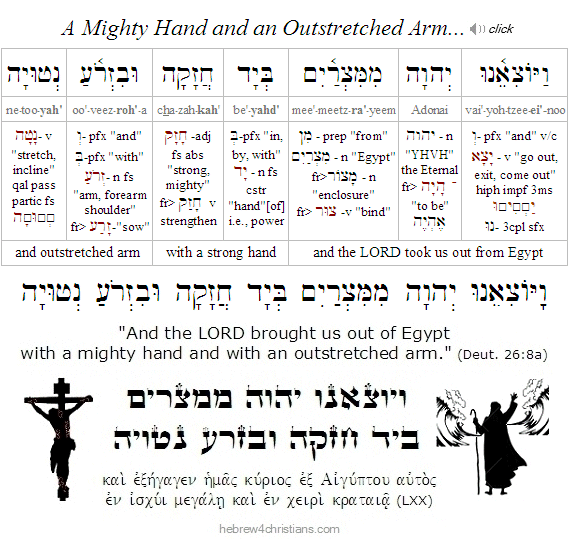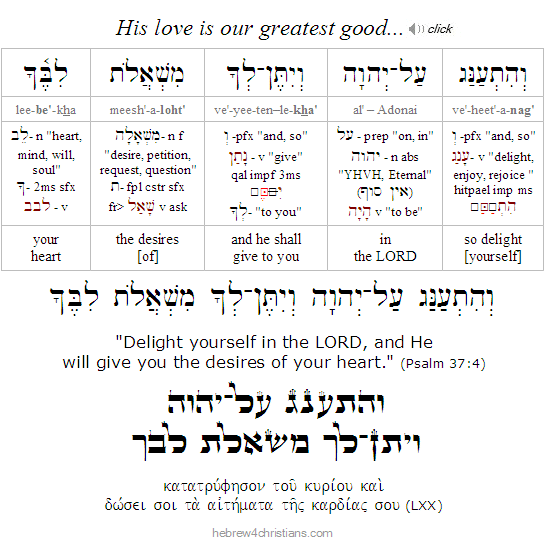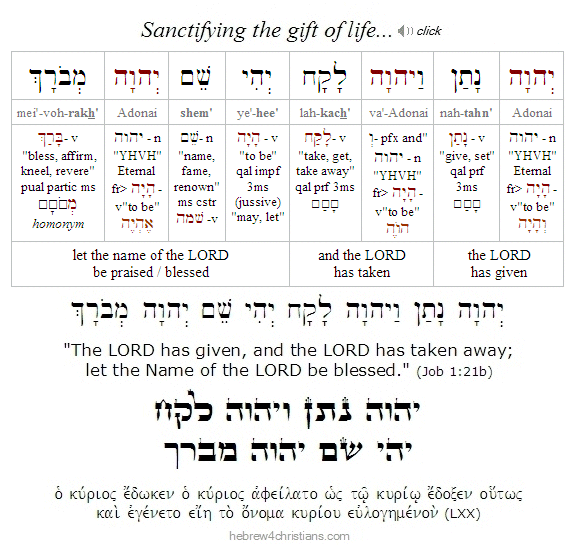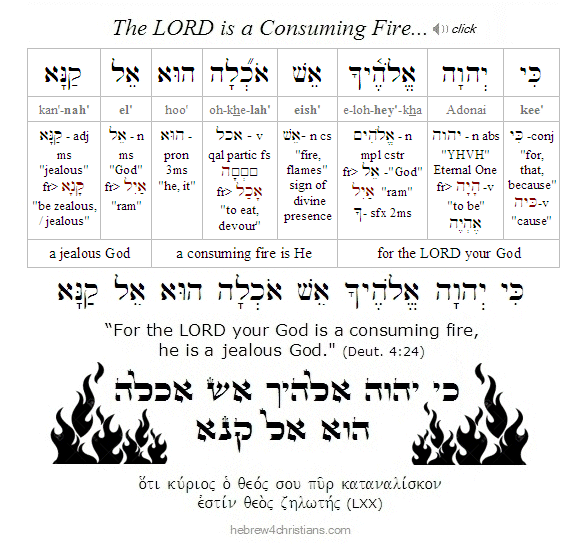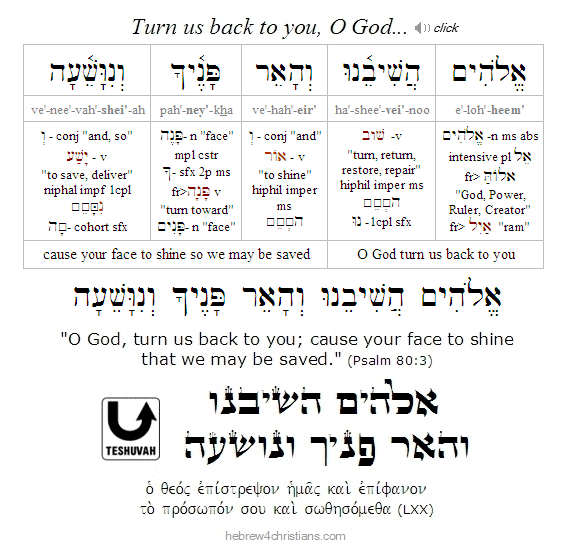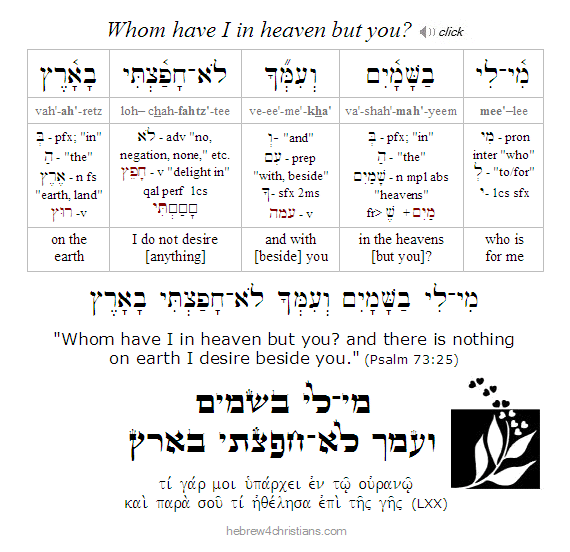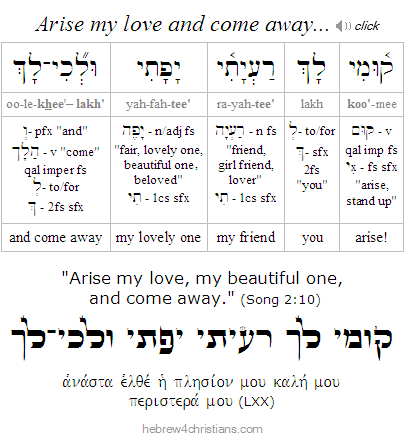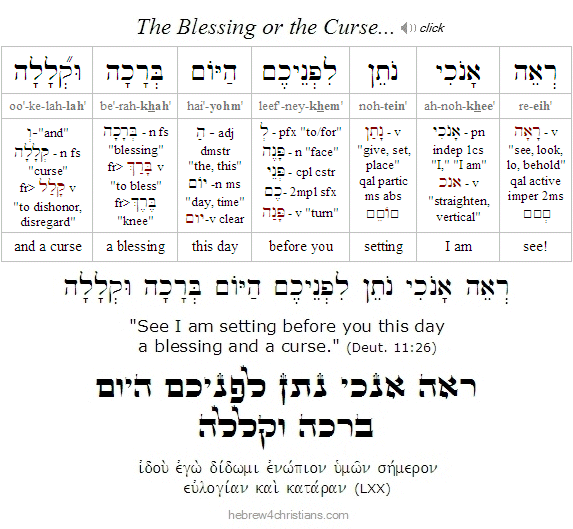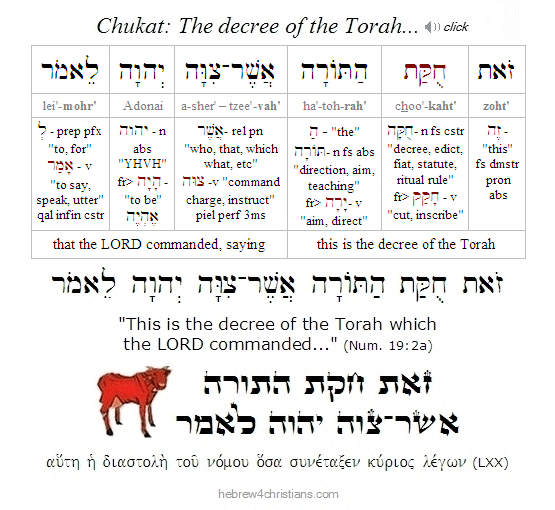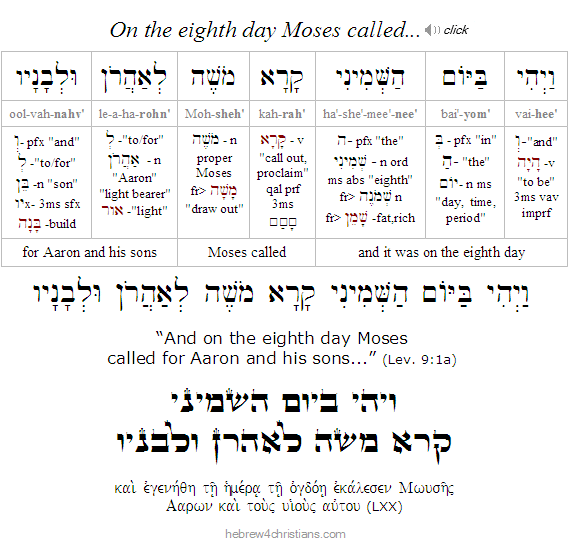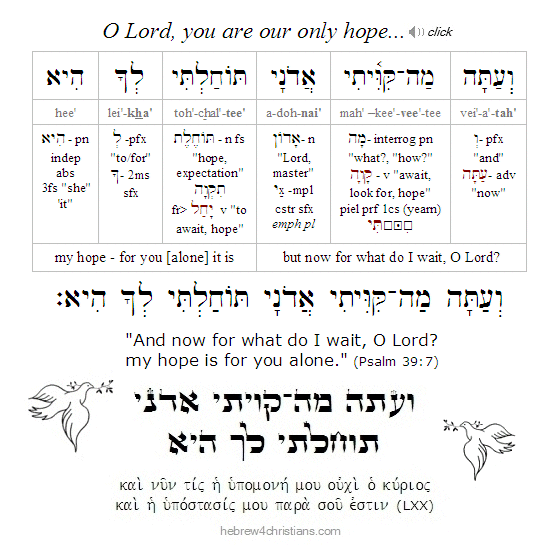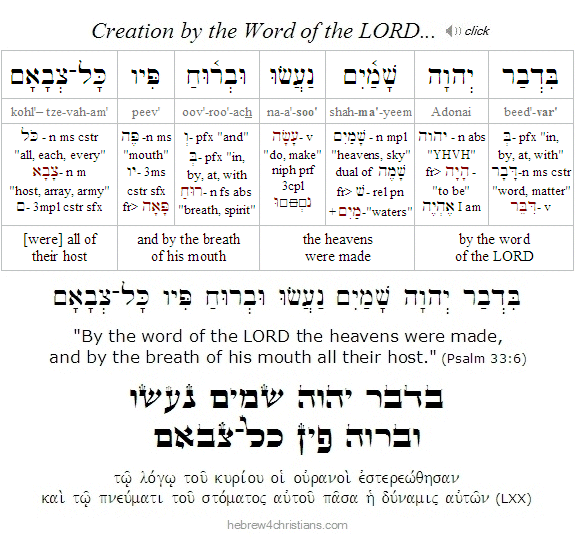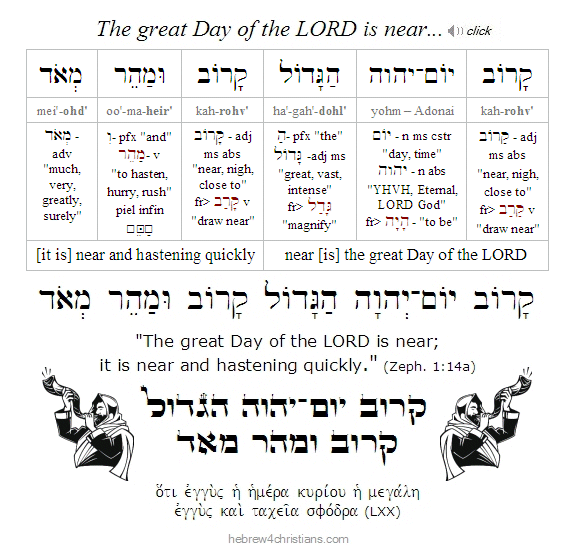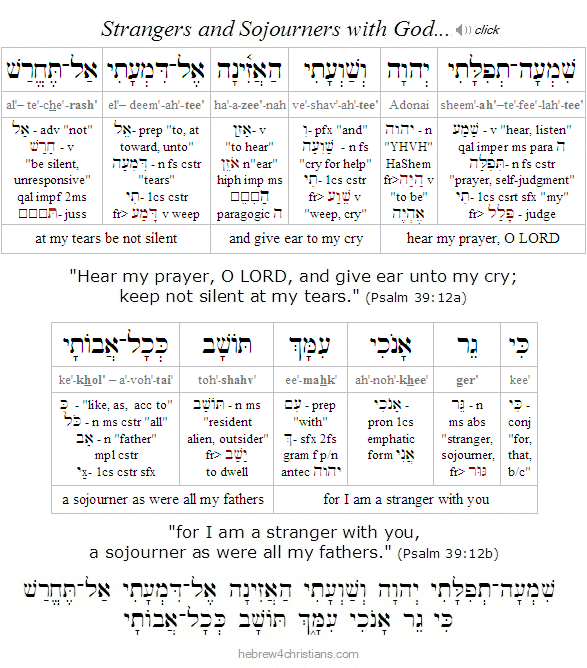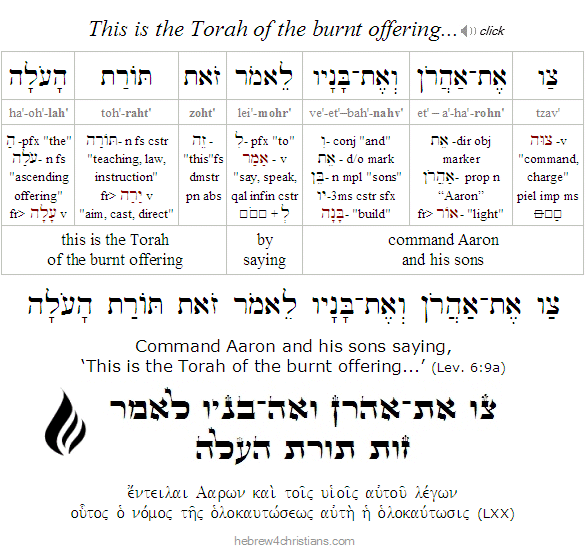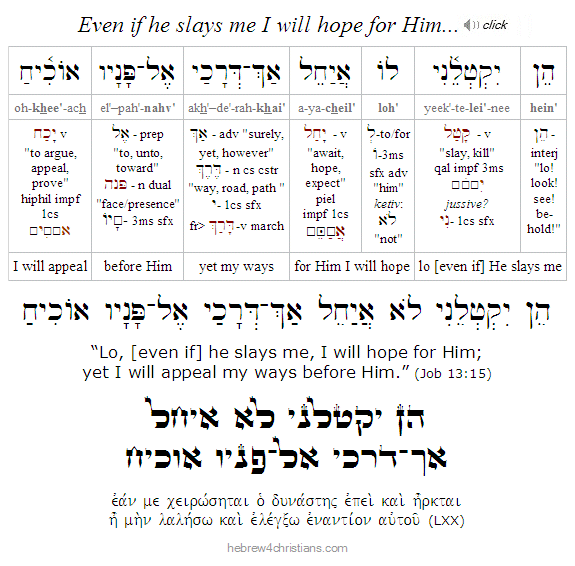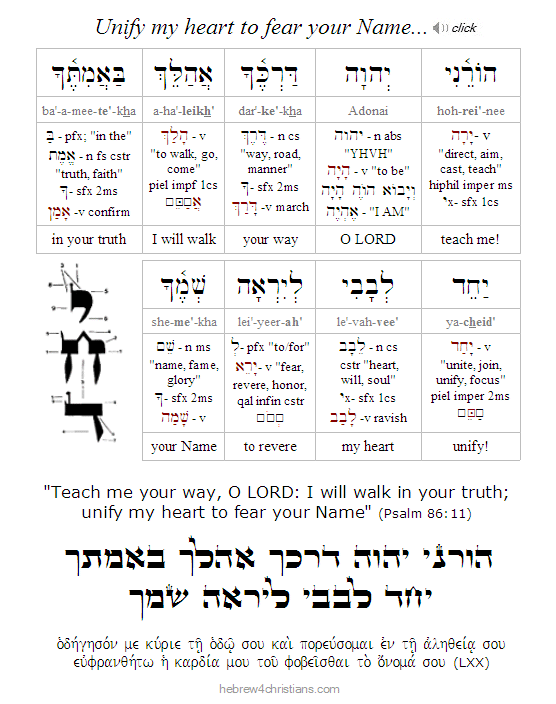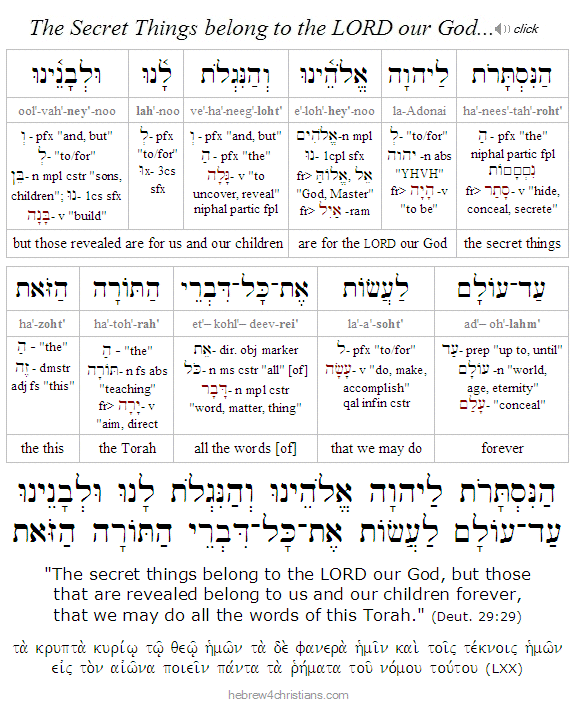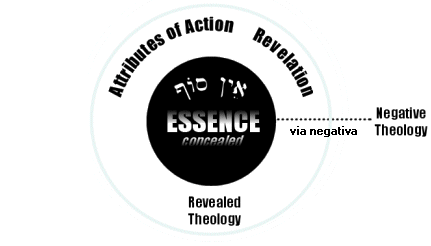|
Jewish Holiday Calendar
For March 2022 site updates, please scroll past this entry....
The winter holidays (חגי החורף) remember special times when God acted on behalf of His people so that they would triumph over their enemies, and therefore they prophetically picture the final victory in the world to come.
The Winter Holidays:
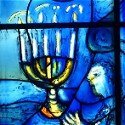
Note that in accordance with tradition, the following holiday dates begin at sundown:
- Month of Tevet (Fri., Dec. 3rd [eve] - Sun. Jan. 2nd [day])
- Month of Shevat (Sun. Jan. 2nd [eve] - Mon. Jan. 31st [day])
- Month of Adar I (Mon. Jan. 31st [eve]) - Wed. March 2nd [day])
- Month of Adar II (Wed. March 2nd [eve]) - Fri. April 1st [day])
 |
 |
Note: Some calendars will list the first day of a holiday without indicating that the holiday actually begins sundown the night before. For more information see the Calendar pages...
March 2022 Updates
Note: If any page content appears to be missing, please refresh the page...
Faith Establishes the Law...
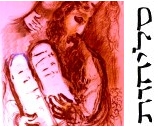
03.31.22 (II Adar 28 5782) We read in the New Testament: "Do we then make void (i.e., καταργέω, "idle," "deactivate") the law of God through faith? Certainly not! On the contrary, we establish (i.e., ἵστημι, "make stand," "uphold") the law" (Rom. 3:31). How so? We establish the truth of law on the basis of our faith in God's righteousness, not our own. Unlike those who attempt to establish their own righteousness by means of "keeping the law," we confess our inability to do so and throw ourselves upon the gracious provision God supplies for our atonement at the cross. The law teaches us our need for the sacrificial Savior. We are not saved by keeping the law, but that does not mean that we should disregard the truth of the law, nor fail to appreciate the One who kept the law on our behalf -- and then bore its verdict for our sin in his sacrificial death (Gal. 3:13).
Yeshua told us that He did not come to abolish the law, but to express its goal: "Do not think that I came to destroy the Law or the Prophets. I did not come to destroy but to fulfill. For assuredly, I say to you, till heaven and earth pass away, one jot or one tittle will by no means pass from the law till all is fulfilled. Whoever therefore breaks one of the least of these commandments, and teaches men so, shall be called least in the kingdom of heaven; but whoever does and teaches them, he shall be called great in the kingdom of heaven. For I say to you, that unless your righteousness exceeds the righteousness of the scribes and Pharisees, you will by no means enter the kingdom of heaven" (Matt. 5:17-20). Heaven and earth have not yet passed away and therefore the Torah has its voice in our lives.
Again, we do not attain "righteousness" by means of the law but by trusting in the righteousness of God given to us by faith in Yeshua our Savior. Indeed only those who believe in Yeshua fully uphold the truth of the Torah and affirm the need for sacrificial atonement for sin (see Lev. 17:11); they do not deny the verdict of the law nor explain away the need for sacrificial blood atonement as the rabbis do (Deut. 27:9-28:68).
The meaning of the cross is understood in light of judgments of the law - and God's passion to deliver us from spiritual death - for God's truth and mercy are reconciled only there (Psalm 85:10; 89:14). There is no need for the cross apart from the law, and there is no help for the law apart from God's mercy. "If you love me," says Yeshua, "keep my commandments." The love of God is the fulfillment of the law (Rom. 13:8-10; Gal. 5:14; James 2:8). Blessed are those that love the law of the LORD and meditate upon its truth (Psalm 1:1-3).
Hebrew Lesson:
Psalm 119:97 reading (click):
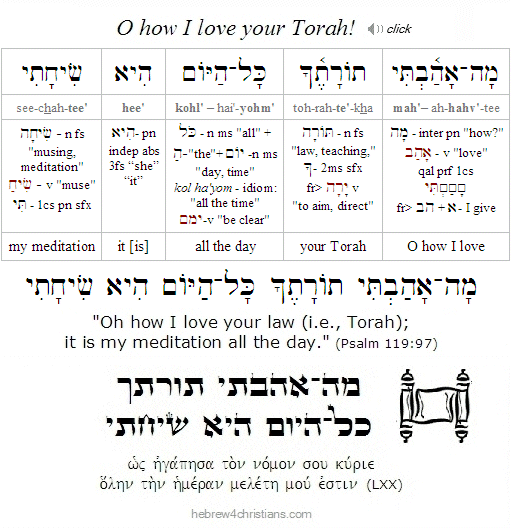 |
Seeing Him who is Invisible...
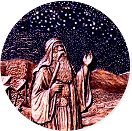
[ "We know that if God should put to the test our faithfulness to him, we know well that at the moment of testing, he himself must hold on to us, that is, we know that at bottom we are unfaithful, and that every instant it is he who at bottom holds us." - Kierkegaard ]
03.31.22 (II Adar 28 5782) "But you, when you pray, go into your room, and when you have shut your door, pray to your Father who is in the secret place; and your Father who sees in secret will reward you openly" (Matt. 6:6). Yeshua was not impressed with outward shows of spirituality or religion (Matt. 15:8). The rabbis called for public displays of repetitive prayers, but Yeshua taught that true prayer is a matter of intimate passion within the heart, and that the most powerful intercessions were made with ruach ha'koshesh - "groanings that cannot be uttered"(Rom. 8:26).
Instead of reciting prayers for the sake of ceremony or man's approval, he instructed us to pray "secretly" to our Father who "sees in secret" (ὁ βλέπων ἐν τῷ κρυπτῷ). Indeed, Yeshua taught that the LORD is "τῷ ἐν τῷ κρυπτῷ," the one who is in the "secret place," that is, hidden from outward forms, and that is why he himself came in disguise (Isa. 53:2). Since there is no merit in begging God for help, the Father rewards those who pray in their brokenness and poverty of heart, and his reward is revealed divine grace expressed openly - "ἐν τῷ φανερῷ" - unhidden to heart of faith (Deut. 29:29; Dan. 2:22). "He who dwells in the secret place of the Most High Shall abide under the shadow of the Almighty" (Psalm 91:1).
Ἐν τῷ κρυπτῷ - God both is, and sees, "in secret." He is in secret because he dwells in unapproachable light, whom no one has ever seen or can see" (1 Tim. 6:16), and yet he calls us to believe in the light, to walk in the light, and to be children of light (John 12:36; 1 John 1:7). We see the light in the teaching of Yeshua, by means of the Holy Spirit, though we see through a glass darkly, by analogy and riddle (1 Cor. 13:12). Some things are clear to us in this life, but much awaits to be revealed (1 John 3:2). "I have many more things to say to you, but you cannot bear them now" (John 16:12), though the Holy Spirit will give enough illumination for us to know the truth that sets our hearts free (John 16:13). "The secret of the LORD is for those who fear him, and he will show them his covenant" (Psalm 25:14).
But why does God hide this way? And why does he attend to that which is hidden or concealed (Heb. 4:13). The eye of faith sees the "invisible" things, the unseen blessing that lies behind the phenomenal realm of existence (Heb. 11:27). As Blaise Pascal said, "there is enough light for those who want to believe, and enough shadows to blind those who don't." In this present world, God "hides" so that people may seek him, for once he openly reveals his Presence, there is no longer the issue of faith (Rom. 8:24).
This is part of the "mysteries of the kingdom" (τὰ μυστήρια τῆς βασιλείας), after all (Matt. 13:10-15) which presents a "two-tiered" reality, the heavenly realm of God's Presence, and the earthly realm of transience. Upon reflection we may sometimes feel lonely and bewildered in this duality, not knowing how to "mediate" or bring together the opposite poles of our experience... On the one hand life in this present world is fading away, and finitude, dissolution, and the "dust of death" seem omnipresent to our physical senses, nevertheless our hearts yearn for eternity, for unending life, and God's presence and the manifestation of everlasting significance. We long for meaning, wonder, greatness, and the peace of unconditional love, yet we find ourselves trapped within a diseased and moribund world that is filled with thwarted dreams, painful losses, harrowing vexations, and death... We hunger and thirst for real life, for salvation from our misery, but the cosmological visions of mechanistic science reveal an immense emptiness that has no goal or end, no explanation for its existence, and therefore no meaning or real hope.
God hides so that we will seek him (Jer. 29:13). This seeking involves all our heart, since we will not seek God until we understand the inner crisis. It is not enough to know right words of theology, since we must learn to think the right way, and this comes at the cost of struggle, wrestling, and testing. We cannot rely on reason alone to guide us, for that relegates beauty, mystery, and hope into oblivion; nor can we dismiss reason, for then faith becomes absurd and ridiculous. We must find a delicate balance: "faith seeking understanding," knowing when it is right to question, to doubt, and to analyze, and when it is right to affirm, to submit, and to surrender. Reason is a servant of something more fundamental, namely the heart or the will; it is activated at the stir of the soul's desire.
Hebrew Lesson
Jer. 29:13 reading (click):
The dualism of life shows up within our hearts as well, as we wrestle with our own faith and with "double-mindedness," that is, the ambivalence that results from not having our minds made up. On the one hand, we need to confess the truth of our radical sinfulness, our depravity, our brokenness, and so on, while on the other we must learn to know ourselves as the "beloved" and to find faith that God's blessing indeed belongs to us -- that Yeshua gave his life for us -- despite ourselves. We have to be willing to take God's new name for us and believe that God has transformed our deepest nature for eternal good. We have to be renamed from "Jacob" to "Israel," and yet we know ourselves as both... In other words, we must learn to "put on" the new nature and to "put off" the carnal reasoning of our former life. The answer for us is found in the word "miracle," as God in great mercy and compassion regenerates us, comforts us, and then guides our way back to the truth of his salvation.
Hebrew Lesson
Psalm 25:14 reading (click):
Leprosy of Ingratitude...

[ The following is related to our Torah reading this week, parashat Tazria... ]
03.30.22 (II Adar 27 5782) Tazria, or "leprosy," is a spiritual sickness brought about by sinful thinking and faithlessness... In this connection Kierkegaard notes: "The gospel about the Ten Lepers (Luke 17:11-19) is about how the nine were healed of their leprosy – and then caught, so to speak, an even worse leprosy: their ingratitude and unthankfulness. Herein lies the difference between sickness of the body and sickness of the spirit." Ten metzorot (lepers) were healed in body, but only one was healed both in body and soul -- the "stranger" who recognized God's kindness and who made an effort to offer his thanks...
Hebrew Lesson:
Psalm 41:4 reading (click):
The Time is Now...

03.29.22 (II Adar 26 5782) The sages advise: "Repent one day before you die" (Mishna Avot 2:15b). But who knows the day of one's death in advance? Therefore live each day as if it were to be your last, and may God help you make the wholehearted decision to "seek the LORD while He may be found; call out to Him while He is near" (Isa. 55:6). Amen. But many people live in a state of hesitation and uncertainty... The Spirit asks: "How long will you go limping between two different opinions?" (1 Kings 18:21).
This question is meant for us to hear today. We are being called to make up our minds and turn (shuv) to the LORD. After all, what is more important to you than your relationship with God? Is there anything more important than this? As C.S. Lewis once said, "Christianity, if false, is of no importance and, if true, is of infinite importance. The one thing it cannot be is moderately important" (God in the Dock). "For he is our God, and we are the people of his pasture and the sheep of his hand today -- if you hear his voice" (Psalm 95:7). Today, if you hear his voice, do not harden your heart (Heb. 3:15). "Take care, brothers, lest there be in any of you an evil, unbelieving heart, leading you to fall away from the living God, but encourage one another every day, as long as it is called "today," so that none of you may be hardened by the deceitfulness of sin" (Heb. 3:12-13). Wake up! The time is now...
Hebrew Lesson:
Psalm 95:7-8 reading (click):
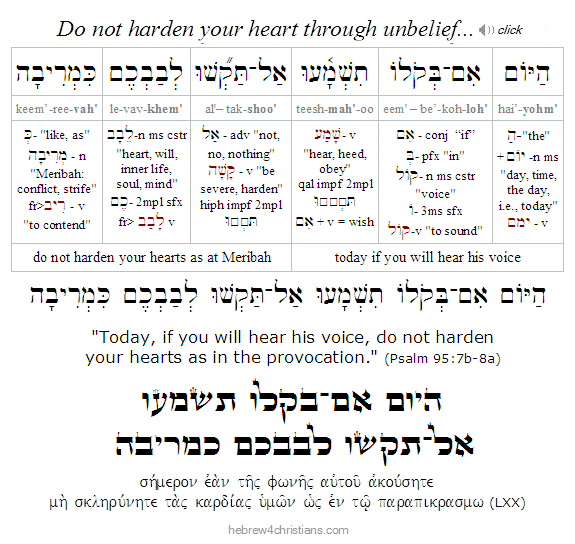 |
The Friend of Sinners...
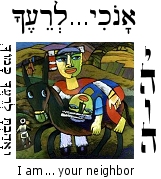
[ "God be praised that it is not because of my worthiness that God loves me. Otherwise, I might at any moment die of fear lest the next moment I cease to be worthy." - SK ]
03.29.22 (II Adar 26 5782) "The Son of Man came ... and they say, 'Look at him! A glutton and a drunkard, a friend of tax collectors and sinners!'" (Matt. 11:19). People, especially the religious people, were scandalized by Yeshua because he was a "friend of tax collectors and sinners!" Yet what sickness of heart is this, to despise those who are sick? It is a sorrow of heart to realize that religion often creates an "in-group" mentality that attains its status at the expense of the "outsider," the "stranger," the "sinner," and so on... The prayer of the self-righteous is always: 'God, I thank you that I am not like other people: extortionists, unrighteous people, adulterers – or even like this tax collector" (Luke 18:11).
The religious leaders of Yeshua's day were offended because he "welcomed sinners" and enjoyed eating meals with them (Luke 15:2). We can almost hear their disapproving whispers and their dismissive accusations: "How could a good Jew behave like this? Does he not understand the call to personal holiness? Does he not know the Torah of "clean" and "unclean"? If a man is known by the company he keeps, we know enough about Yeshua to know that he's not truly pious..." And to this very day the self-righteous find offensive the idea that God welcomes the sinful, the needy, the broken, the despised, and the "outsider" into His presence... As Yeshua said, "those who are well have no need of a physician," and indeed offering them God's cure will always be regarded as a kind of poison...
We greatly rejoice that God indeed is the friend of sinners; He is the Good Shepherd who seeks and saves the lost. Thank the Lord that he comes not for the "righteous" but for those who are brokenhearted, for those mortally wounded by their own sin... Any so-called theology or religion that repudiates or minimizes God's love for the sinful, the needy, the broken, is little more than a shrine to human pride and vanity... On the contrary: the heart of the Compassionate One always welcomes a sinner who sincerely turns to Him.
Hebrew Lesson:
Psalm 23:3 reading (click):
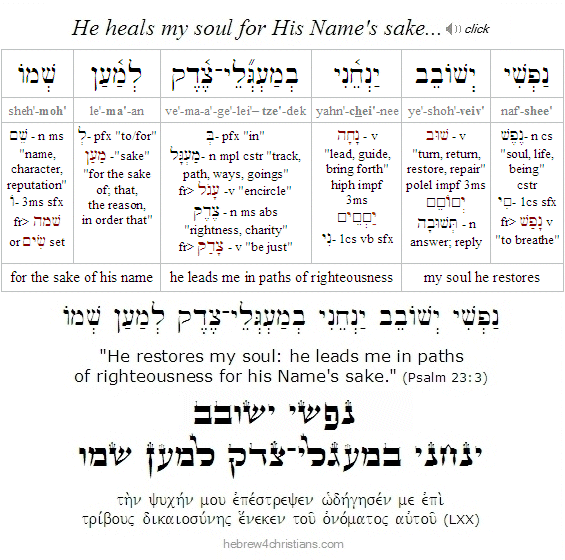 |
Watching your Tongue...

[ The following is related to our Torah reading this week, parashat Tazria.... ]
03.29.22 (II Adar 26 5782) According to the sages, tzara'at ("leprosy") was a punishment for evil speech, or "lashon hara" (לָשׁוֹן הָרָה). In midrashic literature, lashon hara is regarded as equal to idol worship, sexual immorality, and murder, and the one who indulges in it defiles his mouth so that even words of Torah and prayer are corrupted. "From the same mouth come blessing and cursing; brothers, these things ought not to be so" (James 3:10).
The sages even go further: "Lashon Hara is worse than murder. One who murders, murders but one; however, one who speaks lashon hara kills three: the one who speaks it, the one who hears it, and the one of whom it is spoken." Lashon hara is likened to "emotional homicide" caused by publicly shaming another. According to the Talmud, the shamed person's face is drained of blood and turns white, and therefore humiliation is called "whitening the face" (i.e., halbanat panim: הלבנת הפנים). Therefore the sages identify the metzora (i.e., leper) with hamotzi ra, "one who brings forth evil," and they stress shemirat ha-lashon, the "guarding of the tongue," as a cardinal virtue of the righteous.
"Suffering is a sign that you're out of touch with the truth. Suffering is given to you that you might open your eyes to the truth, that you might understand that there's falsehood somewhere, just as physical pain is given to you so you will understand that there is disease or illness somewhere. Suffering points out that there is falsehood somewhere. Suffering occurs when you clash with reality. When your illusions clash with reality when your falsehoods clash with the truth, then you have suffering. Otherwise there is no suffering." - De Mello: Awareness, 1992
Those who think it easy to control the tongue have likely never really tried to do so. "The tongue is a small member, yet it boasts of great things. How great a forest is set ablaze by such a small fire! And the tongue is a fire, a world of unrighteousness. The tongue is set among our members, staining the whole body, setting on fire the entire course of life, and set on fire by hell" (James 3:5-6). Ultimately, controlling your tongue (i.e., shemirat ha'lashon: שְׁמִירַת הַלָּשׁוֹן) is a matter of controlling your inner thoughts, your heart, and your attitude (shemirat ha-lev). Therefore we are admonished to be "quick to hear, slow to speak, slow to anger," since the anger of man never works the righteousness of God (James 1:19). May the LORD our God help us always to speak with grace, "seasoned with salt" (Col. 4:6); and may we all "speak the truth in love to grow up in every way" (Eph. 4:15).
Hebrew Lesson
Prov. 18:21 reading with comments (click):
Affliction and Teshuvah...

[ The following is related to our Torah reading this week, parashat Tazria... ]
03.29.22 (II Adar 26 5782) In one of his comments on tzara'at (often mistranslated as "leprosy"), the French medieval commentator Shlomo Yitzhaki, or "Rashi," says that affliction comes from haughtiness, and to be healed requires teshuvah (repentance). However, there is no genuine teshuvah until a person truly understands the greatness of God. After all, a person can be humbled from a broken heart, from serious illness, from poverty, and so on, but were these conditions different there may be a return to haughtiness, as we see in the case of Pharaoh. True humility is unconditioned and is based on the recognition and acceptance of the magnificence and glory of God. Yes, there is godly sorrow that leads to repentance, but ultimately repentance resolves upon the goodness and greatness of God, and without keeping that greater end in view, there is little practical difference between repentance and regret, despair, and shame. May the awe of the LORD be upon us...
Hebrew Lesson
Psalm 67:1 reading (click):
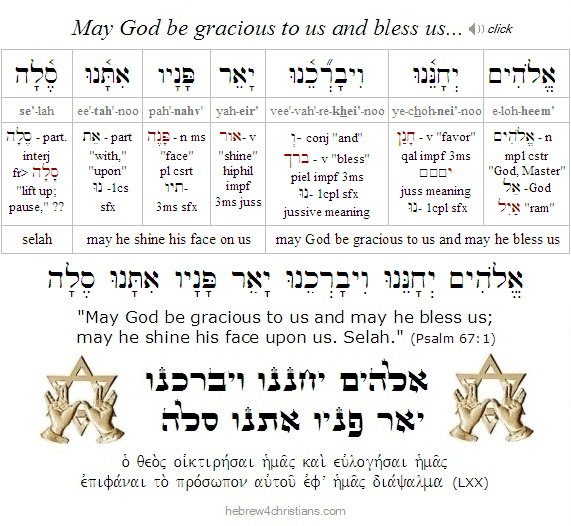 |
Is Passover for Today?

03.28.22 (II Adar 25 5782) Some well-meaning Christians think that followers of Yeshua have no reason to do a Passover seder as instructed in the Torah because, in light of the new covenant, all that is now needed is to remember Jesus' crucifixion for our sins and to celebrate his resurrection by partaking in the sacraments. This viewpoint assumes that, despite the instructions in the Torah, the yearly Passover service, or seder, is not intended for Christians, since it focuses on the Exodus from Egypt and the Jewish people, and the message of the gospel is universal, for every "tongue and tribe." Moreover Christians are no longer "under the law" and therefore are not obligated to keep the various ordinances of the "Old Testament," especially with regard its ceremonial laws.
There are some real difficulties when we disregard the Torah's instructions to observe the Passover, however, particularly because Yeshua himself identified his entire ministry as the "Lamb of God" who redeems us from the curse of the law, and he used the message of the Passover to teach his followers this truth. Bear in mind that the idea of the Passover was not enacted at Sinai as part of the Sinai covenant, but predates the giving of the law. In other words, the faithful of Israel obeyed God's instruction to take refuge under the blood of the sacrificed lamb to escape the plague of death delivered upon Egypt, but this was done before Moses ascended Sinai to receive and ratify the covenant of the law.
Indeed the theme and message of Passover is timeless for understanding the Bible. The message was delivered in the Garden of Eden when God sacrificed a lamb to cover the shame of Adam and Eve (Gen. 3:21); it was prefigured in the lamb that was sacrificed by Abraham in place of Isaac during the Akedah; it was portrayed in the blood of lamb sacrificed in Egypt whose blood was daubed upon the doorposts; it was memorialized every day and night at the Tabernacle (and later at the Temple) as "continual korban," the offering of which was central to the sacrificial ministrations for Israel; it was foretold by the Hebrew prophets (Isa. 9:6; Isa. 53; Psalm 22:16; Prov. 30:4; Zech. 12:10. etc.), and it was fully manifested in the incarnation, mission, and sacrifice of God's beloved Son himself, the promised heir to come who allowed himself to be "caught in the thicket" for our sins, and who was bound upon the altar of the cross to shed his blood for our redemption. This was the central meaning of the "greater exodus" that Yeshua discussed with Moses and Elijah on the mount of transfiguration before his crucifixion (see Luke 9:29-31). Amen, Yeshua as our sacrificial Lamb is heart of the gospel message itself (John 1:29; 1 Pet. 1:19; Isa. 53:3-12); it's the "scarlet thread" he showed his followers (Luke 24:27); it's the Metaphor God chose to make his sacrificial love known to us.
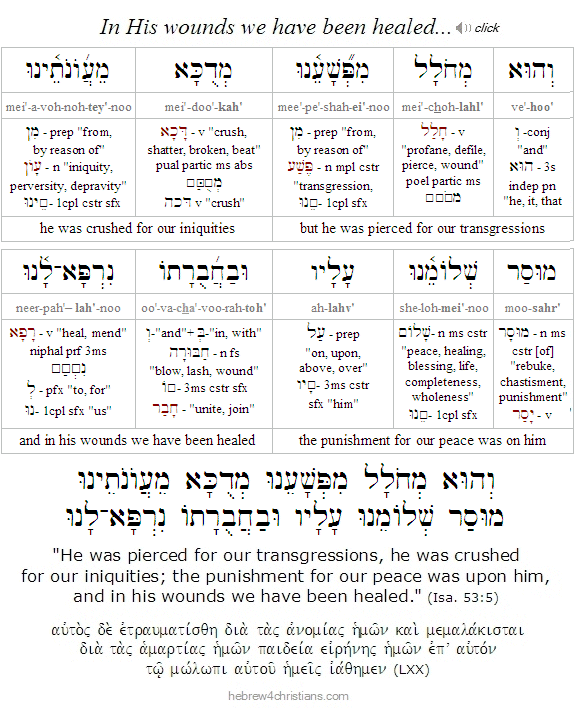 |
The image of "Christ our Passover Lamb" (המשיח פסח שלנו) will extend forever and unto eternity itself, when the Lamb of God is fully glorified and enthroned, as it says: "For the Lamb on the throne will be their Shepherd. He will lead them to springs of life-giving water. And God will wipe every tear from their eyes" (Rev. 7:17). "And the city has no need of sun or moon, for the glory of God illuminates the city, and the Lamb is its light" (Rev. 21:23).
The meaning and substance of Passover, then, is essential to the life of the Christian, and to dismiss its significance is to risk missing the point of God's redemption and salvation itself. The Apostle Paul used "Passover language" to describe our new life in Messiah by admonishing us to: "purge out the old leaven, that you may be a new lump, since you truly are unleavened. For indeed Christ, our Passover, was sacrificed for us. Therefore let us keep the feast, not with old leaven, nor with the leaven of malice and wickedness, but with the unleavened bread of sincerity and truth" (1 Cor. 5:7-8).
The LORD did not waste his breath by revealing the Torah to Israel, nor did he speak out of two sides of his mouth when he instructed them to keep the Passover holiday every year (Num. 9:2,14; Lev. 23:5; Deut. 16:1). Remember - Jesus was the Voice of God speaking to Israel at Sinai; Jesus was Moses' Teacher regarding the seven holidays of the Torah! He said "Do not think that I came to destroy the Law or the Prophets. I did not come to destroy but to fulfill. For assuredly, I say to you, till heaven and earth pass away, one jot or one tittle will by no means pass from the law till all is fulfilled. Whoever therefore breaks one of the least of these commandments, and teaches men so, shall be called least in the kingdom of heaven; but whoever does and teaches them, he shall be called great in the kingdom of heaven" (Matt. 5:17-19). Heaven and earth has not yet passed away, and therefore the Torah has its voice and place in the life of follower of Yeshua. Faith does not mean we are devoid of law of God, even if the verdict of the law reveals our sin. As the Apostle Paul said, "Do we then make void the law through faith? Certainly not! On the contrary, we establish the law" (Rom. 3:31). We are justified by trusting in the righteousness of God in the sacrifice of Yeshua, but that does not mean we disregard God's law so that "grace may abound" (Rom. 6:1-2)
So you see that the question of whether Christians should seriously engage the Passover turns on how they read the Scriptures, and in particular, how they esteem the words of the Torah. If they tend to read the Bible out of context, by focusing on the New Testament without taking time to carefully consider the context given in the Hebrew Scriptures, they likely will dismiss the significance of the Passover seder and will think of it in theologically abstract terms, as an analogy or metaphor foretelling what Yeshua has done, and that it is now best remembered during communion rituals, rather than as an invitation to participate in the annual retelling of the great story of redemption that is the heritage of the people of God. But Yeshua himself observed the Passover with his disciples, and indeed his last Passover before his crucifixion represented his most intimate heart to us. We miss a lot if we minimize the significance of the Passover or regard it as somehow incidental to our life as believers in the great Lamb of God. Chaverim -- let us keep the feast! Shalom lekha.
 |
 |
Idols of the Mind...
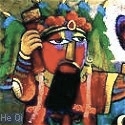
03.28.22 (II Adar 25 5782) We all have a tendency to make God into our own image and likeness; we all think of God in our own terms. "You shall not make molten gods for yourselves" (Exod. 34:17) means that we should not have an overly rigid theology, since that makes God into an idol of our own thinking.
Hebrew Lesson
Psalm 50:21b reading (click):
Getting Ready for Passover...
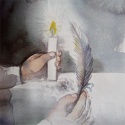
03.27.22 (II Adar 24 5782) Preparing for Passover usually begins a full month before the holiday arrives, just after the festival of Purim (or at the latest around the time of the New Year of spring, i.e., Nisan 1). Since no leavened bread may be eaten during all seven days of Passover, we make a special effort to remove leaven entirely from our homes, in obedience to the Torah's command (see Exod. 12:15). Spiritually understood, we remove leaven (called "chametz") to symbolize that we are making a radical break from the past by becoming a new "substance," as Paul instructed: "Cleanse out the old leaven that you may be a new lump, as you really are unleavened: for Messiah our Passover Lamb has been sacrificed for us. Let us therefore celebrate the festival, not with the old leaven, the leaven of malice and evil, but with the unleavened bread of sincerity and truth" (1 Cor. 5:7-8). Note that the Greek text uses an imperative verb here (ἐκκαθάρατε): "You cleanse out (i.e., purge, as in catharsis) the old leaven so that you become a new lump (ἵνα ἦτε νέον φύραμα)" since you have been made new because of what Messiah has done for you." This is a matter of faith, friends, as you "become who you are" by trusting in the Salvation of the God of Israel.
 |
"A little leaven leavens the whole lump..." Chametz (i.e., leaven) is considered a corrupting influence, a hidden uncleanness that manipulates purer elements. Like the influence of a lump of leaven in a batch of dough, "spiritual" leaven functions as an evil impulse within us (i.e., yetzer ha'ra: יֵצֶר הַרָע) that corrupts and "sours" our soul. You cannot include a little sin in your life without it affecting your whole spiritual life. This "yeast in the soul" is essentially pride that manifests itself in idolatrous desires and lusts (the "puffed up" rise of the flesh in opposition to God). A practical way to observe the commandment to purge out the old leaven is not only to physically remove leaven from your home, but to look within you heart to see what corrupts and enslaves you in the physical, emotional, and intellectual realms of your life. Are you addicted to pleasure? power? approval from others? Are you enslaved to pride or fear? What holds your attention? What moves your behavior? This is part of the "search for chametz" in your life. Take a few moments to write down all the things that have enslaved you and then tear the list into small pieces. Before Passover arrives, take the torn pieces and burn them in a fire, symbolizing the end of your former life and the making of all things new. "Therefore if any person is in Messiah, he is a new creation: old things are passed away; behold, all things become new" (2 Cor. 5:17).
Hebrew Lesson
Exod. 12:19a reading (click):
Related Topics:
Audio Discussions:
Hebrew Lesson
Deut. 16:3b reading (click):
The Biblical New Year (ראשׁ חֳדָשִׁים)
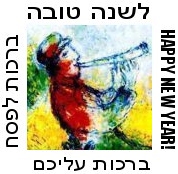
03.27.22 (II Adar 24 5782) The Biblical New Year begins Friday, April 1st at sundown this year, or Nisan 1 on the Torah's calendar.. The LORD set apart Nisan 1 as the "head of the months" of the calendar, called "Rosh Chodashim," which begins the calendar year itself (see Exod. 12:1-2). This may seem a bit odd to you since most people regard January 1st as "New Year's Day," though remember that the world runs on a "clock" that operates under assumptions that are different than those revealed in the Scriptures.... The "wisdom of this world" (σοφία τοῦ κόσμου τούτου) is the prevailing cultural spirit that suppresses the reality of God's Presence and truth. Such "wisdom" is regarded as foolishness before God, and God has promised to "seize the so-called wise in their own craftiness" (1 Cor. 3:19). The life of faith, on the other hand, sees what is invisible. Faith apprehends "the substance (ὑπόστασις) of things hoped for, the assurance (ἔλεγχος, conviction, "correction," i.e., tokhachat: תוֹכַחַת) of things not seen" (Heb 11:1). As the Scripture says, the heart of faith "looks not to the things that are seen but to the things that are unseen. For the things that are seen are transient, but the things that are unseen are eternal" (2 Cor. 4:18).
Two Weeks until Passover!
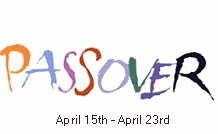
The Sabbath that immediately precedes (and sometimes falls on) the Biblical New Year is called Shabbat HaChodesh (שַׁבַּת הַקּדֶשׁ), the "Sabbath of the Month" (of Nisan). This Sabbath is significant because it commemorates the start of the "Month of Redemption" (chodesh yeshuah) in commemoration of the Passover deliverance. We remember this special event by reading an additional passage from the Torah (i.e., maftir) concerning the sanctification of the new moon (Exod. 12:1-20), and we spiritually prepare for this month by studying about Passover and the coming spring holidays.
The commandment to sanctify the first new moon of the year (i.e., Rosh Chodashim) reveals that it is our responsibility to sanctify (i.e., observe) Biblical time in general. In other words, when we observe "the beginning of months," we are acknowledging that time itself is rooted in the Biblical calendar with its divinely inspired cycle of festivals (see Psalm 104:19).
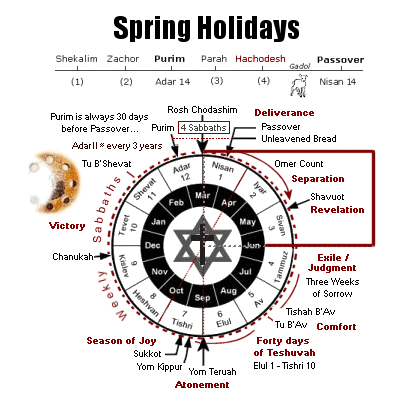 |
Originally Rosh Chodashim was simply called the "first month" because it marked the month of the Exodus and the other months were named in relation to it, similar to the days of the week in the Hebrew calendar (i.e., the first day [until Shabbat], the second day...). Later it was called Chodesh Ha-Aviv (חדֶשׁ הָאָבִיב) - "the springtime month" (because the calendar is reset in the spring) and later still as Nisan (נִיסָן), to recall God's faithfulness after the Babylonian Exile (Neh. 2:1; Esther 3:7). So important is this month that Rabbi Moshe ben Nachman (Ramban) wrote regarding the commandment to observe Rosh Chodashim:
"The verses (Exod. 12:1-2) mean that this month should be counted first, and beginning with it, the count should proceed to the second, the third, and so on, till the end of the sequence with the twelfth month. In this way, this month should be a commemoration of the Great Miracle (i.e., our Redemption), and every time we mention the months, the Miracle will be alluded to. It is for that reason that the months do not have names in the Torah, but rather they are identified by number."
The word Nisan might come from either the word nitzan (נִצָּן), meaning "bud" (Song 2:12), or the word nissim (נִסִּים) meaning "miracles," both of which suggest physical and spiritual resurrection in our lives. Others think the word comes from the verb nus (נוּס), meaning "to flee," both in relation to Israel's flight from Egypt and Egypt's flight from Israel (i.e., when the pursuing Egyptian cavalry fled (נָסִים) before the sea closed upon them (Exod. 14:25, 27). We also see this usage in the verse: "The wicked flee (נָסוּ) when no one pursues, but the righteous are bold as a lion" (Prov. 28:1). The devil's power is found in the lie. If he can make you afraid, you will not think clearly. Establishing your faith in the truth will embolden you to deal with the lies and distortions that are intended to enslave you in fear. As Yeshua said, the truth will set you free (John 8:32).
Hebrew Lesson
Exod. 12:2 reading (click):
To a Good Year in Messiah!
Though the following prayer is customarily recited during Rosh Hashanah, it is equally applicable for the New Year of Nisan and the Season of Passover:
יְהִי רָצוֹן מִלְּפָנֶיךָ יהוה אֱלהֵינוּ
וֵאלהֵי אֲבוֹתֵינוּ
שֶׁתְּחַדֵּשׁ עָלֵינוּ שָׁנָה טוֹבָה וּמְתוּקָה
בַּאֲדנֵינוּ יֵשׁוּעַ הַמָּשִׁיחַ אמן
ye·hee · rah·tzohn · meel·fah·ney'·kha · Adonai · E·loh·hey'·noo
ve·loh·hei · a·voh·tey'·noo
she·te·cha·desh · ah·ley·noo · shah·nah · toh·vah · oo·me·too·kah
ba·a·doh·ney'·noo · Ye·shoo'·a · ha·mah·shee'·ach [ah·mein]

"May it be your will, LORD our God
and God of our fathers,
that you renew for us a good and sweet year
in our Lord Yeshua the Messiah." [Amen]

Download Study Card
This week's Torah:
Parashat Tazria - תזריע

03.27.22 (II Adar 24 5782) Our Torah reading for this week, parashat Tazria (תזריע), continues the discussion of the laws of "purity" and "impurity" that began earlier with parashat Tzav. A new mother is regarded as a niddah (a menstruent woman) and is considered "impure" (tamei) regarding the sanctuary for 40 days (if a boy) or 80 days (if a girl). On the eighth day of life a boy must be circumcised. After the mother's "period of impurity" had ended, she was required to bring a yearling sheep as a burnt offering and a dove for a sin offering (if she is poor, two doves sufficed for both offerings).
The portion next describes certain afflictions, collectively called tzara'at, that caused the affected person (or thing) to be both ritually impure (tamei) and in a state of uncleanness (tumah). Note that tzara'at is not to be identified with "leprosy" (as some English translations claim), since the symptoms of tzara'at included not just the afflicted person's skin, but sometimes his clothes, pottery vessels, and house.
When applied to people, tzara'at was a sort of a spiritual affliction (i.e., yisur: יסור) that could only be diagnosed by a kohen (priest), not a doctor. If white or pink patches appeared on a person's skin, the afflicted person was required to contact a kohen for an examination. If the priest detected 1) two hairs that had turned white within the spot, or 2) a piece of healthy skin in the middle of the spot, he was declared tamei (unclean), and then had to follow the prescribed laws for the metzora (person affected with tzara'at); otherwise he was declared tahor (clean). On the other hand, if the priest suspected tzara'at but was unsure, the afflicted person was quarantined and required to perform teshuvah (repentance). If a second evaluation indicated that the spot(s) had grown larger in size, the person was declared tamei and was subject to the laws for the metzora (i.e., dwelling "outside the camp" until the person was completely healed).
If someone was diagnosed with tzara'at, they were forced to leave the community and live in a state of exile. He had to tear his clothes like a mourner, put a shroud over his face (descending to his upper lip) and remain alone. If anyone came near, the metzora was required to cry out: "Unclean! Stay away! Do not become impure because of me!" (no one was permitted to come within eight feet of him). While so isolated, the person would have opportunity to perform teshuvah and seek spiritual "rebirth" (as described in the following Torah portion, parashat Metzora).
Our Refuge in all Generations...

03.25.22 (II Adar 22 5782) Don't let worry blind you to God's ongoing care; don't live as those without faith. You have a place in your Father's heart; you have a share in his house above. See the Lord as your Dwelling Place "in all generations"; behold his unchanging glory despite the fleeting shadows of this world.
We must first look to the Eternal to rightly see the finite; we must look upward before we look downward. As we contemplate God's Eternality and power, we realize the wonder and sanctity of our short time here. The Eternal is our refuge, our "dwelling place," in all generations, and that means in the present generation as well, on the other side of fleeting appearances of this world. When we pray to God as Avinu She-bashamayim, "Our Father in Heaven," we are calling to the One who (ש) is in the midst of the waters (מים) of Life.
The psalmist says (Psalm 118:17): "I shall not die but live." In order to live you must give yourself to death, but when you have done so, you discover that you are not to die, but live. "Giving yourself to death" means surrendering to God's will, accepting the yoke of heaven, and trusting in His governing "flow" over all of creation. This is the deeper meaning of "baptism" as we are immersed into God's care for us. Yeshua gives us abundant life.
The bloom of every flower is by eternal purpose, and not one common sparrow is forgotten by your Heavenly Father (Luke 12:6). God's irresistible providence comprehends and orders all things, from the realm of the subatomic to the cosmic motions of the heavenly bodies. The Lord is the Center of reality: "All things were created by Him, and for Him, and in Him all things hold together" (Col. 1:16-17). In light of this, Blaise Pascal asked, "What is left for us but to unite our will to that of God himself, to will in him, with him, and for him the thing that he has eternally willed in us and for us." In other words, what else can we do but learn to trust, accept, and to say "yes" to life – even if at times we may feel like strangers in exile... All our days are ordained; recorded in God's scroll. Therefore may God "teach us to number our days to get a heart of wisdom" (Psalm 90:12). So don't lose heart, friend; He who cares for you is a Good Shepherd, and you shall dwell in the house of the LORD forever.
Shabbat shalom and love to you all...
Hebrew Lesson
Psalm 90:1 reading (click):
Find God or Die...

03.25.22 (II Adar 22 5782) Those who evade the truth about reality – those who willingly suppress the truth and choose to ignore the ultimate existential pathos of the human condition – must "steal" meaning and a sense of value from the heart of faith. "If a human being did not have an eternal consciousness, if underlying everything there was only a wild, fermenting power that writhing in dark passions produced everything, be it significant or insignificant, if a vast, never-appeased emptiness hid beneath everything, what would life be but despair?" (Kierkegaard: Fear and Trembling). The hidden source of anxiety is to be lost in "tohu va'vohu," unreality and emptiness – to sense the dread of the inevitable and the unknown and to be utterly confounded and devoid of direction in the face of it.
The Torah of Yeshua (תורת ישוע) is heeded by the "impoverished of spirit" who know they must "find God or die." It is first a word spoken to the shattered of heart and crushed of spirit. As Augustine said, "You have made us for yourself, O Lord, and our hearts are restless until they rest in you." We all desperately need God, and it is a profound tragedy to be unresponsive to real hope. If you sense the invitation of the Spirit, which moves unseen as the wind, then draw near while there is still time! As it is written: "Seek the LORD while he may be found; call upon him while he is near" (Isa. 55:6).
Hebrew Lesson
Isa. 55:6 reading (click):
Retelling the Story...
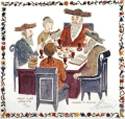
[ The Passover holiday begins Friday, April 15th at sundown this year. "In every generation, each of us is obligated to see himself or herself [lirot et atzmo] as though he or she personally came forth from Egypt." - Traditional Hagadah ]
03.25.22 (II Adar 22 5782) Concerning the observance of the Passover Seder the Torah states, "When your child asks you in time to come, 'What is the meaning of the testimonies and the statutes and the rules that the LORD our God has commanded you?' then you shall say, 'We were slaves (עבדים היינו) to Pharaoh in Egypt, but the LORD brought us out of Egypt with a mighty hand. And the LORD showed signs and wonders, great and grievous, against Egypt and against Pharaoh and all his household, before our eyes" (Deut. 6:20-23). We are instructed to "remember what the LORD your God did to Pharaoh and to all Egypt, the great trials that your eyes saw, the signs, the wonders, the mighty hand, and the outstretched arm, by which the LORD your God brought you out" (Deut. 7:19). As it is written in the Shema, "You shall teach them diligently to your children," we ask, what do we teach? And we answer: Kulo! Everything – the whole story of our deliverance (הסיפור המלא).
The early sages taught that Hebrew word "Pesach" (פסח) can be read as peh (פֶּה), "mouth," and sach (סַח), "speaks," indicating that Passover is a confession of the truth of God's redemption, testifying to the truth of the LORD's faithful love. On Pesach we thank God for the revelation and the wonder of the great Lamb of God that was slain... Indeed, in light of the truth of the Scriptures - both in the Torah, the writings, the prophets, and the New Covenant Scriptures - how is it possible to honor the LORD God of Israel and to celebrate his redemption apart from the Messiah who came to earth to die as the great Lamb of God? Yeshua is the heart and central meaning of the Passover, and there is simply NO valid Passover Seder apart from the blood of the Lamb (Heb. 2:3; Heb 10:28-29).
Hebrew Lesson
Deut. 26:8a reading (click):
Related Topics:
Finding your Greatest Good...

03.25.22 (II Adar 22 5782) The heart (הלב) is the center of the will - the locus of desire, affection, and love... However, the heart itself must be constrained by wisdom (חוכמה), since unbridled desire is slavery to the lower nature (יצר הרע), as it says: "The righteousness of the upright will deliver them, but the faithless will be ensnared by their own desires" (Prov. 11:6). The problem for many of us is having "disordered loves," that is, serving various idols of the heart that demand our attention yet divert us from what we really need. The difficultly is not so much that we indulge in lesser loves as much as we do not know the love of God that heals us and sets us free. As C.S. Lewis once said, "God cannot give us a happiness and peace apart from Himself, because it is not there. There is no such thing" (Mere Christianity). The righteous have found the most precious secret: "I shall behold your face in righteousness; when I awake, I shall be satisfied with your likeness" (Psalm 17:15).
It has been said that "there is nothing so whole as a broken heart." We become whole when we discover that the idols of our hearts do not truly satisfy us. Usually this involves a "severe mercy" as we learn that what we thought we "needed" proved to be just another illusion... Then and only then can we begin to believe in and to accept God's love as our highest good. Such "perfect love" casts out the fear induced by the idols of the heart. When we seek first the kingdom of God and His righteousness, the passions of our heart are ordered correctly. As it is also written in our Scriptures: "Delight yourself in the LORD, and he shall give you the desires of your heart. Commit your way to the LORD; trust also in him, and he will bring it to pass. And He shall bring forth your righteousness as the light, and your judgment as the noonday" (Psalm 37:4-6).
The Lord is near to the shavur lev (שבור לב), the one with a broken heart. The Hebrew word "lev" (לב) metaphorically refers to our inner life, that is, our affections, mind, and will. This is revealed in the letters of the Hebrew word itself: the Lamed (ל) depicts a "staff" used to direct something (i.e., the will), and the Bet (בּ) depicts the "house" of the physical body. Lev then represents our inner life of thought and feeling expressed in our actions. Those who are broken in heart – the nishberei lev (נִשְׁבְּרֵי־לֵב) – have discovered that they cannot control their own lives, that they are inwardly "shattered," and therefore they need divine help. Contrary to conventional wisdom, God helps those who cannot help themselves; He prefers to use broken vessels in His service (Psalm 51:19). As A.W. Tozer observed: "Beware of any Christian leader who does not walk with a limp."
Yeshua taught, "Blessed are the pure in heart, for they shall see God" (Matt. 5:8). As I've mentioned before, the Greek word translated "pure" is katharos (καθαρός), sometimes used describe the cleansing of a wound (catharsis), or to describe the unalloyed quality of a substance revealed through refining fire. Metaphorically, then, purity of heart refers to separation from the profane - singleness of vision, wholeheartedness, passion, and focused desire for the sacred. Faith is a great trembling of love: "With this ring I do worship thee..." As we center our affections on Yeshua, we become pure in heart -- i.e., unified, made whole, and healed of our inner fragmentation. We see the Lord both in this world, through his effects, and then panim el panim (פָּנִים אֶל־פָּנִים), "face to face," in the world to come. Our hope purifies us for that coming great day of full disclosure (1 John 3:2-3; Heb. 12:14). That day is surely drawing near, friends.
Hebrew Lesson
Psalm 37:4 reading (click):
The Silence of Aaron...
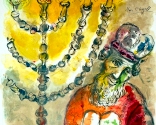
[ "To suffer rightly is to have a secret with God." - Soren Kierkegaard ]
03.25.22 (II Adar 22 5782) In our Torah reading for this week, parashat Shemini (שמיני), we read of a great tragedy that occurred on the very day that Israel was to celebrate the dedication of the Mishkan, or the portable sanctuary in the desert. When Aaron's sons Nadab and Abihu brought unauthorized incense into the Holy of Holies, they died on the spot at the hand of God. When Moses explained to Aaron that the death of his sons revealed the sanctity of God, Aaron said nothing: "he remained silent" (Lev. 10:3). The fire that killed Aaron's sons had wounded him profoundly as well.
The sages struggled to understand what happened here, some arguing that the transgression was so serious that death was the righteous punishment, while others admitted they did not understand God's severe response. In general, however the sages were distraught over the incident, and their confusion was compounded over Aaron's silence over the sudden death of his sons. Some midrashim say that Aaron cried and wailed and then fell silent, though the Torah simply says וַיִּדֹּם אַהֲרֹן - "and Aaron was silent."
Aaron's silence reminds me of Ludwig Wittgenstein's adage: "Whereof one cannot speak, thereof one must be silent," and it is likely there were no words that could express the shock of his loss... Indeed trauma often leaves people dumbstruck and overwhelmed in an ineffable flood of cascading emotions. The pain may so great to even transport the person into another "place," a place of detachment, of incommunicable loneliness and grief.
Aaron was silent... Was it the overwhelming pain of his loss that rendered him speechless, or did his emptiness sanctify him, bringing his soul before the Consuming Fire in immolation? We do not know. For most of us, the shock of trauma leaves us with a "speechless cry" that echoes within our sorrowing silence. Our pain expresses fear that since every relationship is fragile and may suddenly end without warning, everything we love will be lost to us, and this dread leaves us speechless, longing for undying love, and crying out for life.
What can we say in the face of our tragic losses in this life? Worldly wisdom sighs, "Things happen; there's no explanation. It's best to get over it and move on." Godly wisdom denies we live in a random world devoid of God's presence and purposes. Aaron's silence expressed his acceptance of the Divine decree. We say Kaddish, we defer to God's sovereign will and praise His Name as the one who in wisdom both gives and takes away. We may be left in the silence of grief for a season, but we remain before God in our bereavement and keep hope that one day all our fears will forever be gone, and that all things will be made new...
Hebrew Lesson
Job 1:21b reading (click):
Brokenness and Service...

[ The following is related to our Torah reading this week, parashat Shemini... ]
03.24.22 (II Adar 21, 5782) The service of God requires the death of the ego (Luke 9:23). Rashi says that Aaron was still deeply ashamed over the Sin of the Calf, and that is why Moses urged his brother forward: "Draw near to the altar" (Lev. 9:7). And though Aaron felt inadequate and unworthy to be the High Priest of Israel, Rashi comments that he was chosen precisely because of this. His reluctance and sense of utter unworthiness was the very reason why he was granted the role of Israel's High Priest. Likewise you might feel unworthy of your high calling in the Messiah and yet you are called to come before the Divine Presence and function as God's holy priest, no less than Aaron... You are chosen in your weakness; you are beloved because of your lowly standing; you are made "pure in heart" because you realize your own inner nothingness and need before the Savior.... Your brokenness is a gift that magnifies God's unending love and grace (1 Cor. 1:26-29).
The sages sometimes say that God is closer to sinners than to "saints." God in heaven holds each person by a string. When you sin, you cut the string; but then God ties it up again, making a knot - and thereby you are brought a little closer to him. Again and again your sins cut the string - and with each further knot God keeps drawing you closer and closer." (De Mello)
Hebrew Lesson
Psalm 34:18 reading (click):
Note: For more on this, see "Brokenness and Service: Further thoughts on Shemini."
A Consuming Fire...
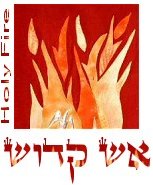
[ The following is related to our Torah reading for this week, parashat Shemini... ]
03.24.22 (II Adar 21, 5782) From our Torah portion for this week (i.e., Shemini) we read: "Now Nadab and Abihu, the sons of Aaron, each took his censer and put fire in it and laid incense on it and offered strange fire (אֵשׁ זָרָה) before the LORD, that He had not commanded them" (Lev. 10:1). The sages interpret "strange fire" (i.e., esh zarah: אֵשׁ זָרָה) as alien passion or illicit zeal stimulated by artificial means (in this case, drinking wine before their service). The experience of intoxication may seem to elevate the soul, but in reality it muddles the ability to discern spiritual realities: "Drink no wine or strong drink ... when you go into the tent of meeting, lest you die. You are to distinguish between the holy and the common, and between the unclean and the clean" (Lev. 10:9-10). Nadab and Abihu were highly honored in Israel, the first priests of God, and if they drank wine before entering the sanctuary it was surely not for crass purposes, but rather to "sanctify" their experience, or so they thought... They were severely judged, however, because they presumptuously sought to sanctify themselves by means of an artificial influence, and this made them "strange" before God. Likewise many people today seek "spiritual highs" and "signs" without undergoing the discipline of Torah study, prayer, meditation, and so on. God wants our hearts in service, but our hearts must be honest and soberly reverent before Him (1 Pet. 5:8; Eph. 5:15-18).
"Nadab and Abihu, the sons of Aaron ... brought strange fire ... and they died before the LORD" (Lev. 10:1-2). It is a fearful thing to fall into the hands of the Living God who is called esh okhlah, El kanna (אֵשׁ אכְלָה אֵל קַנָּא) - "a Consuming Fire, a jealous God (Deut. 4:24). Indeed, though atonement was provided under the law for every kind of sin and transgression, there was one exception: "But the soul that sins presumptuously (בְּיָד רָמָה) shall be out off from the midst of my people" (Num. 15:30). We must be careful not to casually regard God's truth with undue familiarity, lest we find ourselves under the influence of strange passions that lead to presumption....
Hebrew Lesson
Deut. 4:24 Hebrew reading (click):
Let us be sober and vigilant, friends. "Now these things happened to them as an example, but they were written down for our instruction, on whom the end of the ages has come" (1 Cor. 10:11). It is prophetically astounding that during the very time that the Tabernacle was inaugurated, tragedy struck and Aaron's two sons were killed. This should warn those teachers who speak casually of God from the pulpit, since they act profanely and encroach upon the Divine Presence. Let us be admonished, friends and honor the Living God. As the sages have wisely said: Da lifne mi attah omed: "Know before Whom you stand!"
Step by Step with God...

[ Christianity is of the opinion that the true Christian is sober, that (on the contrary) the less Christian anyone is the more that person is in a state of intoxication... - Kierkegaard ]
03.24.22 (II Adar 21, 5782) In matters of discernment and interpreting the Scriptures, it is needful that we should go slowly, step-by-step, with repetition, so we may soberly understand God's mind and truth... This often includes the careful study of Hebrew (and Greek) words, taking time to understand the historical context, and being mindful of the nuances of an author's grammar, but more importantly, it requires earnestness to obey the truth from the heart, to approach the word in faith, without obfuscation or evasion...
When the prophet Isaiah rebuked the apostate leaders of Ephraim, he foretold that "the proud city of Samaria -- the glorious crown of the drunks of Israel -- will be trampled beneath its enemies' feet" (Isa. 28:3). The priests and prophets were offended at Isaiah's words: "Who does the LORD think we are?" they asked. "Why does he speak to us like this? Are we little children, just recently weaned? He tells us everything over and over -- precept upon precept; line upon line; a little here, a little there!" (Isa. 28:9-10). Isaiah then told them that since they refused to hear the "baby talk" of Scripture, they would be forced to hear stammering lips of invaders who would raze their prized city. Tragically and ironically the mockery of the leaders would return to them: "So the word of the LORD will be to them 'precept upon precept, precept upon precept, line upon line, line upon line, here a little, there a little' -- that they may go, fall backward and be broken, snared and taken" (Isa. 28:13).
Why did the leaders of Israel turn away from the simple teaching of the Scriptures? Why did they engage in flagrant debauchery and repudiate the word of the LORD? Why did they mock the prophets the Lord sent to them? Apparently the inhabitants of the Northern Kingdom willingly assimilated the pagan idolatry and Baal worship of the aborigines. King Jeroboam built two places of worship, one at Bethel and one in northern Dan, as alternatives to the Temple in Jerusalem (1 Kings 12:29). According to Tel Dan excavations, Jeroboam placed golden bulls at the entrance of each spurious temple to represent the national god. Later King Ahab (and his wife Jezebel) further promoted the worship of Baal within the land. Eventually judgment befell the Northern Kingdom when the Neo-Assyrians invaded and razed the land, and the capital of Samaria fell in 722 BCE. The people of Israel were taken captive, displaced in Mesopotamia, and later become known as the lost ten tribes of Israel.
The Scriptures explain the reason for the fall of the Northern Kingdom of Israel was their ongoing apostasy and indifference to the truth of God: "And this occurred because the people of Israel had sinned against the LORD their God, who had brought them up out of the land of Egypt from under the hand of Pharaoh king of Egypt, and had feared other gods. They had followed the practices of the pagan nations the LORD had driven from the land ahead of them, as well as the practices the kings of Israel had introduced. The people of Israel had also secretly done many things that were not pleasing to the LORD their God. They built pagan shrines for themselves in all their towns, from the smallest outpost to the largest walled city. They set up sacred pillars and Asherah poles at the top of every hill and under every green tree. They offered sacrifices on all the hilltops, just like the nations the LORD had driven from the land ahead of them. So the people of Israel had done many evil things, arousing the LORD's anger. Thus they served idols, of which the LORD had said to them, "You shall not do this" (2 Kings 17:7-12).
God had appealed time and again for people to turn to him for life, as it says in Proverbs: "I called you so often, but you wouldn't come. I reached out to you, but you paid no attention. You ignored my advice and rejected the correction I offered. So I will laugh when you are in trouble! I will mock you when disaster overtakes you -- when calamity overtakes you like a storm, when disaster engulfs you like a cyclone, and anguish and distress overwhelm you. When they cry for help, I will not answer. Though they anxiously search for me, they will not find me. For they hated knowledge and chose not to fear the LORD. They rejected my advice and paid no attention when I corrected them. Therefore, they must eat the bitter fruit of living their own way, choking on their own schemes. For simpletons turn away from me -- to death. Fools are destroyed by their own complacency. But all who listen to me will live in peace, untroubled by fear of harm" (Prov. 1:-24-33).
Hebrew Lesson
Isaiah 28:10-11 reading (click):
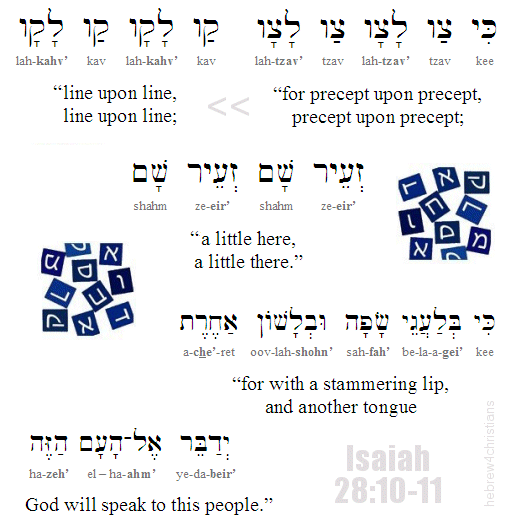 |
So ironically and paradoxically, the very complaint that the LORD's message is tedious and childish, a burden for us to bear, leads to dissolution, slavery, and to death itself... The rulers of Israel thought they had better answers to the great questions about the reason for life; they turned to mysteries of darkness, the forbidden, and enjoyed the pride of the esoteric. They scoffed at the idea of taking Scripture seriously - reading "precept upon precept, line upon line." In the end they were destroyed because they refused the truth of God...
Along these same lines Soren Kierkegaard lamented the dishonesty of the Bible scholars and professors of his day. He wrote: "The matter is quite simple. The Bible is very easy to understand. But we Christians are a bunch of scheming swindlers. We pretend to be unable to understand it because we know very well that the minute we understand we are obliged to act accordingly. Take any words in the New Testament and forget everything except pledging yourself to act accordingly. My God, you will say, if I do that my whole life will be ruined. Herein lies the real place of Christian scholarship. Christian scholarship is the Church's prodigious invention to defend itself against the Bible, to ensure that we can continue to be good Christians without the Bible coming too close. Dreadful it is to fall into the hands of the living God. Yes, it is even dreadful to be alone with the New Testament."
Reading the Scriptures is not an academic subject as much as it is a matter of the heart, and therefore the key principle of exegesis (i.e., interpretation) is to read by "the rule of faith" (κανών της πίστεως), that is with a heart and will to "believe in order to understand." As Tertullian said it: "Let our 'seeking,' therefore be in that which is our own, and from those who are our own, and concerning that which is our own, – that, and only that, which can become an object of inquiry without impairing the rule of faith." This principle is sometimes stated as "sacred Scripture is its own interpreter," which means there is an inherent "circularity" in our engagement with the Scriptures, though the entry into the circle is the presence of faith that informs and gives revelation in the encounter of divine truth. Theological inferences are tested for their consistency with Scripture, and Scripture is interpreted by the Holy Spirit speaking in Scripture. We do not attest to the veracity of Scripture by appealing to Scripture itself, but to the witness of the people of God who received the original revelation. Witnesses like our father Abraham who counted stars and believed God's impossible promise, and like his son Isaac who was willing to be sacrificed in obedience to God's will; and like Jacob who wrestled with God and was renamed "Israel"; and like Joseph and Moses and the early judges of Israel; witnesses like Samuel and the various early Hebrew prophets; great leaders like King David, his son Solomon, and the burdens of later prophets, including the wisdom and foresight of Ezra the Scribe. And of course through the greatest revelation of all, by the testimony and witness of Yeshua the Son of the Most High God and the account of that revelation delivered by his disciples...
"For we were not making up stories when we told you about the powerful coming of our Lord Jesus Christ. We saw his majestic splendor with our own eyes when he received honor and glory from God the Father. The voice from the majestic glory of God said to him, "This is my dearly loved Son, who brings me great joy." We ourselves heard that voice from heaven when we were with him on the holy mountain. Because of that experience, we have even greater confidence in the message proclaimed by the prophets. You must pay close attention to what they wrote, for their words are like a lamp shining in a dark place-- until the Day dawns, and Christ the Morning Star shines in your hearts. Above all, you must realize that no prophecy in Scripture ever came from the prophet's own understanding, or from human initiative. No, those prophets were moved by the Holy Spirit, and they spoke from God" (2 Pet. 1:16-21).
We walk (and we read) by faith, friends. We trust in the veracity of Scripture based on the testimony of its authors and by means of the assurance afforded by the Holy Spirit. We "step into" the great conversation of the chosen people of God - stretching back to Adam and Eve and running into the future visions given to the apostle John on the Island of Patmos - and we find confirmation for our faith in the timeless themes and motifs of God's faithful, themes like the "scarlet thread" of the blood that atones for our sin - first issued from the sacrifice of the lamb in the primordial garden itself, later enshrined by the sacrifice of the Passover in Egypt, and later still foretold and substantiated in the sacrificial death of Yeshua as the Lamb of God who takes away the sins of the world. Of course other examples could be cited, but understand that the rule of faith is an organic system or framework which contextualizes and constitutes the form and meaning of God's revelation. Without these deeper themes that pervade the overarching message, God's revelation would not intelligible, and when taken out of context, the revelation becomes distorted and perverted. Hence we understand how tradition is bound up with the very idea of Scripture itself, since the concept of the "canon" of Scripture - what books are esteemed as divinely inspired - is not something revealed by Scripture itself... Of course Yeshua himself spoke of "weightier matters" of the law, alluding to the need to discern what is of greater concern to the people of God, and that meant not only rejecting accretions invented by various religious authorities, but distilling the truth to discover the deeper meaning of God's heart and will.
Though the Bible itself may sometimes challenging to read, the real challenge is live out its message in your life. "Faith seeking understanding" often means encountering paradoxes, questions, and afflictions that derive not from the lack of faith but from having faith in the first place. For example, the problem of why the faithful suffer is not one that threatens the worldview of the ungodly. Kierkegaard again summarizes nicely the ongoing struggle to live the truth: "Truth is not something you can appropriate easily and quickly. You certainly cannot sleep or dream yourself to the truth. No, you must be tried, do battle, and suffer if you are to acquire the truth for yourself. It is a sheer illusion to think that in relation to the truth there is an abridgment, a short cut that dispenses with the necessity for struggling for it." The "meaning" revealed in Scripture is both a gift and a struggle, since truth is ultimately a matter of the heart and will than it is a matter of abstract intellectual assent.
We should stop regarding tradition with suspicion, since it is part of the story of our faith, and it is part of our heritage as God's people. Tradition reminds us that we are all linked together by faith. Our confession of trust in the LORD God of Israel connects us to all the great heroes of the faith - and most especially to Yeshua Himself. Salvation is something "corporate," by which I mean it is something shared. We are part of the redeemed community or family of God, and that is part of the reason why Yeshua taught us to pray in the plural: "Our Father, who art in Heaven, Sanctified is Your Name..."
Related Topics:
Returning Back Home...
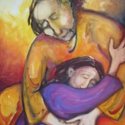
[ "Be careful with words. C-O-W gives no milk. M-A-N-U-R-E has no stench. L-O-V-E knows no passion. Mistake words for Truth and you exile yourself from Reality." - Avot 1:11]
03.23.22 (II Adar 20, 5782) We must be careful not to worship an idol, that is, a false concept of God! It is entirely possible to study the Bible, to go to church or synagogue, and yet worship a pagan god. How so? By not knowing the heart of the Father; by not honoring the One who passionately seeks our healing. We know the Father (i.e., God) by the Son, that is, in "the language of Son" (Heb. 1:2; Luke 10:21-24) and in the truth of his passion. Our heavenly Father is eager to forgive and embrace all of his children (John 3:16-17). In Yeshua's famous parable of the "prodigal son," the father saw his wayward child a "long way off" and ran to embrace and kiss him - no questions asked, no explanations needed about his past. When the son nevertheless began reciting his carefully prepared speech of regret and repentance, the father barely listened, and in his overwhelming joy instructed his servants, 'Bring quickly the best robe, and put it on him, and put a ring on his hand, and shoes on his feet. And bring the fattened calf and kill it, and let us eat and celebrate. For this my son was dead, and is alive again; he was lost, and is found...' (see Luke 15:20-25).
Know the heart of the Father... God sees you while you are still "a long way off" (Rom. 5:8). He runs to you with affection when you first begin to turn your heart toward Him. Indeed, God's compassion is so great that He willingly embraces the shame of your sins and then adorns you with "a fine robe, a ring, and sandals." Your Heavenly Father even slaughters the "fattened calf" (Yeshua) so that a meal that celebrates your life may be served.
It is never too late to turn to God... The prophet Jeremiah spoke in the Name of the LORD: "Return, faithless Israel, declares the LORD. I will not look on you in anger, for I am kind (כִּי־חָסִיד אֲנִי), declares the LORD" (Jer. 3:12). When the people drew back in shame, however, God encouraged them by saying "My children, if you return, will you not be returning to your Father? Return, O faithless sons; I will heal your faithlessness. "Behold, we come to you, for you are the LORD our God."
Hebrew Lesson
Psalm 80:3 Hebrew (click):
Turning Water to Wine...
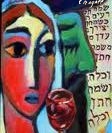
[ This Sabbath is called "Shabbat Parah," the Sabbath of the [red] Cow." In addition to the Torah reading (i.e., Shemini), we read about the red heifer sacrifice and the waters of purification. ]
03.23.22 (II Adar 20, 5782) The first "sign" (σημεῖον) of the Messiah, namely, the miracle of turning water into wine during the wedding at Cana (John 2:1-11), prefigured his teaching about the new covenant and the wedding celebration to come. Yeshua transformed holy water intended for individual purification (i.e., mei niddah [מֵי נִדָּה], the waters that cleanse from contact with death), into a means of celebrating the gift of shared life. Instead of focusing on matters of personal holiness that might separate us, Yeshua brought love and union to the forefront. Morover, during his last Passover Seder with his disciples, Yeshua took the Third Cup, the Cup of Redemption, and sanctified it as the Cup of Betrothal, symbolizing his promise that one day we shall be united to him forever (Rev. 19:7).
It is noteworthy that Yeshua's earthly ministry began amidst betrothal and the celebration of love, and one of his central parables focused on whether people would accept the Father's invitation to join in the wedding celebration for his Son (see Matt. 22:2-14). And in the world to come, we will forever celebrate the glory of God's eternal love for us...
Hebrew Reading:
 |
 |
Finding Real Treasure...
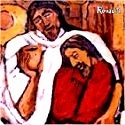
03.22.22 (II Adar 19, 5782) Yeshua teaches us to earnestly seek for what really matters in life, to discover that which is best of all. He said, "The kingdom of heaven is like treasure hidden in a field, which a man found and covered up. Then in his joy he goes and sells all that he has and buys that field. Again, the kingdom of heaven is like a merchant in search of fine pearls, who, on finding one pearl of great value, went and sold all that he had and bought it" (Matt. 13:44-46). Here Yeshua illustrates that a relationship with God is the true source of joy and value in life, and that all other passions and desires are like "fools gold" when compared with its overwhelming worth...
In this connection Soren Kierkegaard wrote: "If anyone thinks he is a Christian and yet is indifferent toward being that, then he really is not one at all. Indeed, what would we think of a person who gave assurances that he was in love and also that it was a matter of indifference to him?" (Works of Love). The Shema, the "first and greatest commandment," is to love God "bekhol levavkha" (בְּכָל־לְבָבְךָ) with all our hearts, and yet how is that love possible apart from the revelation of the passion of love itself? "We love because God first loves us" (1 John 4:19), and therefore teshuvah ("repentance") is a matter of being in love, celebrating God's heart for us, awakening to its wonder, and being thrilled and overjoyed at its reality. Isn't this the essence of the matter?
"Shimon ben Yonah, atah ohev oti?" – "Simon son of Jonah, do you love me?" (John 21:17). But how can we love the Lord apart from trusting his heart for us? "Come unto Me," Yeshua says, "live in Me and I will live in you" (John 15:1-5; Matt. 11:28-30). O Lord God our Savior, deliver us from apathy and indifference! Soften our hearts and awaken us to our great desire and need for you! Hashivenu, Adonai: turn us, O LORD, and we shall be turned; heal us, and we shall be healed... Help us to come to you and to know the breadth and length and height and depth of your great love for us (Eph. 3:18-19).
So for what do you hope, friend? What are your dreams? Your deepest desires? Where is your treasure? Yeshua cautioned those who sought their happiness in this world: "Do not store up for yourselves treasures on earth... be rich toward God" (Matt. 6:19-20; Luke 12:21). When we treasure God, our focus is directed toward the eternal reality, and our interest in this world is minimal. We trust God to meet our daily needs and surrender our future to His care. The only worry we face concerns our own deficiencies in our obligations to the Savior. Our duty is to love God in the truth - bekhol levavkha - with all our heart, having no thought of ourselves. Indeed, as I have mentioned before, self-denial means to quit thinking about yourself (from α-, "not," + ῥέω, "to speak") by focusing on God's love for you. As Simone Weil once said, "It is not my business to think about myself. My business is to think about God. It is for God to think about me." Amen; we are healed in His love for us.
מי־לי בשׁמים
ועמך לא־חפצתי בארץ
mee'-lee · va·shah·mah'·yeem
ve·ee·me·kha · loh-chah·fahtz'·tee · va·ah'·retz

"Whom have I in heaven but you?
And there is nothing on earth that I desire besides you."
(Psalm 73:25)

Hebrew Lesson
Psalm 73:25 Hebrew (click):
Message of Loneliness...

03.22.22 (II Adar 19, 5782) Sometimes we may experience painful loneliness -- a desperate feeling that we are unlovable, unwanted, unseen. We struggle between the extremes, at once lamenting our very existence while demanding to be made safe. We feel abandoned, hopeless, and shrouded in gloom: "darkness, my one companion left..." (Psalm 88:18). We then attempt to suppress or avoid the pain through obsessions of various kinds, but doing so will only temporarily hide the truth of our inner emptiness and sadness. Deep down we are profoundly afraid that we will never feel comforted, that love is not possible for us, and therefore we are trapped, bound to our sorrow, made captive to a relentless inner grieving of heart. "Not being welcome is your greatest fear. It connects with your birth fear, your fear of not being welcome in this life, and your death fear, your fear of not being welcome in the life after this. It is the deep-seated fear that it would have been better if you had not lived" (Nouwen).
It takes courage to face ourselves, but it is only when we go "through the wound" that we discover who we really are -- and how our loneliness teaches us our desperate need for God's love. Only when we accept our loneliness and understand it as an invitation to turn away from the world and its illusions will we be able to seek God alone, in our solitude, and there find healing for our broken hearts (Psalm 147:3). It is in the seclusion of the desert when we discover yesh ohev davek mei'ach, "there is a Beloved one who sticks closer than a brother" (Prov. 18:24). In the desert, in the waste places of the hurting soul, in the mourning over your life, you learn that you are never really alone, that you are not forgotten, that God sees you and wants you to feel accepted, chosen, esteemed, beloved, wanted... In the desert your Beloved one speaks and says to you: "Arise, my love, my beautiful one, and come away" (Song 2:10).
The core of the struggle is here - whether you will decide to trust in God's personal love for you or whether you will shrink back into the places of darkness, isolation, and pain. Yeshua says, "Come to me; I love you, I accept you; I receive you; please, be welcome with me; I will take your hand, I will be with you..." Faith in Yeshua means believing in God's love for you.
Hebrew Lesson
Song 2:10 Hebrew (click):
Blessing or a Curse...

03.21.22 (II Adar 18, 5782) "See, I am setting before you today a blessing and a curse" (Deut. 11:26). What makes the difference in our hearts and lives? There's an ongoing temptation to live under the curse - to regard our troubles, our losses, our failures as signs that we are on the "outside" of God's favor, that we are being punished, that we are not welcome, that we are getting what we deserve....
Faith in God's salvation defies and repudiates the way of the curse. It affirms that the blessing belongs to us, not on the basis of our merits, but on the basis of the "righteousness of God" (δικαιοσύνη θεοῦ) - that is, the grace and love of God revealed in Yeshua. The opposite of sin is not our goodness but our faith in the goodness of God. As Karl Barth once said: "No one can be saved in virtue of what he can do; everyone can be saved in virtue of what God can do." Amen. As Esther, who dared to defy the law by entering before the King in the hope of his welcome, so we dare believe in God's welcome for us too... Therefore choose life by believing the blessing is for you -- this very hour.
Hebrew Lesson
Deut. 11:26 Hebrew (click):
Sabbath of the "Red Cow"
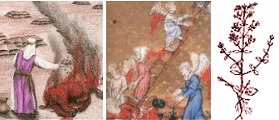
[ This Shabbat is called "Shabbat Parah," the Sabbath of the [red] Cow." In addition to reading the regular Torah reading (i.e., Ki Tisa), we read about the mysterious red heifer sacrifice.... ]
03.21.22 (II Adar 18, 5782) The Sabbath that immediately follows Purim is called Shabbat Parah - the "Sabbath of the [red] Cow." In traditional synagogue services, two Torah scrolls will be removed from the ark, and from the first scroll will be read the Torah portion for the week (e.g., Ki Tisa), and from the second will be read the chapter regarding the laws of the sacrifice of the "Red Heifer" (Num. 19:1-22). The early sages decided to recite the laws of the Red Heifer at this time to recall the remedy of the sin of the Golden Calf, and to remind the people to purify themselves before coming to Jerusalem for the pilgrimage festival of Passover. It is thought that since the sprinkling of the "waters of separation" cleanses from the uncleanness of death, reading this portion will help prepare our hearts for the time of Passover when we celebrate deliverance from death.
The Red Heifer offering is considered a paradox to most Jewish thinkers, though it can be seen as a revelation of the Yeshua our Messiah. The paradox is that the one who offers this sacrifice becomes ritually impure, while the sprinkling of the ashes is used to make people clean... The ritual is considered chok within the Jewish tradition, meaning that it makes no rational sense. The Talmud states that of all the 613 commandments given in the Torah, even King Solomon with all his wisdom could not fathom this decee. However, the sacrifice of Yeshua the Messiah can be understood as the fulfillment of the symbolism of the parah adumah. Both were entirely rare and without defect (sin); both were sacrificed "outside the camp"; both made the one who offered the sacrifice unclean but made the one who was sprinkled by it clean; and finally, both sacrifices cleanse people for priestly service.
The parah adumah had to be a perfect specimen that was completely red, "without blemish, in which there is no defect (mum)." The rabbis interpreted "without blemish" as referring to the color, that is, without having so much as a single white or black hair. This is the only sacrifice in the Torah where the color of the animal is explicitly required. Moreover, the parah adumah was never to have had a yoke upon it, meaning that it must never have been used for any profane purposes.

Unlike all other sacrifices offered at the altar, the parah adumah was taken outside the camp and there slaughtered before the priest, who then took some of its blood and sprinkled it seven times before the Mishkan (thereby designating it as a purification offering). [During the Second Temple period, the High Priest performed this ceremony facing the Temple while atop the Mount of Olives.] Then the red heifer would be burned in its entirety: its hide, flesh, blood, and even dung were to be burned (unlike other Levitical korbanot). Unlike other offerings, all the blood of the sacrifice was to be burned in the fire.
Hyssop, scarlet yarn, and a cedar stick would then be thrown upon the burning parah adumah (these same items were used to cleanse from tzara'at, skin disease). In other words, the blood was assimilated into the ashes of the sacrifice, which were then gathered and mixed with water to create the "water of separation" (mei niddah) for the Israelite community. Note that the word "separation" (niddah) refers to menstrual impurity and harkens to Zech. 13:1: "On that day there shall be a fountain opened for the house of David and the inhabitants of Jerusalem, to cleanse them from sin and from niddah."
Anyone (or anything) that came into contact with a corpse (the embodiment of sin and death) was required to be purified using the mei niddah. The purification procedure took seven days, using stalks of hyssop dipped into the water and shaken over the ritually defiled person on the third day and then again on the seventh day. After the second sprinkling, the person undergoing the purification process would be immersed in a mikvah and then be unclean until the following evening.
According to Jewish tradition, the Red Heifer sacrifice was to atone for the sin of the Golden Calf, though the Torah itself does not make this association. The LORD Yeshua, our High Priest of the New Covenant, is the perfect fulfillment of the Parah Adumah, since he was completely without sin or defect (2 Cor 5:21; John 8:46); he was sacrificed outside the camp (Heb 13:13); he made himself sin for us (2 Cor 5:21); his sprinkling makes us clean (1 Pet 1:2; Heb 12:24; Rev 1:5); and the "water of separation" that his sacrifice created is the means by which we are made clean from the impurity of sin (Eph 5:25-6; Heb 10:22).
Hebrew Lesson
Num. 19:2a Hebrew (click):
Note: For more on the Red Heifer sacrifice, see the "Gospel of the Red Cow" article.
This week's Torah:
Parashat Shemini - פרשת שמיני

03.20.22 (II Adar 17, 5782) Shavuah tov, chaverim! This week's Torah reading, called parashat Shemini ("eighth"), continues the account of the seven-day ordination ceremony for the priests (as described earlier in Parashat Tzav). During each of these "seven days of consecration" Moses served as the first High Priest of Israel by offering sacrifices and training Aaron and his sons (i.e., the kohanim or priests) regarding their duties at the mishkan (i.e., "Tabernacle"). On the eighth day however, (i.e., Nisan 1), and just before the anniversary of the Passover, Aaron and his sons began their official responsibilities as Israel's priests. In the midst of the dedication, however, tragedy struck as Aaron's sons Nadav and Abihu took it upon themselves to make their own offering before the Holy of Holies of the tent. Since this was not the prescribed means of offering sacrifice, God considered the incense offered to be "strange fire" (esh zarah) and both sons were tragically consumed by fire before the LORD (Heb. 10:29,31). Aaron was required to remaine silent as his sons' bodies were removed by his cousins, and Moses then warned Aaron's two remaining sons, Eleazar and Ithamar, not to mourn during this sacred occasion.
The portion ends with a list of which animals, birds, fish and insects are permitted or forbidden as food, which subsequently provided the framework for Jewish dietary law (i.e., kosher law). The Israelites were permitted to eat any mammal that has both a split hoof and chews its cud (Lev. 11:3). Likewise, only fish that have both scales and fins were to be regarded as kosher. A list of acceptable (i.e., non-predatory) birds was given, along with the commandment not to eat any insects unless they have a pair of jointed legs used for leaping. The dietary laws were intended to sanctify the Israelites by separating them for holiness: "For I am the LORD your God. Consecrate yourselves therefore, and be holy, for I am holy."
Providentially considered, it is no coincidence that the inauguration of the Sanctuary is directly connected to the Passover, since the daily sacrifice of the Lamb (i.e., korban tamid: קָרְבָּן תָּמִיד) served as an ongoing memorial of the Exodus from Egypt (יציאת מצרים) -- and indeed all the laws of sacrifice (תורת קרבנות) form the central teaching of the Torah itself. Reflect upon the fact that the central sacrifice of the Mishkan (i.e., "Tabernacle") was that of a defect-free lamb offered every evening and morning upon the altar in the outer court, along with matzah and a wine offering, signifying the Passover Lamb of God given sacrifice for us. This is called "God's Food" in the Torah (Exod. 29:38-42; Num. 28:4-10; John 1:29).
Passion's Inner Fire...
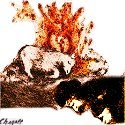
[ The following is related to our Torah reading this week, parashat Tzav. Please read the Torah portion to find your place here... ]
03.18.22 (II Adar 15, 5782) "This is the law for the burnt offering (olah): it is what ascends on the hearth of the altar all night long, until morning..." (Lev. 6:9). In a Sefer Torah (i.e., handwritten Torah scroll), the Hebrew word for "hearth," or the floor of the altar's fireplace, is mokdah (מוֹקְדָה), written by the scribes using a miniature Mem (מ). The Kotzker Rebbe comments that since the altar symbolizes inner life, the smaller Mem teaches that the fire in one's soul should be understated - that it should burn within as an steady inner passion - not with flash, ostentation, or flamboyance. People sometimes get confused and think that passion for God means hype, loud music, special experiences, and so on, though it was steady "inner fire" that moved Yeshua to remain focused to endure the cross.
Hebrew Lesson
Psalm 39:7 Hebrew (click):
Dear friends, the Lord has not taken us this far only to abandon us now... He has solemnly promised never to leave nor forsake us (Deut. 31:8; Isa. 41:10; Heb. 13:5). There is wonderful joy ahead, even though you have to endure many trials for a little while (1 Pet. 1:6). Therefore let your heart of faith give thanks to the LORD, for His love and mercy endure forever. Shabbat Shalom and every blessing be yours in Yeshua...
Believing to See...
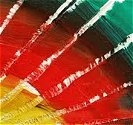
[ We do not understand in order to believe, but believe in order to understand... ]
03.18.22 (II Adar 15, 5782) Faith believes in the invisible light and accepts the truth of love that overcomes all darkness, hate, and fear. "I believe..." "I believe to see...." "I believe to see the goodness of the LORD..." "I believe to see the goodness of the LORD in the land of the living" (Psalm 27:13). I believe; I look upward; my chest aches and I long for relief; I look forward; my heart hopes even in these passing shadows, even in the midst of my fears, my afflictions, my struggles. My heart chooses to see the unseen good, the good limned by God's promise, the substance of his kindness, his blessing whispered over my fears...
The heart of faith testifies that there is "unfinished business," that there is more than meets the eye, that evil will not have the last word, and that our tears will one day forever be wiped away. Despite the ambiguity, faith "hopes against hope" that the LORD God will intervene and bring everlasting healing to us all. As it says, "Let him who walks in darkness and has no light trust in the Name of the LORD (יִבְטַח בְּשֵׁם יְהוָה) and rely on his God."
Bittachon (trust) is a word for this world, which says, "Though he slay me, I will trust in him..." Those who call upon the LORD can trust not only in concealed good behind ambiguous appearances ("all things work together for good") but also in a future, real, substantive good that will one day be clearly manifest for us all. Meanwhile, may the LORD our God keep us from such depth of sorrow that leads to sickness, darkness and despair. Amen.
Hebrew Lesson
Psalm 27:13 Hebrew (click):
Word Became Flesh...

[ The following is related to our Torah reading this week, parashat Tzav.... ]
03.18.22 (II Adar 15, 5782) Our Torah portion this week (i.e., Tzav) begins, "The Eternal (יהוה) spoke to Moses" (Lev. 6:8), which paradoxically refers to God as if He is a man... Theologians sometimes call this sort of language "anthropomorphism," though it clearly anticipates the great Incarnation itself, when the Timeless and Infinite One became embodied in time and space in the person of Yeshua. Indeed Yeshua is called the "Word of God" who became flesh and "tabernacled" in our midst (John 1:1,14). "All things were made by Him and without Him was not anything made that was made" (John 1:3). And just as the Angel of the LORD (מַלְאַךְ יְהוָה) mediates the Divine Presence to the heavenly host, so Yeshua mediates the Divine Presence to humanity as the "Son of Man" (בֶּן־הָאָדָם). "For the Eternal One who said, 'Let light shine out of darkness,' has shone in our hearts to give the light of the knowledge of His glory in the face of Yeshua the Messiah" (2 Cor. 4:6).
In the Book of Hebrews we read that "in these last days God has spoken to us ἡμῖν ἐν υἱῷ," which literally means God speaks in the language "of Son" (Heb. 1:2). The Eternal speaks as the One who emptied Himself to become one of us, who clothed himself in our humanity, so that he could touch us, empathize with us, and to ultimately die for our atonement as the "Lamb of God."
Hebrew Lesson
Psalm 33:6 Hebrew reading (click):
Teshuvah and Despair...

03.18.22 (II Adar 15, 5782) There are moments – dark, gnawing, raw – when you may lose sight of hope, when you might even fear that you have lost your faith – not in God or his promises – but rather in yourself, in your own strength to continue, to stay focused, to keep pressing on "hope against hope..." The remedy here is always the same: to remember that within you – that is, in your flesh - "there is no good thing" and that the miracle of salvation is made secure by God's passion for you, not your own power or desire. "Not by might, nor by power, but by my Spirit, saith the LORD of Hosts."
We don't trust in ourselves nor in the strength of our inner resolve, but solely in the power of God to make the way (John 1:13). We must turn away from ourselves to regain the message of God's unfailing love; only when we lose sight of ourselves do we find ourselves. God redeems you from your lost estate and touches you in your uncleanness; He clothes himself in your pain so that you may be clothed in his love. That never changes, despite dark moments, and to that we must always return...
Hebrew Lesson
Isaiah 40:29 Hebrew reading (click):
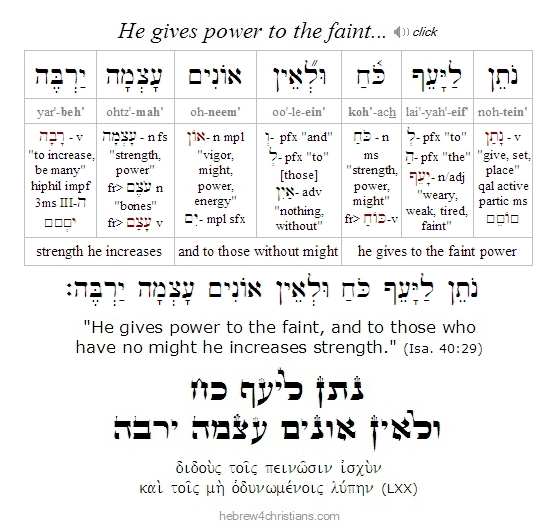 |
Where it says, "I can do all things through Messiah who strengthens me" (Phil 4:13), that includes being healed of the inner pain of your life: your failures, your shame, the ache of rejection, abandonment, and so on. It means being set free from disillusionment, despair, and the oppression of relentless fear. "I can do all things through Messiah" means no longer accepting messages of self-hatred and hopelessness, no longer heeding the malicious whispers that say: "I am of no value," "I am unlovable," "my life is hopeless." No, "I can do all things through Messiah" means learning to be accepted, honored, and esteemed by God; it means opening your heart to God's love and blessing for your life; it means allowing your heart to be made right, to have inner peace... After all, Yeshua's great prayer was that we would know the truth of God's love for us (John 17), and this is the central need our lives.
Parables and Revelation...
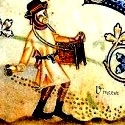
[ The holiday of Purim celebrates God's providential deliverance of his people... ]
03.17.22 (II Adar 14, 5782) Yeshua often used various agricultural images in his parables. For example, he explained that people are known by the "fruits" of their lives (Matt. 7:16-20). He likened the spread of his message in terms of "sowing and reaping" (Matt. 13:3-23) and compared the Kingdom of Heaven to the secret working of a mustard seed (Matt. 13:31-32). Yeshua regarded the world as a "field" for planting with different "types of soil" (Matt. 13:38-43), and warned of the "great harvest" of souls at the end of the age (Luke 10:2; Matt. 13:30). He pointed to signs from a fig tree to indicate the nearness of the prophesied End of Days (Matt. 24:32-33). Yeshua also used the metaphor of a "vine and its branches" to explain how his followers are to be connected to Him (John 15:1-6).
Undoubtedly Yeshua taught in parables because they simultaneously conceal and reveal the truth. A parable obscures the truth to those who don't really want it; just as it reveals the truth to those who do (Luke 8:9-10; Psalm 72:8; Matt. 13:34-35). Since Yeshua's whole life was a parable of sorts - a "disguise" that led to the victory of our deliverance (Phil. 2:7) - it is not surprising that he regularly used "figures of speech" to provoke people to examine their own heart attitude and faith... In this connection note that Yeshua never explained the "mysteries of the kingdom of God" directly to the crowds, nor did He ever pander to the crowd's clamor or interests. His message is always meant for the individual soul who was willing to follow Him -- to the one who had "ears to hear."
Reading the parables can help us take inventory of our lives. For example, whenever we hear the famous "parable of the sower" (Matt. 13:3-23) we are reminded that God is like a farmer who sows seed upon the soil of human hearts (the quality of which may be hard, shallow, choked, or good). If we are honest with ourselves, we will see our own hardness, shallowness, and selfishness in contrast to the fruitfulness marked by the good soil, and this may prompt us to seek God for help. Only the new heart (lev chadash) created by power of God's Spirit can possibly yield the fruit of the Spirit. Yeshua therefore warns us: "Take care then how you hear, for to the one who has, more will be given, and from the one who has not, even what he thinks that he has will be taken away" (Luke 8:18).
Hebrew Lesson
Psalm 78:2 Hebrew with comments (click):
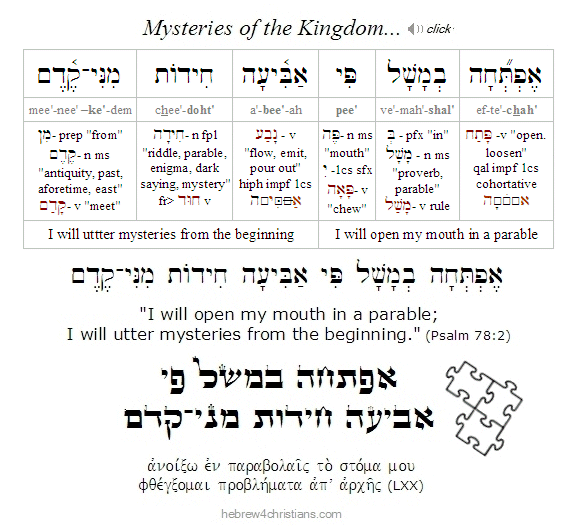 |
We must remember that fruit does not immediately crop up but requires time and its own season... The process of spiritual growth is ultimately mysterious and divine: "The Kingdom of God is like someone who spreads seed on the ground. He goes to sleep and gets up, night and day, and the seed sprouts and grows, though he does not know how. By itself (αὐτομάτη, "automatically") the soil produces a crop, first the stalk, then the head, then the full grain in the head. And when the grain is ripe, he comes in with his sickle because the harvest has come" (Mark 4:26-29).
With God all things are possible, and the life of God is a miracle that comes from God's own source of Life. It is the fruit of the Spirit, after all, and not the result of human effort or moral reformation... Amen and chag Purim sameach!
Purim and Prophecy...
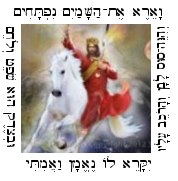
[ The holiday of Purim occurs this evening at sundown this year... ]
03.16.22 (II Adar 13, 5782) Both Chanukah and Purim are holidays that celebrate God's victory over the forces of darkness... Just as the prophet Daniel foresaw the events of Chanukah, that is, the rise of "Epihpanes," the "Messiah of Evil" who will one day attempt to "assimilate" all of humanity into a "New World Order" (Dan. 9:27, 2 Thess. 2:3; Rev. 13:7-9, etc.), so Purim foretells how this wicked one will attempt to destroy the Jewish people during the End of Days (אַחֲרִית הַיָּמִים), though he will be destroyed by his own wicked devices. The Midrash Esther says that Purim, unlike many of the other holidays, will be celebrated even after the final redemption after the End of Days. This is because the story of Purim -- i.e., God's covenantal faithfulness and defense of His people -- will be magnified in the deliverance that leads to the establishment of the Messianic Kingdom upon the earth. Indeed, the Second Coming of the Messiah will be regarded as the final fulfillment of Purim! So while it is a often seen as time of unbridled celebration in Israel (ad lo yoda), the holiday of Purim has a very sober prophetic message that foretells the glorious end of this age.
Here is a vision of the coming "Purim haGadol," the great deliverance to come:
"Then I saw heaven opened, and behold, a white horse! The one sitting on it is called Faithful and True (נֶאֱמָן וְיָשָׁר), and in righteousness he judges and makes war. His eyes are like a flame of fire, and on his head are many diadems, and he has a Name written that no one knows but himself. He is clothed in a robe dipped in blood, and the Name by which he is called is the Word of God (דְּבַר הָאֱלהִים). And the armies of heaven, arrayed in fine linen, white and pure, were following him on white horses. From His mouth comes a sharp sword with which to strike down the nations, and He will rule them with a rod of iron. And He will tread the winepress of the fierce fury of the wrath of God, the Ruler over All (παντοκράτωρ), the LORD God Almighty (יְהוָה אֱלהֵי צְבָאוֹת). On his robe and on his thigh he has a Name written, the King of kings (מֶלֶךְ הַמְּלָכִים) and the Lord of lords (אֲדנֵי הָאֲדנִים). And with the breath of his lips He will slay the wicked" (Rev. 19:11-16).
May that day come speedily, and in our time... Amen.
Hebrew Lesson
Zeph. 1:41a reading (click):
HAPPY PURIM CHAVERIM!
Prayer for this hour...

03.16.22 (II Adar 13, 5782) Many of us are hurting, Lord, and we sometimes are tempted to feel abandoned in our struggle... This world seems so senseless, so brutal, and so evil at times; we feel powerless, overwhelmed, and even sick inside... We look to You, O God, and for your mercy and power. Help us to accept what we cannot change and to completely trust in Your great healing, despite the sickness of the world around us and the sickness within us. Remind us that though we cannot change the world, we are given grace to sustain our trust in You, our glorious and merciful Healer. And may we never be ashamed; may we never grow bitter; may our sorrows lead us from strength to strength. And may this time of testing lead us to greater wisdom, to compassion, and finally back to You. Amen.
God allows us to suffer because....... will any words here suffice? Suffering, like nearly everything else in the universe, is a mystery. Yes, we believe God will wipe away all our tears, but there are tears, after all, and things really hurt sometimes. Thomas Aquinas once said, "With faith there are no questions; without faith, there are no answers," which is to say that trusting in God's love ultimately gives rest to our relentless questions, whereas no amount of answers will ever be enough for the heart that refuses to trust. Having faith doesn't mean pretending to have all the answers, of course, but it affirms – even in the absence of understanding, in dark moments, in the midst of sorrow or pain or confusion – that hope is real, love is what matters most, and that God will never, ever fail us...
Hebrew Lesson:
Psalm 39:12 Hebrew reading:
Note: Being hospitalized and nearly dying from Covid pneumonia was harrowing, but I had no idea the after-effects would persist. I recenly contracted the flu and have been reliving some of the same suffering I had at the hospital. It's been a tough last few months...
Enduring to the End...

03.16.22 (II Adar 13, 5782) "Whoever endures to the end will be saved" (Matt. 24:13). Here Yeshua speaks regarding "endurance" (ὑπομονή), or the ability to hold fast to your faith despite hardship and inexplicable suffering... Because this is hard, there is a risk - a very real danger - of turning away from God, and therefore we are warned to "continue in the faith" and not to "drift away" from the blessing of our salvation (Col. 1:23; Heb. 2:1-3). It is not sufficient to simply accept the message of the gospel, or to intellectually assent to its truth, because truth is something lived, fought out in our conflicts and in our temptations.
Like our father Jacob, we must wrestle to take hold of the blessing of our truth from heaven. Or to use another analogy, we must be anchored to the truth lest we become shipwrecked in our faith. Drifting occurs slowly and almost imperceptibly, though the end result is as deadly as openly turning away from God in outright apostasy. As C.S. Lewis once wrote, "The safest road to hell is the gradual one - the gentle slope, soft underfoot, without sudden turnings, without milestones, without signposts." The devil seeks to lull you to sleep...
In light of such admonition, we may at first suspect that the battle has to do with our behavior, for example, whether we indulge the lower nature, and yet, as Kierkegaard once astutely noted, "the opposite of sin is not virtue but faith," which I understand to mean that the struggle is first of all one of the heart and mind, as it decides what it values and thereby directs the will in its choices. "According to your faith be it done to you."
What we fear says a lot about what we really believe, and therefore what we are thinking. True fear is awareness of the sanctity of life - the "fear of the Lord" (יראת יהוה) which is the beginning of wisdom (Prov. 9:10). True fear is true because it corresponds to reality by discerning that God is the source of all that is worthy and good. False fear, on the other hand, reveals disordered thinking, by both believing that some finite good is utmost and that losing that good is an existential threat. False fear is grounded in worldly concern and pleasures that immerse the soul in the moment, devoid of consciousness of any deeper connection with the future. "Time and busyness think that eternity is very far away" and this becomes the temptation that your life and eternity are unrelated.
We are distracted by the demands of time to disregard the demands of eternity. In this connection Kierkegaard says: "In superstitious delusion one would rather hope for temporal help than grasp the eternal... It is false wisdom that cheats itself out of the highest comfort, and by means of a mediocre comfort helps itself to even more mediocre comfort - and ultimately into certain regret" (Upbuilding Discourses).
So how can we escape from ourselves? How can we - as fallible, frail, and perversely wretched creatures - "endure to the end" and be saved? How can we understand the imperatives of God when we have no confidence in ourselves, and indeed, we know ourselves in our powerlessness? How can we endure ourselves? (Rom. 7:18). Is this not the "ulterior reason" for the commandments, after all -- to reveal and convict sin within our hearts? (see Rom. 7:11-25). Is not despair over ourselves a gift from God that rouses us to seek for a power greater than ourselves that is able and willing to save us? Is that not the message of the gospel, after all? That God justifies the ungodly by faith? (Rom. 4:4-5). Is this not our remedy found in the "righteousness of God" that is manifest in a source outside of the "law," that is, the realm of lovingkindness and grace (Rom. 3:20-22)?
The law teaches us something extremely precious - namely, our extreme spiritual poverty and powerlessness in relation to the good, our profound sickness of heart, the reason for our grief, our anguish, and our sorrows, and therefore it teaches our great need for the Savior, who delivers us not just from the verdict of the law, but from the indwelling shame and despair that tempts us to abandon the will to endure... That's the meaning of the "Beatitudes" of Yeshua, after all. We are saved by the love of God and treasured by him, and by means of his love we endure unto the end.
Yeshua is our Mediator, our Advocate, and our Healer. He is the one who endures to the end so that we will be saved. "He was placed under the law for us, bore our sin, and in his path to the Father rendered to his Father entire, perfect obedience from his holy birth to his death in the stead of us poor sinners, and this covered up our disobedience, which inheres in our nature, so that our disobedience is not reckoned to us for our damnation but is forgiven - by sheer grace for Christ's sake alone" (Book of Concord). Amen. The biggest problem we have is the spiritual sickness of eternal death, and therefore the deepest need we have, even if we are not conscious of it, is that of eternal life. The message of the gospel is that we are healed of eternal death and given eternal life by means of the blessing of Yeshua...
Yeshua's salvation for us doesn't just open heaven for us in the end, but is alive and present for us now - He is with us always, even to the end of our days - which is to say he shares his victory and strength with us in this very hour, and indeed, forever.
The way of faith keeps focused on eternity, seeking the things that are above" (Col. 3:1-4). There is an inward weight of glory that is worked within our hearts as "we look not at the things which are seen, but at the things which are not seen: for the things which are seen are temporal; but the things which are not seen are eternal" (2 Cor. 4:18). Drifting away into "this world" and temporality is to fall into the realm of despair and turn numb to the miracle of salvation. Therefore, because of the relentless propensity toward our "fallenness," we must turn to God in daily repentance. It is his daily bread that enables us to endure to the end...
We pray: "Give us this day our daily bread; forgive us our sins..." (Matt. 6:11-12). We are both forgiven people who need forgiveness, yet we are under constant temptation to look away, to drift, and to forget our great need to accept God's forgiveness. When we forget our need, however, we fall into pride and therefore must be disciplined and humbled. The "law of sin and death" is the scourge that leads us to surrender to God's power to save us from ourselves. The "law of the spirit of life," on the other hand, is the law of faith, affirming that it is "not by might, nor by power, but by God's Spirit" that we are set free from our inner corruption and brokenness. "As many as are led by the Spirit of God are the children of God."
We are being educated for eternity, and the life of faith is a long lesson in obedience -- learning to suffer God's will, to accept whatever happens, and to endure in hope. Practically speaking this means "laying aside" your desires and surrendering yourself -- all that is within you -- in trust of God's plan for your life, even (and especially) in the most difficult moments... What we really need is perseverance, or hupomone (ὑπομονή), a word that literally means "dwelling [μένω] under [ὑπο]" God's Presence while being tested. The life of faith is a form of suffering that calls for patience and wisdom as we learn to endure our own frailty and to trust God for what is best... We do not learn obedience apart from the test of faith, and therefore obedience cannot be taught apart from the struggle to believe. We wrestle to surrender, with groans and sighs we utter: "not my will, but thy will be done." As Kierkegaard also said: "This is the key to finding rest in your suffering. There is only one way in which rest is to be found: to let God rule in everything. Whatever else you might come to learn only pertains to how God has willed to rule. But as soon as unrest begins, the cause for it is due to your unwillingness to obey, your unwillingness to surrender yourself to God."
It is the Spirit that gives life; the flesh profits nothing (John 6:33). It is impossible for the human heart to believe that God is gracious to him, and yet the very greatest danger is despairing of grace... Faith and grace are therefore intimately connected, for God's acceptance and forgiveness is for those who believe... We do not find God's heart by relating to him through the law - that is, by appealing to him as our Judge - but by relating to him through grace - that is, by believing and receiving him as our Savior. Despair comes from our own spirit trying to reason or bargain with God's acceptance; but salvation comes from hope imparted by the Holy Spirit, which is to say, by means of the miracle of God.
We are not without God's help in our pilgrimage, friend. Yeshua promised that the Ruach HaKodesh (רוּחַ הַקּדֶשׁ) would be "called alongside" (παράκλητος) to comfort us on the journey. The English verb "comfort" literally means "to give strength" (from com- ["with"] and fortis ["strong"]), an idea similarly expressed by the verb "encourage," that is, to "put heart [i.e., 'core'] within the soul." In Hebrew, the word courage is expressed by the phrase ometz lev (אמֶץ לֵב), meaning "strong of heart," denoting an inner quality of the will rather than of the intellect. Ometz lev means having an inner resolve, a passion, and a direction.
The walk of faith requires courage, that is heart... The human mind reasons and therefore fears, but the heart is the center of our being, the core of who we are. The heart does not reason its way to love but instead allows love to inform and direct reason. Therefore God asks our hearts to trust in him, and he does not allow calculated human reason with its fears to move us on the way (Isa. 55:8). When we receive divine grace to faithfully suffer, we hear the Spirit whispering back to us: "Be not afraid..." "Live in me..." "Walk in the light..." "I am with you always..." "You will endure..." "You are loved..."
Hebrew Lesson:
Psalm 73:26 Hebrew reading:
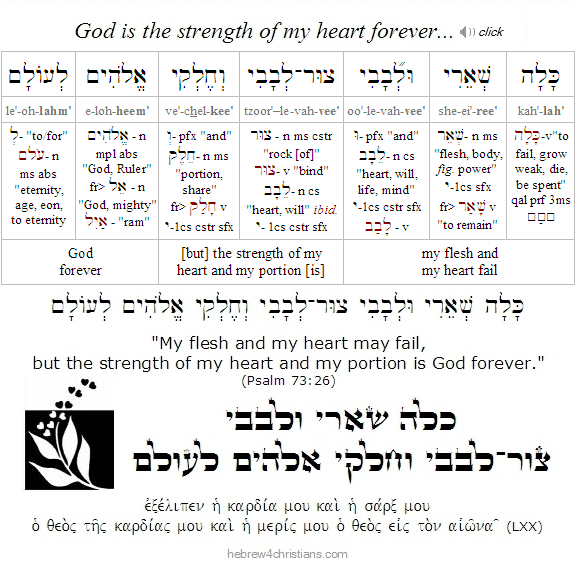 |
Breath Prayers...

03.16.22 (II Adar 13, 5782) In times of severe testing people often do not need further teaching, but rather "endurance," or what the New Testament calls hupomone (ὑπομονή), a word that means "remaining [μένω] under [ὑπο]" the Divine Presence while being tested. Suffering people do not need moral platitudes from others, but the will to believe, the resolution to stay constant, and to ability breathe out simple prayers for help to the LORD: "God have mercy..." "Help me, O God..." "I need Thee, O Lord..." When we receive grace to faithfully suffer, we hear the Spirit whispering back to us: "Be not afraid..." "Live in me..." "Walk in the light..." "I am with you always..." "You are loved..."
רפאני יהוה וארפא
הושׁיעני ואושׁעה כי תהלתי אתה
re·fah·ei'·nee · Adonai · ve·ei'·rah·fei
hoh·shee·ei'·nee · ve·ee·vah·shei'·ah · kee · te·heel·lah·tee · ah'·tah

"Heal me, O LORD, and I shall be healed;
save me, and I shall be saved, for you are my praise."
(Jer. 17:14)

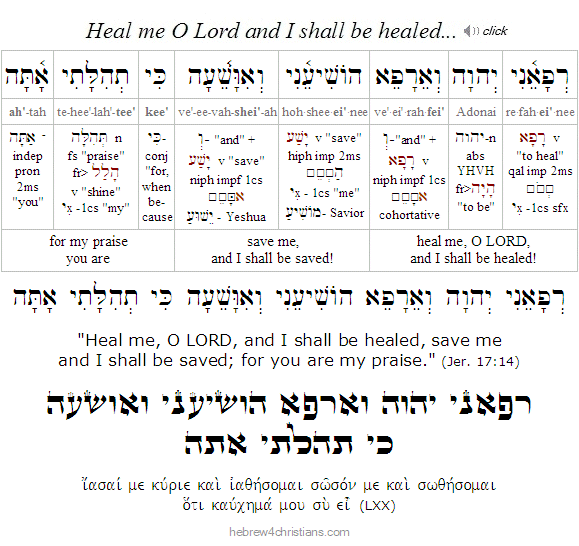
Wounds of Loneliness...

03.15.22 (II Adar 12, 5782) The late Henri Nouwen said that there are two great fears (or wounds) that we all face. The first is the fear that we were not wanted at the time of our birth into this world, and the second is that we will not be wanted at the time of our death. "Not being welcome is your greatest fear. It connects with your birth fear, your fear of not being welcome in this life, and your death fear, your fear of not being welcome in the life after this. It is the deep-seated fear that it would have been better if you had not lived" (Inner Voice of Love). If you carry a wound of abandonment within your heart - if you live in dread over your worth as a human being, seriously wondering whether it would have been better had you never been born, then you know the taste of hell itself - the emotional prison of feeling lost, defective, rejected, shameful - unable to love or to be loved...
Is not the lament of the lonely heart to find a sense of welcome, or acceptance, or peace within? Is it not the heart's cry for connection? Yet even the very gospel message cannot make traction within a heart lost to its own shame... Therefore the miracle of salvation is profoundly connected with faith that you are loved and lovable - despite yourself - and that this love derives from the core of all that truly exists. Is this not "home" in the spiritual sense? Is this not "Zion, the perfection of holiness?" That God prepares a table for you in the presence of your enemies, yea, those enemies of self-rejection, abandonment, fear, and shame? And that there - in the midst of your lost and forlorn condition you are found, treasured, and celebrated? Is not that "place" God's very heart - Jesus dying upon the cross, gasping for each breath - knowing everything about you and loving you anyway?
In our Torah reading this week (Eikev), Moses asks us to soften our hearts by remembering that we are beloved of God (Deut. 10:12-16). He reminds us that the though Lord is "the God of gods" (אֱלהֵי הָאֱלהִים) - the power that transcends the gods of our idolatry (i.e., our fears, our disordered attachments, our shame), and the "Lord of lords" (אֲדנֵי הָאֲדנִים) - the Center and Authority of what is most real, he nevertheless cares for the lowly orphan and the grieving widow - he reaches out to the needy and the abandoned - and he desires to console the "stranger," the one shattered of heart, who has no sense of belonging, no pride of tribe, nor place to lay his head (see Deut. 10:17-18). God cares about those who are lost, hurting, and alone: He came to seek and to save such from their despair...
But how does God reach the bound soul that walks alone among the tombs, cutting himself in his torment? How can he heal the deep trauma, the disassociated and broken of heart? How else but by the miracle of his intervention, quickening an otherwise numb and dead heart to come alive, to breathe in hope, and to begin to believe that - despite everything that has happened - he was wanted all along, from the very beginning, and that the wound of his sorrow was given so that he could find out who he really is and where he really belongs... The wound you were given is part of your story, and healing comes from accepting God's love for you -- and understanding how the Lord goes through the wound with you and for you...
Life in this fallen world is likened to a vapor or a passing shadow (Psalm 144:4). Nothing abides; good things here never last; and we labor under the unmentionable anxiety that death will separate us from everyone and everything we love. However, death is not the end for the us, for "love is stronger than death, passion fiercer than the grave; its flashes are flashes of fire, the very flame of the LORD" (Song 8:6).
"What will death be like?" they asked the Master. "It will be as if a veil is ripped apart and you will say in wonder, "So it was you all along!" (De Mello). Death is a most poignant homecoming, a place of joyful welcome, wherein all shall be well for ever. The righteous have an everlasting foundation in the faithful heart of God. Faith in the LORD believes that a single supreme, all-knowing, all-powerful and benevolent spiritual Power directs all things, and that Messiah is the beginning, middle, and end of all conscious meaning, truth, and substance, as it is written: כִּי הַכּל מִיָּדוֹ הַכּל בּוֹ וְהַכּל לוֹ הוּא, "For from him and through him and to him are all things" (Rom. 11:36). A life of faith in the one true God imparts the blessing of shalom (inner peace) and assures the heart that all shall be made well by the love of God. So then, "if we live, we live to the Lord, and if we die, we die to the Lord. So then, whether we live or whether we die, we belong to the Lord" (Rom. 14:8). For the believer in Messiah, death does not define us, and indeed, we trust that God will attend to us in the moment of our utmost extremity (John 5:24; 11:25-26). If we desire eternal life with all our hearts and remember our end before the Lord, we will be free of the fear of death. Amen v'amen.
Hebrew Lesson:
Psalm 40:13 reading (click):
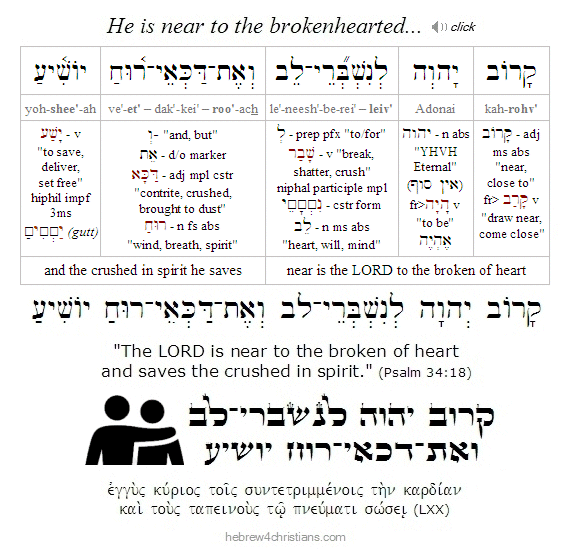 |
Note: I am still battling a fever, head congestion, and body aches. The body aches remind me of having Covid a couple months ago... very debilitating. Trusting God's care in everything. God does not always give us what we can handle, but he always helps us handle what we are given. כל אני יכול בעזרתו שׁל הנותן בי כח (Phil 4:13).
The Hidden Glory...

03.15.22 (II Adar 12, 5782) So much depends on how you look at things... Take the Tabernacle, or "Mishkan," for instance. Compared to the glories of the Egyptian pyramids, the Sphinx, the enormous temples at Thebes, not to mention other architectural wonders of the ancient world, the Mishkan must have seemed rather unimpressive and a bit underwheming. The Holy Place structure, for instance, measured just 20 x 20 cubits in size - a modest area covered in animal skins and curtains. Inside the tent structure (ohel) was placed the Menorah, the Shulchan (table), and the relatively small Golden Altar used to burn incense. The tent was further divided by a curtain (parochet) that cordoned off the Holy of Holies, a 10 x 10 cubit square section that contained the most sacred ritual object of all, namely, the Ark of the Covenant. All in all the Mishkan seemed to be a rather modest shrine when compared to the opulent structures of Egypt.
And yet it was here, hidden in plain sight, that the very Shekhinah Glory of the LORD was manifest, and it was here, in the midst of the darkness of the Holy of Holies, that the sacrificial blood was placed over the Ark that held the tablets of the law, representing our atonement in the Messiah. In the midst of the dark cloud, with the plume of incense rising, the High Priest offered up the blood "la'Adonai," designated as the Lord's, to heal us from our separation from his love and truth. And all this was a "pattern" to demonstrate the greater reality of the sacrificial death of Yeshua given on our behalf.
As the Book of Hebrews argues, Yeshua is the High Priest of the New Covenant of God, ordained of after the "order of Malki-Tzedek," the one who bears the office of High Priest not based on the Torah given at Sinai, based as it was on the weakness of the flesh, but by virtue of the power of the everlasting oath and the power of Almighty God (Psalm 110:4). As such Yeshua has made the New Covenant (הַבְּרִית הַחֲדָשָׁה) with those who trust in his sacrificial death offered for their sins. hose who belong to Him have a new altar not based on the temporary provision of the Levitical priesthood (Heb. 7:11; Heb. 13:10). And just as the humble tabernacle disguised the Divine Presence from the eyes of the proud, so the humility of Yeshua our High Priest was hidden. First he was born in obscurity and in poverty. He emptied Himself of regal glory to become "God with us," one who would bear our sorrows. For the cross at Calvary was the Altar by which His sacrificial blood was once and for all offered to secure for us an everlasting atonement (i.e., καταλλαγή, literally place of exchange: "life for life"). The cross of Messiah appears as "foolishness" to the proud eyes of this world, but to those who are saved it is the power of God (1 Cor. 1:18).
Hebrew Lesson:
Isaiah 53:4 Hebrew reading:
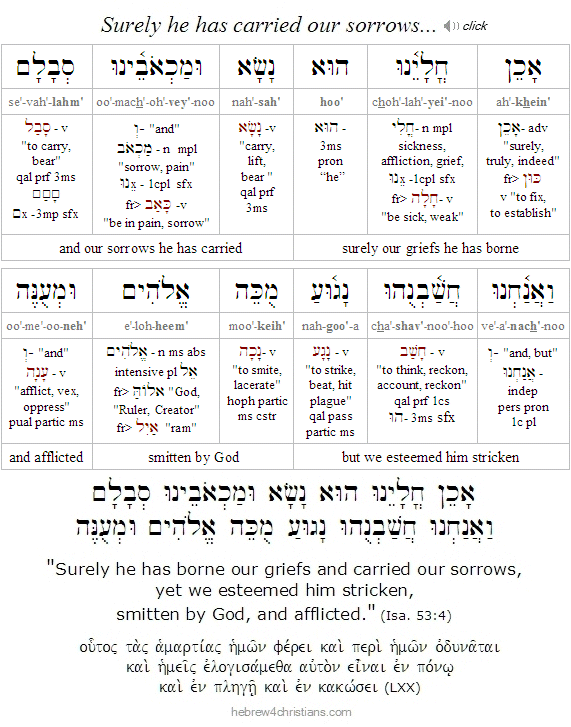 |
"Purim" in the Messiah...
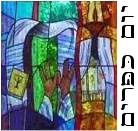
03.14.22 (II Adar 11, 5782) During Purim we read the Scroll of Esther (מגילת אסתר) and recall how the Jewish people were providentially saved from Haman's evil plot to destroy them. However it is important to know that any day that is marked by special deliverance by God may be regarded as a "personal" or "special" Purim. Therefore some Jewish families and communities observe "special purims" to commemorate the anniversary of a particular deliverance (such as the Purim of Cairo, the Purim of Tiberius, and so on).
The most significant deliverance we have comes from being set free from the guilt of our sins, of course, since this gives us true peace with God (Rom. 5:1,11). In fact, Yom Kippur (the Day of Atonement) is also known as Yom Kippurim in the Tanakh, which can be read as Yom Ke-Purim (i.e., יום, "a day" + כ, "like" + פרים, "Purim"). Therefore the day on which Yeshua sacrificed Himself on the cross is the greatest Purim of all, since through His loving intervention we are eternally delivered from the hands of our enemies. Yehi shem Adonai mevorakh (הי שׁם יהוה מברך): "Blessed be the Name of the Lord."
Hebrew Lesson:
Psalm 40:13 reading (click):
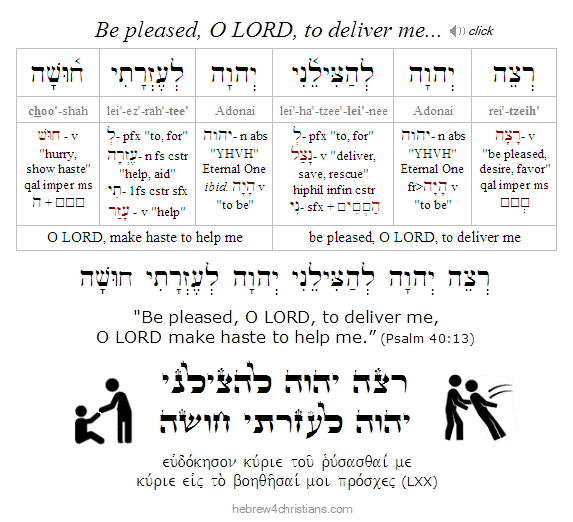 |
Signs and Wonders...

03.14.22 (II Adar 11, 5782) Regarding those who seek the services of "miracle workers," the Kotzker Rebbe is reported to have said, "There are miracles and then there are miracles... Some people regard it as a miracle if God does someone's will; we regard as a miracle if someone does God's will." Amen, a true miracle, and one greater than the splitting of the sea, is that of a transformed heart that loves God and seeks to do God's will. Similarly, some people seek signs of the times and the End of the World, though the true "end of the world" arrives the moment you truly surrender your life to God's care...
Please note I've been sick the last couple days with a high fever and congestion, etc. I will do my best, be'ezrat HaShem, to keep the posts here coming this week. - John
Getting reading for Purim...

[ The festival of Purim begins Wed., March 16th at sundown... Happy Purim Chaverim! ]
03.13.22 (II Adar 10, 5782) The Scriptures state that the holiday of Purim "should be remembered and kept throughout every generation, every family, every province, and every city; and that these days of Purim should not fail from among the Jews, nor the memorial of them perish from their seed" (Esther 9:28). According to Jewish tradition, we remember the miracles of Purim by means of four mitzvot (i.e., blessings): 1) Honoring the appointed time as directed by the Scriptures (Esther 9:26-28); 2) Performing acts of tzedakah and kindness (Esther 9:22; i.e., misloach manot: מִשְׁלוֹחַ מָנוֹת); 3) Hearing the Megillah of Esther read; and 4) Enjoying a special Purim meal together.
The Midrash Esther says that Purim, unlike many of the other holidays, will be celebrated even after the final redemption after the End of Days. Maimonides says that the Book of Esther will enjoy the same status as the Torah of Moses in the world to come (Mishneh Torah, Megillah). This is because the story of Purim -- i.e., God's covenantal faithfulness and defense of His people -- will be magnified in the deliverance that leads to the establishment of the Messianic Kingdom upon the earth. Indeed, the Second Coming of the Messiah will be regarded as the final fulfillment of Purim (Rev. 19:11-16).
Purim is all about God's irrepressible, invincible, insuperable and sovereign love for His people. Though the wicked seem to sometimes have the upper hand in olam ha-zeh (this present hour), we need not fret or become anxious (Psalm 37:1, Prov. 24:19, Phil. 4:6). God is in control and His love and purposes overrule the counsel of the wicked. He will one day speak to the princes of this dark world in His wrath and terrify them in His fury (Psalm 2:5). God's great vision for Zion, the "City of the Great King," will never fail, friends, nor will His love for those who are trusting in Him. God's sovereign love is our great hope. As King David said, בָּרְכוּ־נָא אֶת־יהוה אֱלהֵיכֶם / Barekhu-na et-Adonai Elohekhem: "Now bless the LORD your God" (1 Chron. 29:20). פּוּרִים שָׂמֵחַ / Purim Sameach: "Happy Purim" chaverim!
Hebrew Lesson:
Psalm 97:1 reading (click):
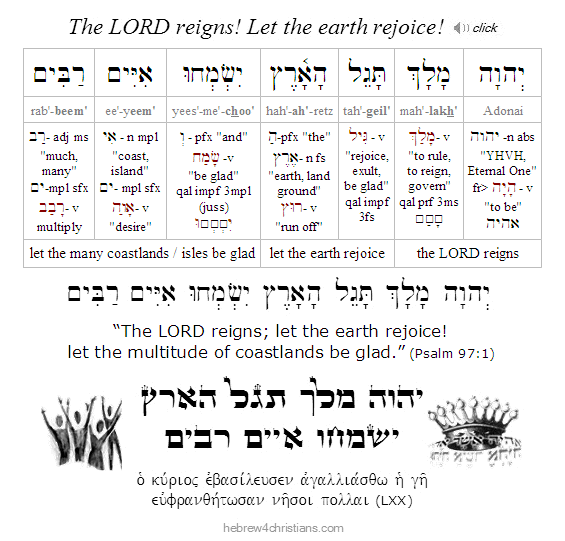 |
HAPPY PURIM CHAVERIM!
For more on the see the article: "Should Christians Celebrate Purim?"
This week's Torah reading:
Parashat Tzav - פרשת צו
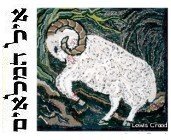
03.13.22 (II Adar 10, 5782) Shavuah tov, chaverim, and Chag Purim same'ach! Welcome to another week to study Torah and draw close to the Living God. In our Torah reading for this week (i.e., parashat Tzav) we learn how the first priests of Israel were consecrated for service by the blood of the lamb. The consecration service went like this: First Aaron and his sons were washed with water, arrayed in priestly garments, and anointed with holy oil. During this ordination ceremony, a sin offering and burnt offering were offered on their behalf, and then a special "ram of ordination" (i.e., eil ha-milu'im: איל המלאים, lit. "ram of abundance [מָלֵא]") was slaughtered. Some of this ram's blood was applied to the right ear, right thumb, and big toe of the Aaron and his sons (a picture of Yeshua as our suffering High Priest), and the rest of the blood was dashed upon the sides of the altar. After its slaughter, Moses took some unleavened bread and put it in the hands of the priests to perform tenufah (a wave offering) before the altar (a picture of the resurrection).
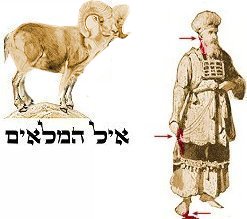 |
As followers of Yeshua, we too have been anointed with the blood from the "Ordained Lamb" -- Yeshua as our Kohen Gadol of the better covenant (Heb. 8:6). And we too have been anointed with the sacred shemen (oil) that symbolizes the presence and aroma of the LORD in our lives. As followers of Yeshua we are therefore truly "...a chosen race, a royal priesthood, a holy nation, a people for his own possession, that you may proclaim the excellencies of him who called you out of darkness into his marvelous light" (1 Peter 2:9). As Yeshua said: "You did not choose me, but I chose you and appointed you that you should go and bear fruit and that your fruit should abide, so that whatever you ask the Father in my name, he may give it to you" (John 15:16). May the LORD God of Israel be pleased to help you serve Him in the truth...
God's Word of Love...

[ "Let me seek you in the darkness of my silence, and find you in the silence of Your light, which is love shining as the sun, flowing like the river, and joying like the heart." - Meister Eckhart ]
03.13.22 (II Adar 10, 5782) In moments of testing, but especially in your failures, heed the voice of God's compassion (מילות רחומות). Use the "good eye" (עַיִן טוֹבָה) to see how the Spirit draws you close in your weakness, calling you to return from your self-imposed exile, welcoming you back to the Divine Presence. Note that the good eye (ayin tovah) is also called the "beautiful eye" (עין יפה), since it sees beauty even in ashes... Do not turn away from God's plea for your comfort; know that God is love (Exod. 34:6; 1 John 4:16); He is light (1 John 1:5), and He is forever with you as your Savior (Isa. 41:10; Matt. 28:20). Using the "beautiful eye" means refusing to think evil about others (including yourself); it "does not impute the bad" - οὐ λογίζεται τὸ κακόν (1 Cor. 13:5) but rejoices in the truth – even if that truth is found only in the hope of a future good (1 Cor. 13:7; Rom. 8:24). Yeshua told us, "The eye is the lamp of the body. So, if your eye is good (i.e., ἁπλοῦς, sincere, heartfelt, compassionate), then your whole body will be full of light" (Matt. 6:22).
כִּי־טוֹב חַסְדְּךָ מֵחַיִּים
שְׂפָתַי יְשַׁבְּחוּנְךָ
kee · tohv · chas·de·kha · mei·chai·yeem
se·fa·tai · ye·sha·be·choon·khah

"Because your lovingkindness is better than life,
my lips will praise you."
(Psalm 63:3)

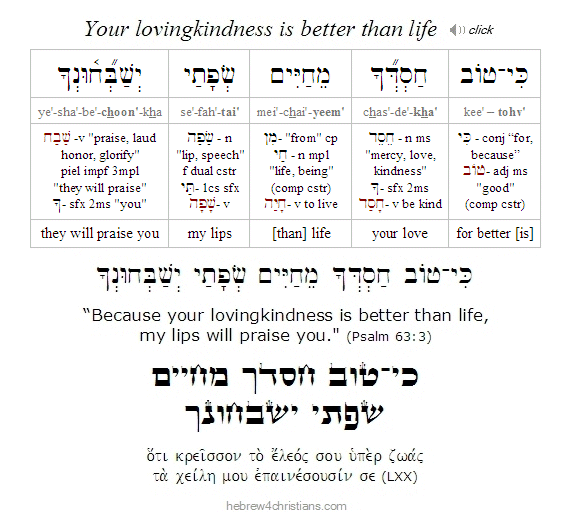
The Secret Place of God...
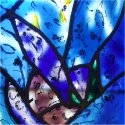
03.11.22 (II Adar 8, 5782) One of the great Hebrew names of God is El Elyon (אֵל עֶלְיוֹן), often translated as "God Most High." The name first appears in the Torah regarding the mysterious figure of Malki-Tzedek (מַלְכִּי־צֶדֶק), the timeless king and priest of Zion who served "bread and wine" to our father Abraham – alluding to the sacraments later used to commemorate our redemption (Gen. 14:18). As the timeless king and priest of God, Malki-Tzedek is a "theophany," or a revelation of the LORD our God Yeshua before He emptied Himself and made his descent to this world (Phil. 2:7; Heb. 7:3). Yeshua is our great King of Kings and High Priest of the New Covenant, a better covenant that restores the kingship and priesthood back to God Himself (Heb. 7:12).
Now the Hebrew term "Elyon" itself (עֶלְיוֹן) comes from a root word (עָלָה) that means "to ascend" or "to lift up." For instance, an "olah offering" (עלָה) is a whole burnt offering that ascends upward to heaven, and "aliyah" (עֲלִיָּה) means "going up" to the land of Israel. The word "Elyon," then, expresses the truth that the LORD is the Resurrected One who overcame all the powers of hell and utterly vanquished death's power. In other words, Elyon is a name for the LORD our God Yeshua.
ישֵׁב בְּסֵתֶר עֶלְיוֹן
בְּצֵל שַׁדַּי יִתְלוֹנָן
yoh·sheiv · be·sei·ter · Elyon
be·tzeil · Shad·dai · yeet·loh·nahn

"He who dwells in the secret place of the Most High
will abide in the shadow of the Almighty."
(Psalm 91:1)

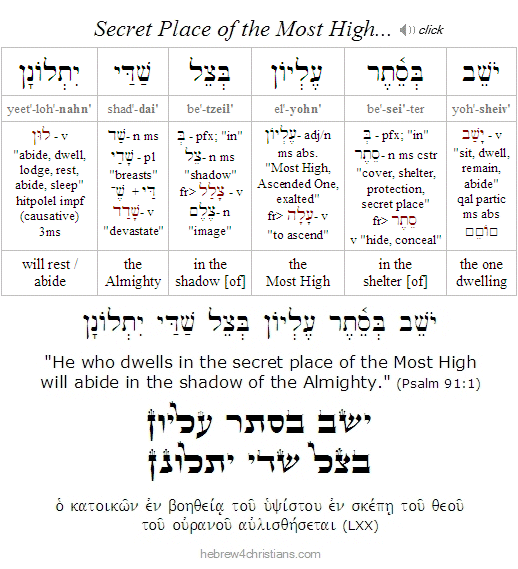
The sages say that Moses wrote Psalm 91 as he dwelt in the secret place (סֵתֶר) of the Most High God, in the "midst of the dark cloud" (Exod. 24:18), a place of sacred and holy concealment. The thick clouds are a "hiding place" for him (Job 22:14). Notice that the one who "abides" in the secret of the Most High dwells in an ascended place of rest – being lifted up above the surrounding madness of this fallen world of flux and shadows. The Hebrew word means to lodge or to "sleep" (לִין), connecting it metaphorically with death and resurrection. By dwelling in the death and resurrection of Yeshua, God will shield you with His Presence and make evil powerless before you.
אמַר לַיהוָה מַחְסִי וּמְצוּדָתִי
אֱלהַי אֶבְטַח־בּוֹ
oh·mar · Ladonai · mach·see · oo·me·tzoo·dah·tee
E·loh·hai · ev·takh-boh

"I will say to the LORD, [who is] my refuge and my fortress,
'[you are] my God, in whom I trust.'"
(Psalm 91:2)

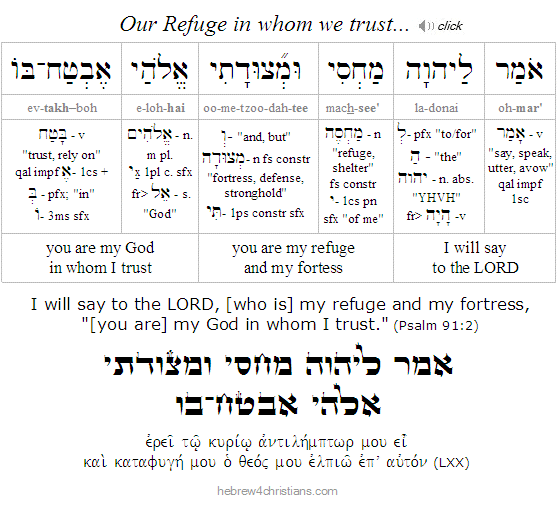 |
Since God hides Himself in this world (Isa. 45:15), we must humbly seek His face to enter into the place of His holy concealment in all things. God is Elyon – High above - but He dwells "with the lowly and the broken of heart" (Isa. 57:15). Therefore the LORD our God is called Shaddai (שַׁדַּי) – our Sustainer, Provider, Refuge, and Home. Just as we can be surrounded by the "shadow of death" (tzal mavet), so we can be surrounded by the "shadow of Shaddai" (tzal Shaddai). Like a powerful eagle brooding over her chicks, so Shaddai covers you with wings of protection (Psalm 91:4).
When you "abide" in the secret of Elyon - the Ascended One - you are concealed by the dark clouds of His Glory, and the Presence of Shaddai overshadows you... The LORD will save you from the ensnaring trap and from the devastating pestilence (Psalm 91:3). By abiding in the truth that God's Presence pervades all things at all times - you become a "stranger" (גֵּר) with the LORD in this world, a "sojourner" (תּוֹשָׁב) who awaits the recompense of the wicked and the healing of the world at the end of the age. "You will tread on the lion and the adder; the young lion and the serpent you will trample underfoot" (Psalm 91:13).
For more on this wonderful topic see: "Secret of the Most High."
 |
The shade at your right hand...
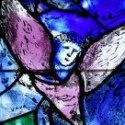
03.11.22 (II Adar 8, 5782) When we forget that God is in complete control of all things, we tend to grow anxious... Feeling worried comes from focusing on ourselves, a perspective that can make us feel alone, forgotten, and even victimized in this world. Worry moves us to defend ourselves, to seek refuge in our own devices, and to forfeit the will of God according to the will of lesser fears... The sages say it is not permitted to worry: "To worry is a sin; only one sort of worry is permissible; to worry because one worries." We should worry that we worry because this indicates our hardness of heart and our unbelief! God's name YHVH (יהוה) means "Presence," "Breath," "Life," and "Love." So why be anxious for "tomorrow"? We really only have this moment, but this moment is entirely sufficient when we walk in the light of God and seek to know him in all our ways. "Let the peace of God rule in you" (Col. 3:15).
Where it says, "The LORD is your protector; the LORD is the shade at your right hand" (Psalm 121:5), note that God's Presence is likened to the shadow (צֵל) cast by someone who walks closely beside you, holding your hand (Psalm 23:4). Your "right hand" (יְמִינֶךָ) refers to your decision to "see the unseen" by performing acts of righteousness in this world: the blessing of God is then cast upon all you do (Deut. 2:7; Psalm 1:3). Neither does God "slumber or sleep," for the LORD your Guardian (יְהוָה שׁמְרֶךָ) is fully awake, full of life, insuperable power, and divine action! Our help comes from the LORD, "oseh shamayim va'aretz" (עשֵׂה שָׁמַיִם וָאָרֶץ) - the Maker of heaven and earth.
יְהוָה שׁמְרֶךָ
יְהוָה צִלְּךָ עַל־יַד יְמִינֶךָ
Adonai · shohm·re'·kha
Adonai · tzee·le·kha · al-yahd · ye·mee·ne'·kha

"The LORD is your Protector;
the LORD is the shade at your right hand."
(Psalm 121:5)

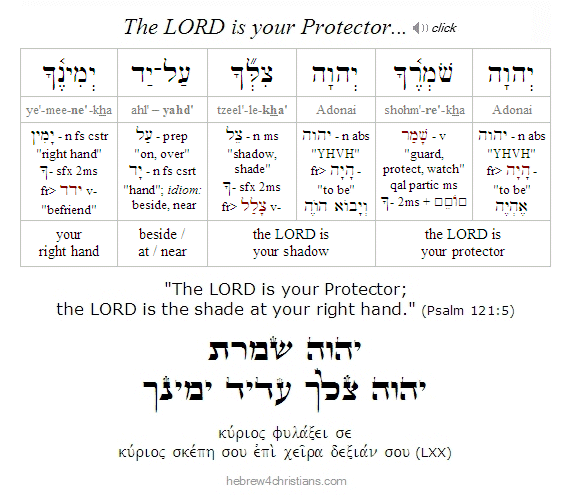 |
Where it is written in the Book of Genesis, "Let us make man in our image and likeness (בְּצַלְמֵנוּ כִּדְמוּתֵנוּ), we note that the word "image" (i.e., tzelem: צֶלֶם) comes from the word tzel (צֵל), meaning "shadow," thus suggesting that man was originally created to cleave to God as closely as a shadow follows its Substance. And just as a shadow resembles its originating substance, so man was to resemble the reality of the Divine Presence in this world. The New Testament reveals that essential purpose of the redeemed life is to become conformed (σύμμορφος) to the image and likeness of Yeshua (Rom. 8:29, 1 Pet. 2:21). "Just as we have borne the image of the man of dust, we shall also bear the image of the man of heaven" (1 Cor. 15:49). The work of the Spirit is "Messiah in you - the hope of glory" (Col. 1:27). The question therefore isn't, "do you accept Yeshua as your Savior" as much as it is, "Does Yeshua live inside your heart?"
Hebrew Lesson
Psalm 63:4 Hebrew reading (click):
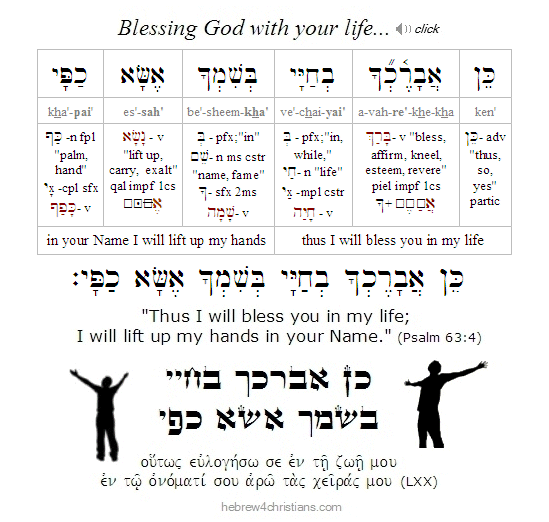 |
The Torah of Sacrifices...
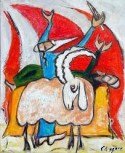
03.11.22 (II Adar 8, 5782) Our Torah portion this week (i.e., Vayikra) begins with the Lord calling out to Moses to explain the "laws of korbanot" (תורה של קרבנות), or how the people could draw near to him. Note that the root of the word korbanot, often translated as "offerings" or "sacrifices," is karov (קרוב) which means to come close, to enter into, or to approach. The korbanot, or sacrifices, were meant to bring us closer to God, and the central sacrifice at the altar was that of a defect-free male lamb offered daily, called korban tamid (קָרְבַּן תָּמִיד), or the "perpetual sacrifce." Unlike other sacrifices that may be offered at the altar, the korban tamid was continually offered by God Himself in commemoration of the great Passover redemption wherein the blood of the lamb was offered on behalf of Israel. Like the cross of Messiah our Passover (משיח פסח שלנו), God provides the Lamb and by this grace He enables access to the divine presence for blessing and eternal life...
Other sacrifices, such as the "chatat" (חטאת) or sin offering, required the offerer to place his hands on the head of the animal, leaning on it will all his might, as he confesses his wrongdoing and expresses his desire to return to God. This procedure is called "semichah" (סמיכה) and the confession is called "vidui" (וִדוּי). Immediately following this the animal is led away to be ritually slaughtered (i.e., shechittah: שחיטה) and the blood was caught in a basin and then dashed upon the altar by the designated kohen (כּוֹהֵן), or priest.
Various other korbanot are mentioned in our reading, including the "olah" (עולה), or "ascending" offering wherein the kosher animal is entirely burned on the altar; the "shelamim" or "peace" offering (קרבן שלמים) given for celebratory events or to give thanks (תודה); the "asham" or guilt offering (קרבן אשאם) which is a type of sin offering that is more serious and involves restitution for wrongdoing. Note that for each of these offerings, if an offerer is too poor to offer an animal for sacrifice, the "minchah" (קרבן מנחה), or prepared flour offering, or the "ohf" (קרבן עוף), a bird (i.e., pigeon or dove) sacrifice was acceptable.
Note that the original Passover sacrifice (קרבן פסח) was not given to the Levitical priesthood as a sin offering, since it preceded Sinai and the giving of the various laws concerning the Mishkan/Temple sacrificial rites. In the same way, Yeshua's sacrifice was directed from Heaven itself by means of the prophetic office of Malki-Tzedek (מַלְכִּי־צֶדֶק) - a higher order of priesthood (Gen. 14:18; Psalm 110:4; Heb. 7). Yeshua both offered Himself up as the "Lamb of God" that causes the wrath of God to (eternally) pass over those who personally trust in Him, and He also offered himself as the "Goat of God" whose blood was sprinkled in the Holy of Holies to cleanse us from sin and give us (everlasting) atonement. (Other metaphors are also given in Scripture, for example, Yeshua offered Himself as a Snake lifted up (John 3:14-15; cp. Num. 21:4-9), as a Red Cow (parah adumah), and so on).
For Yom Kippur (יום הכיפורים), or the "Day of Atonement," two goats were required: one goat was for blood sacrifice in the Holy of Holies (the Goat of the LORD) and the other was used as a "scapegoat" for the sins of the community (the goat of Azazel). The Gospels seem to emphasize the connection between Yeshua as the "Lamb of God who takes away the sins of the world" with Passover/Exodus more than the connection between Yeshua as the "Goat of the LORD" whose blood was sprinkled upon the Mercy Seat with Yom Kippur - though the author of the Book of Hebrews explicitly makes this connection (Heb. 9:11-12; 24-ff).
It may seem like the details of the various sacrifices are tedious and even boring to read, but the deeper truth of what they represent is nothing short of amazing. Yeshua as the "Lamb of God" pictures personal redemption from slavery to Satan and freedom from the wrath of God. This is the greater Passover/Exodus connection. By means of Yeshua's shed blood and broken body, the wrath of God passes over us and we are set free to serve Him.... Yeshua as the "Goat of God" pictures both personal cleansing (i.e., "propitiation" or "expiation" for our sins: the Greek word (ἱλαστήριον) is used in the LXX for the kapporet (Mercy Seat) in the Holy of Holies which was sprinkled with the blood of the sacrifice on Yom Kippur) as well as national teshuvah and cleansing for ethnic Israel at the end of the Great Tribulation period. At that time Yeshua will function as Israel's true High Priest whose sacrifice is applied for Israel's Atonement. This is the Yom Kippur connection.
Hebrew Lesson
Psalm 4:5 Hebrew reading (click):
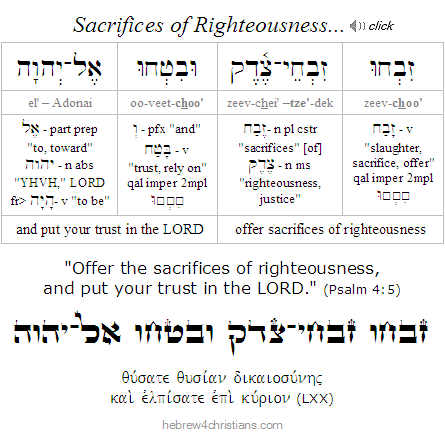 |
Related Topics:
Believing to See...

03.11.22 (II Adar 8, 5782) Thinking about faith is an effect of the act of faith itself. We don't live and die for theological abstractions, but rather because we have been touched by God Himself... We sense the unseen beauty and glory behind everything, we encounter God in our our prayers, in deliverance from fear, in tender assurance from the Holy Spirit. We walk by faith, and walking is a matter of doing. As we believe we begin to see the abiding in the transitory, the invisible in the visible, and the glory that pervades all things.
Hebrew Lesson
Psalm 27:13 Hebrew reading (click):
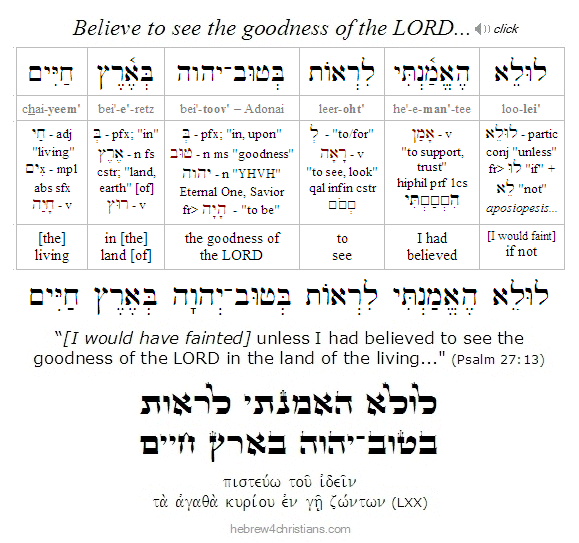 |
"I would have fainted unless I had believed to see the goodness of the LORD..." (Psalm 27:13). Faith is therefore self-authenticating: as you trust in the good, the good will be revealed: believe to see! As Yeshua said, "According to your faith be it done unto you" (Matt. 9:29). And if it is faith that makes you whole, then its lack makes you sick... As you doubt, so you will lose sight of what is real, true, and abiding. Being cynical is cowardly: "There are two ways to be fooled. One is to believe what isn't true; the other is to refuse to believe what is true" (Kierkegaard). The cynic refuses the possibility of truth because he is afraid of being fooled, and for this fear he willingly closes his eyes to the good. "Believe that life is worth living, and your belief will help create the fact" (James). When we trust God's promises, we affirm an unseen good even if the present hour is shrouded in darkness. Faith sees beyond "the seen" to the unseen (2 Cor. 4:18). The "seen" is not ultimately real, and consequently faith is exiled from the vanity of the present hour (עולם השקר ). Therefore affirm your faith, dear friend; do not allow your heart to waver. Refuse the darkness of fear by choosing to believe in the reality of God's love for your soul, despite the mess you've made of your life. Affirm that God's love is more real, more substantive, and more valuable than anything disclosed in this world that fades away. Amen.
 |
The Vanity of Reason...

03.11.22 (II Adar 8, 5782) "It is the heart that senses God, and not the reason. That is what faith is, God perceptible to the heart and not to the reason" (Pascal). Amen, "reason" cannot believe in God because, like Noah's dove that returns for lack of place to rest its sole, reason has no place to stand but always must flutter about seeking its footing. Faith, on the other hand, steps out into the unknown and finds its place in God's promise. Therefore, "Since God in his wisdom saw to it that the world would never know him through human wisdom, he has used our foolish preaching to save those who believe" (1 Cor. 1:21).
Hebrew Lesson
Job 13:15 Hebrew reading:
Hidden in Plain Sight...

03.10.22 (II Adar 7, 5782) Shalom friends. The festival of Purim begins Wednesday, March 16th at sundown this year. During this time we revisit the Book of Esther and joyfully recount how God providentially cares for his people...
Although the Name of God is not explicitly mentioned in the Book of Esther, the story is essentially about revelation, that is, the disclosure of God's Presence despite His apparent concealment. The phrase hester panim (הֶסְתֵר פָּנִים) means "hiding of face" and is often used when discussing the divine providence. God's plan is being fulfilled, step-by-step, even if it is hidden within the "natural" world of human beings and their choices (Jer. 10:23; Prov. 21:1). The LORD is Ha'mashgiach (i.e., הַמַּשְׁגִיחַ, the supervisor) of all things - from the motions of subatomic particles to the great events of the cosmos. He not only calls each star by its own name (Psalm 147:4), but knows each particular lily and sparrow (Matt. 6:28-30, 10:29). Indeed, each person is under the direct, personal supervision of God Himself (הַשְׁגָּחָה פְּרָטִית) -- whether he or she is conscious of this or not. As Yeshua said, even the hairs on your head are all numbered (Matt. 10:30).
גָּדוֹל יְהוָה וּמְהֻלָּל מְאד
וְלִגְדֻלָּתוֹ אֵין חֵקֶר
gah·dohl · Adonai · oo·me·hoo·lahl · me·ohd
ve·leeg·doo·lah·toh · ein · chei'·ker

"Great is the LORD, and greatly to be praised,
and his greatness is unsearchable." (Psalm 145:3)
Download Study Card

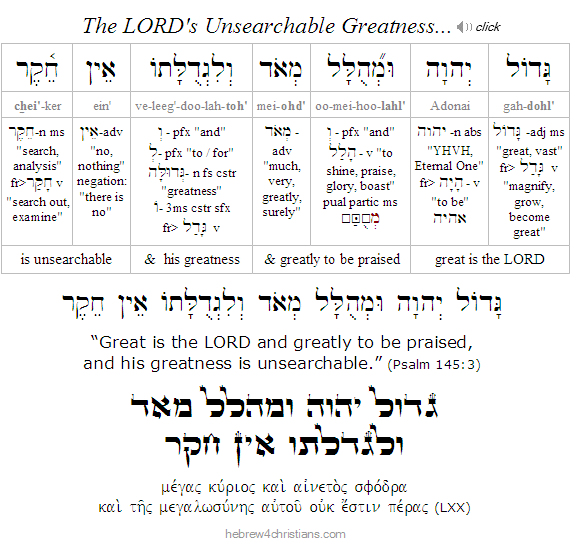
The Apostle Paul taught that God "chose us [εκλεγομαι] in the Messiah before the foundation of the world" (Eph. 1:4). God called you by name -- before He created the very universe itself. "God has chosen you from the beginning for salvation through sanctification by the Spirit and faith in the truth" (2 Thess. 2:13). God loves you with an "everlasting love" (אַהֲבַת עוֹלָם) and with lovingkindness (i.e., chesed, חֶסֶד) draws you to Himself (Jer. 31:3). There is no fear in God's sovereign and irresistible love for your soul (1 John 4:18). "If God is for us, who can be against us?" (Rom. 8:31).
Note: For more on this topic, see "Theology, Paradox, and Purim."
His Invincible Purposes...
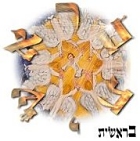
03.10.22 (II Adar 7, 5782) When you are tested, affirm your confidence. Spiritually speaking, the first step is to find hope... The Divine Light is seen by the eye of faith (עין האמונה), and therefore we find strength by trusting in God's Presence, even though we cannot presently see Him (2 Cor. 4:18; 5:7). "Trust in the LORD with all your heart, and do not lean on your own understanding. Know Him in all your ways, and He will straighten your paths. Be not wise in your own eyes; fear the LORD, and turn away from evil" (Prov. 3:5-7). Wait on the LORD and He will strengthen your heart....
We must remain steady as we fight the "good fight of faith." This is the struggle against the lie that God does not care for us and that we are therefore abandoned and on our own. We must repudiate fear and boldly lay hold of the promises of God; we must take every thought captive to the reality of God's love for us in Yeshua. As it is written, "The LORD is my light and my salvation; whom shall I fear? The LORD is the stronghold of my life; of whom shall I be afraid? When the wicked come upon me to devour my flesh, when my adversaries and enemies attack me, they will totter and fall. Even if an army is deployed against me, I will not fear; even if war is rises against me, I will remain full of trust" (Psalm 27:1-3).
The Midrash says, "The Holy One Himself, as it were, made light for the upright. Thus it says, "The LORD is my light and my salvation" (Psalm 27:1) and "When I sit in darkness, the LORD will be a light to me" (Micah 7:8). While I sit in darkness in this world, during these latter days before the promised return of Yeshua, when troubles may afflict me and lawlessness may abound – then God's light will shine brighter still, for the LORD is gracious to all who put their hope in Him, and this favor and love will be manifest for me.
Whenever I feel anxious or downcast, I need to meditate upon the greatness of God and his invincible power. His will is sovereign and no one and nothing can ever thwart his plans and purposes for our good (Rom. 8:28). Let us therefore renew our confidence in Him: The darkness of this world forever is swept back before the overmastering radiance and power of Yeshua, the King of Glory, the Root and Descendant of David, and the Bright Morning Star (Rev. 22:16). Those who believe in Him are given the "light of life" that overcomes the darkness of this world (John 8:12). We are made "more than conquerors" through the One who loves us. Nothing can overrule God's plan for our salvation, as it says: "The purpose of the LORD endures forever, the thoughts of his heart are to all generations" (Psalm 33:11).
Hebrew Lesson
Psalm 33:11 Hebrew reading:
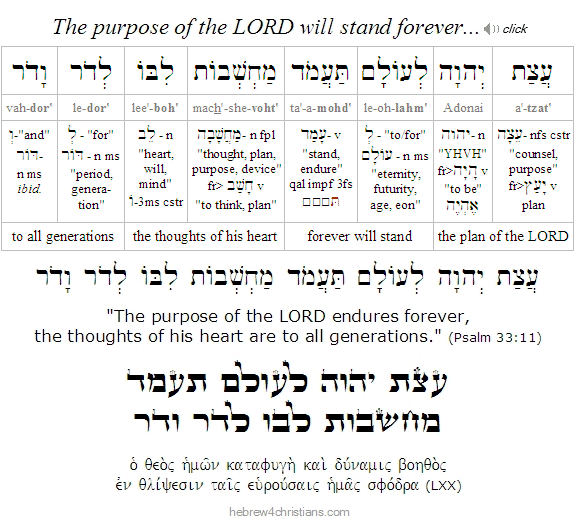 |
As we draw closer to the "end" of the "End of Days" it is important not to let our hearts grow cold or numb with fear... The devil uses mass media, the realm of politics, and stupefying "news" propaganda of this world (i.e., κόσμος) to incite the workers of iniquity to do his bidding, tempting believers in the LORD to feel discouraged, overrun with evil, and increasingly marginalized in their faith... But take heart, chaverim: the victory has already been won; God's truth will forever prevail (1 Cor. 15:57). Always remember that there is more power in one simple and heartfelt prayer before heaven than all the schemes and armies of the wicked combined. All those who are "fathered by God" conquer the world, since God imparts to us the victory of faith by means of His powerful Spirit (1 John 5:4). Therefore the heart of faith says, "In all these things [afflictions, tribulations, etc.] we are 'more than conquerors' (lit., "hyper-conquerors," i.e., ὑπερνικῶμενfromὑπέρ, "hyper" + νικάω, "to overcome") through Him that loved us (Rom. 8:37). So do not lose heart. Don't believe in the matrix of this world. Time is short; the hour approaches... "Have no fear of them, for nothing is covered that will not be revealed, or hidden that will not be known" (Matt. 10:26). Amen.
 |
His Mercy and Truth...

03.09.22 (II Adar 6, 5782) Of the thirteen attributes revealed to Moses that defined the Name י־ה־ו־ה (Exod. 34:6-7), two are joined together. The LORD is rav chesed ve-emet (רַב־חֶסֶד וֶאֱמֶת), abundant in lovingkindness and truth, indicating that his love is always the Center of Reality... In other words, just as God's Name means "Presence" and "Breath," it also means "Compassion," "Love," "Life," and "Faithfulness." As Yeshua testified: "I AM Aleph and Tav, the beginning and the ending," says the LORD God (יְהוָה אֱלהִים), "the One Who is, and Who was, and Who is to come (הַהוֶה וְהָיָה וְיָבוֹא), the LORD of Hosts" (Rev. 1:8).
It's been said that the ancient Greek mindset regarded what is beautiful as what is good, whereas the Hebraic mindset regarded what is good as what is beautiful. The difference is fundamental. Doing our duty before God, trusting his heart, in other words, is what is truly beautiful, not merely appreciating the appearance of symmetry, order, balance, and so on. This explains why moral discipline (i.e., musar, מוּסָר) is so prominent in Hebrew wisdom literature. In the spiritual sense, beauty cannot exist apart from moral truth, and moral truth cannot exist apart from "doing the truth" through acts of righteousness...
Hebrew Lesson:
Psalm 25:10 Hebrew reading lesson (click):
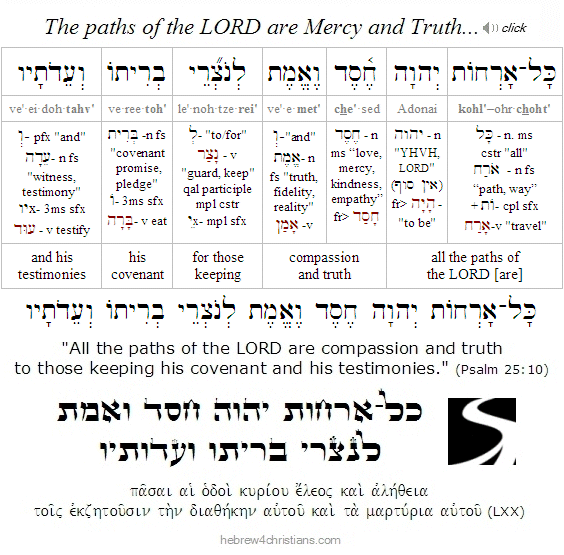 |
There is no truth or reality apart from the Presence of the LORD God of Israel, Adonai Shammah, the Source and Center of all things. God is the origin of all light, energy, and magnetism of the universe... Logic is the grammar of being "hardwired" into intelligibility...
Hiddenness and Disclosure...
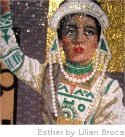
[ The holiday of Purim occurs Wednesday, March 16th (at sundown) this year and runs through the following day. Chag Purim Sameach, chaverim! ]
03.09.22 (II Adar 6, 5782) The sages extol the importance of the holiday of Purim because it reveals the hidden hand of God, despite his apparent absence in the affairs of this world... On the surface, each turn of the story could be explained naturally, or as simple "coincidence," yet in the end we realize that God was at work behind the scenes, carefully putting together deliverance for God's people. The eye of faith trusts in God's providential plan, despite appearances to the contrary. Indeed, the phrase hester panim (הֶסְתֵר פָּנִים) means "hiding of the face" and is often used when discussing the Book of Esther. Understood as hidden providence, hester panim is somewhat like the sun on an overcast day: Just because you don't see it doesn't mean it isn't there. God's great love is at work at all times, in all affairs of the universe, whether we perceive it or not.
Hebrew Lesson:
Psalm 47:7 Hebrew reading with commentary:
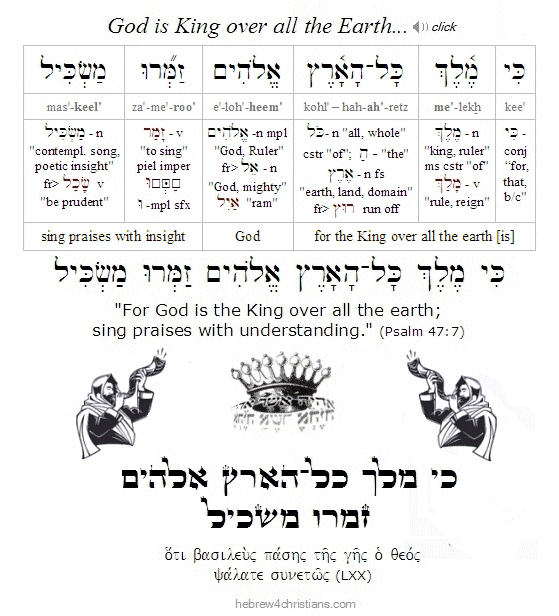 |
In anticipation of the coming holiday next week, let me wish you and your family Purim Sameach (פורים שמח) -- with the prayer that you will stand true to your faith, despite this wicked world and its syncretizing influences. Hooray for Mordecai! -- may the LORD raise up many like him! Be strong and of good courage, friends.
HAPPY PURIM CHAVERIM!
For more information see the article: "Should Christians Celebrate Purim?"
The Thirst for Life...

03.09.22 (II Adar 6, 5782) Spiritually speaking, there are two basic sorts of breaking. One is to be broken by the inevitable sin and ruin of this world, and the other is to have "lev-nishbar," a broken heart, before the LORD (2 Cor. 7:10). The former comes from the vain attempt to find life in the broken vessels of this world (Jer. 2:13), whereas the latter comes from the realization of an incurable inner emptiness (Matt. 5:4). The soul finds eternal satisfaction desiring God's righteousness, since God alone provides the vessel of "living water" we need to live (John 4:14; 7:38). We all must drink from God's fountain of life, lest we suffer spiritual dehydration and death. All who are thirsty, come to the waters...
Are you haunted by an inner ache for love, joy, peace, and life? "Blessed are those who hunger and thirst for righteousness, for they shall be satisfied" (Matt. 5:6). Such inner poverty is a disguised grace, and the desire for healing reveals the Spirit's invitation. Faith begins with the recognition of what we really want, since only then will we come to Yeshua for the "bread of life" and "living water." All we need is found in him, though we must reach out in faith to receive: "For without faith it is impossible to please him, for whoever would draw near to God must believe that he exists, and that he rewards those who seek him" (Heb. 11:6). God rewards those who seek him out; he answers the heart's cry; he responds to all who hope in his love and salvation. Therefore, as Yeshua said: "Ask, and it will be given to you; seek, and you will find; knock, and it will be opened to you. For everyone who asks receives, and the one who seeks finds, and to the one who knocks it will be opened" (Matt. 7:7-8). We are not saved by faith in our own faith, but in the Reality and Power of the LORD God who does the miracle of raising the dead to newness of life.
Do you have the "gift of holy desperation"? That's the very special blessing of needing God so viscerally that you otherwise will fall apart or even self-destruct apart from His ongoing intervention in your life... You pray because your very life depends on it; you believe because without God, you would be swallowed up in darkness. The fire on the altar was to be kept burning at all times (Lev. 6:12-13) symbolizing the "inner fire of the heart." How blessed it is to be full of the fire of this inner need, this relentless groaning, this constant hunger and thirst for God and his righteousness! How fortunate we are to receive daily bread from the hand of our heavenly Father. King David cried out to the LORD: "I stretch out my hands to you; my soul thirsts for you like a parched land," which is the answer to God's own love for David, and indeed for all of us. The Lord stretches out his hands to us upon the cross; he desperately thirsts for us to return to him and to know the depths of his love...
Here is something we may overlook when we think about the relationship between the law of God and his grace. Sorrow for sin does not arise when we realize we have violated a lawcode, but when once we realize how we have wounded the heart of our Heavenly Father by turning away from His love... God demonstrates his great passion for us as he stretches out his hands to us in love; he thirsts for our communion with him!
Hebrew Lesson:
Psalm 143:6 Hebrew reading:
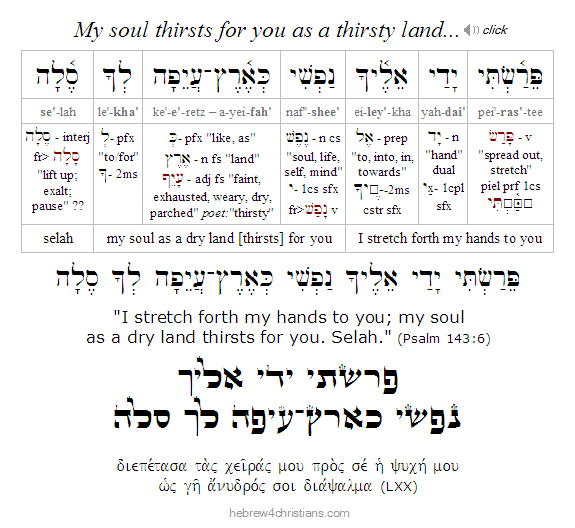 |
Beyond these Shadows...

03.08.22 (II Adar 5, 5782) Long before the time of the philosopher Plato, King David proclaimed that there was a "divided line" between the realm of the temporal world and realm of the eternal world. The temporal world is finite, subject to change, and points beyond itself to an eternal world which is the source of real significance and truth. Nevertheless, the temporal world (olam ha'zeh) is not unimportant, since how we live within the intersection of these two realms defines our posture of faith, determining our ultimate destiny... Unlike life-denying religions, we do not detach from this world, though neither do we cling to it as our home, but we are constrained to live in the paradoxical mediation of time within eternity (Rom. 8:20). In a sense, then, life in this world is a test that asks the us the question of whether we will choose to believe in the reality of love, healing, and heaven. Yes there is heartache here; yes we are in exile, at times we are profoundly lonely. We often experience the world as darkness (עוֹלָם הַשֶׁקֶר). Should we despair then, since the "outer self" returns to dust even though our "inner self" is renewed by faith (2 Cor. 4:16)? No, since God loves life and indeed the invitation of the gospel appeals to our desire to find life: darshuni vichyu: "Seek me and live" (Amos 5:4). Our ultimate concern is to "find God or die."
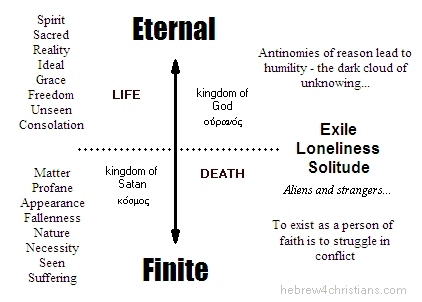 |
Surely the Lord understands our great need for healing and life, and therefore the dualism of the self and the fractured nature of reality imparts within us a sense of imbalance and even trembling as we sojourn through the "valley of the shadow of death" (Phil. 2:12). We nevertheless press on as "strangers and sojourners" (ger v'toshav), for the illusions of this world are nothing for us, and with a deep sigh of the heart we look for the completion of our redemption, our promised heavenly home. This is often difficult to do as we must both endure the vanity of this world while keeping our minds focused on what is real, true, and abiding. Like Abraham who "did not weaken in faith when he considered his own body, which was as good as dead, but was fully convinced that what God had promised he was also able to do (Rom. 4:19-21), we must take hold of the words of our Savior, who said: "I give you eternal life, and everyone who lives and believes in me shall never die" (John 11:26). Friend take heart, "for our citizenship is in heaven, and from it we await the Savior, the LORD Yeshua the Messiah, who will transform our lowly body to be like his glorious body by the power that enables him to subject all things to himself" (Phil. 3:20-21). Therefore stand firm in the LORD and the power of his might. Amen.
Hebrew Lesson:
Psalm 39:12b Hebrew reading:
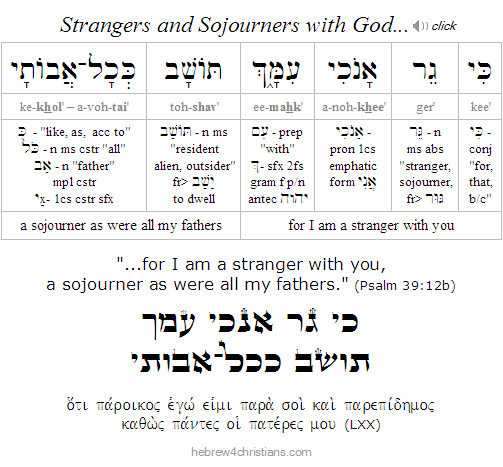 |
The Circle of Communion...
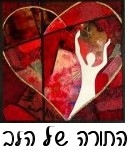
[ "When I am in the wrong mind, I presume that you desire my goodness, but when my mind turns aright, I find that you want nothing of my deeds and everything of my heart." - Eckhart ]
03.08.22 (II Adar 5, 5782) Shalom chaverim. It is written in the Torah that the LORD spoke to Moses 'face to face' (i.e., panim el panim: פָּנִים אֶל־פָּנִים), "as a man speaks to his friend" (Exod. 33:11). During the heartache of his long pilgrimage "to the heavenly city" Moses had appealed to the LORD: "You have said to me - yadati'kha ve'shem ve'gam matza'ta chen be'einai - 'I know you by name and you have found grace in my sight...' now therefore, if I have found grace in your sight, please show me now your ways, that I may know you in order to find grace in your sight" (see Exod. 33:12-13).
I love this roundabout plea of the heart: "If I have found grace in your sight let me know You in order to find grace in your sight." What a beautiful circle of communion: it is all of grace, beginning with God's love, sustained by God's love, and completed by God's love. To know God in the truth, to have "face to face" communion with God, therefore means being able to speak to God freely from the heart, without fear of being rejected or abandoned: "If I have found grace in your sight" – that is, if I am accepted within your heart – then let me know this very thing so that I may find grace in your sight...
Moses' appeal was that since God so loved him, then may his heart truly embrace this love so that he could go deeper in his communion with the LORD. Essentially Moses cried out for self-acceptance despite his own sense of radical unacceptability... Moses was given God's assurance. In the passion of his intercession the LORD responded to him: "This very thing that you have spoken I will do" -- ki matzata chen be'einai va'eida'akha be'shem -- "for you have found favor in my sight and I know you by name" (Exod. 33:17).
And the same can be said for us, dear friends, as we sojourn our days in this world looking for the heavenly city that is our true home. Yeshua cried out for us upon the cross, making intercession for us, and redeemed us by name. Since we too have found grace in his eyes, we can ask him to know this very thing so that we may know the depths of his love...
Hebrew Lesson:
Isa. 43:1b Hebrew reading:
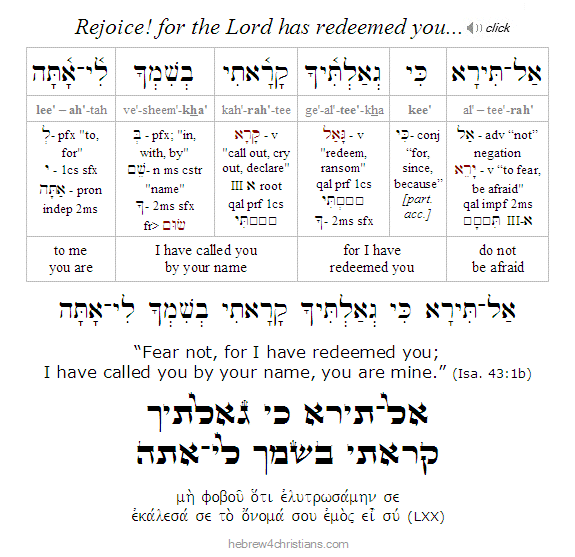 |
Leviticus and the Lamb...

[ The following is related our Torah reading for this week, parashat Vayikra... ]
03.08.22 (II Adar 5, 5782) The Book of Leviticus (ספר ויקרא) is the third of the Torah, representing another stage in our spiritual journey. Genesis reveals both our divine origin but also our tragic fallenness, and the book ends with our need for deliverance from bondage to Egypt. Exodus reveals that we are liberated from slavery by trusting in the provision of God demonstrated by the sacrifice of the Passover lamb, and the book ends with the climax of the revelation of Torah given at Sinai, namely, the building of the Mishkan (Tabernacle) where the the need for blood atonement was enshrined. Indeed blood atonement is the central theme of the central book of Torah, i.e., Leviticus, where we are called to draw near to God through sacrificial rites, the foremost of which was the ongoing offering (i.e., korban tamid: קרבן תמיד) of a defect-free male lamb, together with unleavened bread and wine. The LORD called this "My offering, My bread" (Num. 28:1-8). In other words, the very center of the Torah is the altar that constantly prefigured the Lamb of God who would be offered up to secure our eternal redemption (John 1:29; Heb. 9:11-12).
Though God instructed each household to select its own defect-free lamb for the family Passover, the Torah refers to "the" Lamb of God, as if there was only one: "You shall keep it [i.e., the Passover lamb] until the fourteenth day of this month, and the whole assembly of the congregation of Israel shall slaughter him (אתוֹ) at twilight (Exod. 12:6). Indeed there is only one great Lamb of God "slain from the foundation of the world," namely, the One given in the Garden of Eden (Gen. 3:21), sacrificed in place of Isaac during the Akedah, selected for the Passover from Egypt (and later commemorated as korban tamid (the daily offering) at the Temple (Num. 28:1-8)), later incarnated as our Savior, the great Lamb of God who offered Himself upon the cross for our sins (John 1:29), and who ascended to eternal victory to be seated upon the very Throne of God's Glory (Rev. 5:12-13; Rev. 22:1). Amen, the Torah centers on the Great Passover Lamb of God....
Hebrew Lesson:
Rev. 5:12 Hebrew reading:
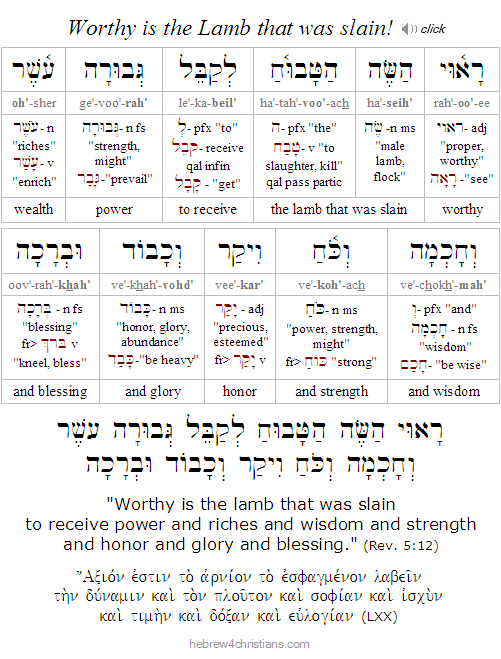 |
Healing a Divided Heart...

03.08.22 (II Adar 5, 5782) The walk of faith involves kavanah (כַּוָנָה), or focus; we are to "press on" (διώκω) to hear the upward call of God (Phil. 3:14). The problem for many of us is that we are irresolute, indecisive, and therefore we hesitate... A divided heart is at war within itself, "two-souled" (δίψυχος) and unstable in all its ways (James 1:8). This is not a matter of intellect as much as it is of the affections of the heart, or the will... If "purity of heart is to will one thing," then impurity of heart is the result of simultaneously willing two things... It is therefore a state of inner contradiction, of having two separate "minds" or "wills" that hold contrary thoughts or desires. Yeshua warned that "a divided house cannot stand."
May it please God to heal us of such ambivalence by making our hearts whole, resolute, steadfast, full of conviction, and entirely awake to the glory of His Presence at our right hand (Psalm 16:8). The LORD is always near; he is not far from each one of us. "Draw near to God (ἐγγίσατε τῷ Θεῷ) and he will draw near to you; purify your hearts, you double-minded" (James 4:8). As it is written: "The LORD is near to all who call on Him, to all who call on Him in truth" (Psalm 145:18). May we be set free from lesser fears that divide the heart and rob the soul of shalom shelemah, God's perfect peace...
"To one who has faith in God, not explanation is necessary; to one who has no faith, no explanation is possible" (Thomas Aquinas). The source of our problem, then, is the will, which serves as a gatekeeper of what we admit to ourselves, and healing comes when we are honest before God and ask Him to be delivered from our ambivalence: "Teach me your way, O LORD, and I will walk in your truth; unite my heart to fear your Name" (Psalm 86:11).
הוֹרֵנִי יְהוָה דַּרְכֶּךָ אֲהַלֵּךְ בַּאֲמִתֶּךָ
יַחֵד לְבָבִי לְיִרְאָה שְׁמֶךָ
hoh·rei'·nee · Adonai · dar·ke'·kha · a·ha·leikh · ba·a·mee·te'·kha
ya·cheid · le·vah·vee · le·yeer·ah · she·me'·kha

"Teach me your way, O LORD, and I will walk in your truth;
unify my heart to revere your Name."
(Psalm 86:11)

Early Mercies and Grace...

03.07.22 (II Adar 4, 5782) It has been said that "mercy" is not getting what you deserve (i.e., judgment/condemnation), whereas "grace" is getting what you don't deserve (i.e., favor/eternal life). Mercy forgives sin and guilt, but grace reaches out in love to the offender -- even to the point of suffering the penalty of the offence on the offender's behalf... "God shows his love for us in that while we were still sinners, Messiah died for us" (Rom. 5:8).
The pattern therefore abides: First you realize you are broken, impoverished of heart, and you therefore mourn over your sinful condition. Then you hunger and thirst for God's righteousness, for his healing and deliverance, and you learn to trust the mercy of God, that is, you come to accept that you are accepted despite your unacceptability. You begin to show yourself mercy; you learn to "suffer yourself" and forgive your own evil, and then you extend this mercy to others who are hurting around you... The failure to extend mercy, to demand your "rights" or hold on to grudges, implies that you are relating to God as Judge rather than as Savior (James 2:13). If we condemn what we see in others, we have yet to truly see what is within our own hearts; we have yet to see our desperate need for God's mercy for our lives. If you don't own your own sin, your sin will own you. Being merciful is a response to God's love and therefore is essential to genuine teshuvah... Ask the LORD to help you let go of the pain of the past by being full of mercy toward yourself and others.
God's love calls those of suffering heart to return to Him.... King David wrote, "You have said, 'Seek my face,' and my heart says to you, 'Your face, LORD, do I seek'" (Psalm 27:8). This is the "antiphon" of the Shema: God calls us to hear His Voice, so we are right to earnestly ask Him to be divinely enabled to hear what the Spirit is saying...
King David asked for God's miraculous intervention to heal his soul: "Cause me to me hear your lovingkindness in the morning, for in You do I trust. Cause me to know the way I should go, for I lift up my soul to you" (Psalm 143:8). David's request was that he would be empowered to hear God's loving voice calling to his heart at the start the day, to be assured of God's kindness and favor. Note that the Hebrew verbs used in this verse are both hiphal imperatives, implying that God is the agent or cause of the action. We lift up our heart in expectation, understanding that the LORD alone is the One who is able to draw us near to Him: "You [God] cause me to hear... You [God] cause me to know..."
Hebrew Lesson:
Psalm 143:8 Hebrew reading:
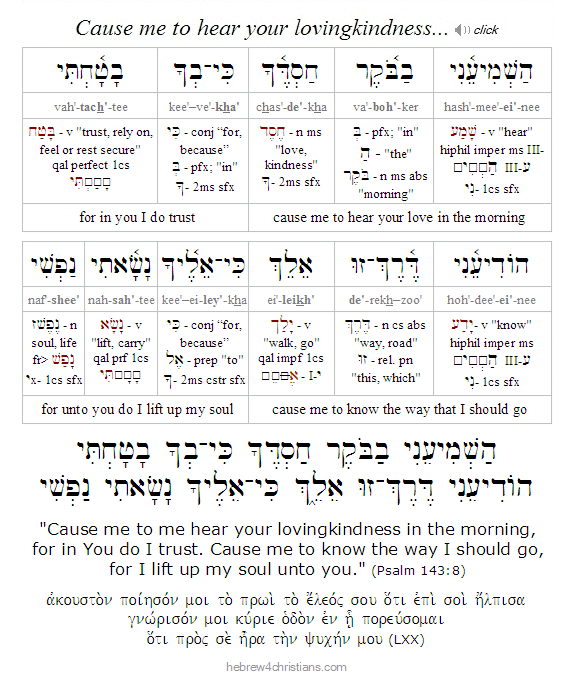 |
Mystery of Knowing God...
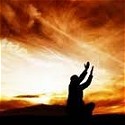
[ "Oh teach me in each moment of every Now to know that You are the Here in all my wandering and the Yes in all my wondering and the Love in nothing less than everything."- Meister Eckhart ]
03.07.22 (II Adar 4, 5782) I had mentioned in another place that the letter Aleph (א) at the end of the word vayikra ("and he called") is written smaller than the other letters in the word, which the sages say represents the humility of God - both in his condescension to be known by human beings, but also in his willingness to be "sacrificed" by making room for us within the creation. Just as the Cloud of Glory so overwhelmed the Mishkan (Tabernacle) so that Moses himself was unable to enter (Exod. 40:35), so all of reality is filled with God's glory, and thankfully God has made a place for you by means of his sacrifice... This idea is sometimes called "tzitzum" (צימצום) in Jewish theology, which means God had to contract or "empty" himself in order to make space for the created universe.
There is a fundamental ambivalence regarding how we may relate to God. On the one hand, drawing close to God is a dangerous prospect. When Moses first encountered the LORD at the burning bush, for example, he was afraid to look upon God and was told not to draw near because the place was holy (Exod. 3:5). Moses was afraid because God was transcendent, holy, unapproachable, incomprehensibly powerful and unutterably glorious. This unease or dread is called yirat Adonai (יראת ה), or the "fear of the LORD." On the other hand, drawing close to God is the heart's greatest desire (and need), and blessedness is found as we learn to trust in Him and know Him in all our ways. This is called devakut (דבקות), or "cleaving" to the LORD in communion and surrender to his grace (Deut. 10:20). The ambivalence arises because the Scriptures teach that we should both fear and love the Lord -- contradictory and antithetical passions within the soul (Deut. 10:12; Psalm 2:11; Heb. 10:31).
Recall that after Israel's sin with golden calf, Moses despaired over his life and underwent a 40 day period of teshuvah and "face-to-face" (פָּנִים אֶל־פָּנִים) prayer before the Lord. When God finally reassured him he had found grace in his eyes and that he would remain faithful to Israel because of his intercession, Moses asked God to show him his glory (Exod. 33:12-18). The Lord then replied: "I will make all my goodness pass before you and will proclaim my name 'The LORD' before you (וקָרָאתִי בְשֵׁם יְהוָה לְפָנֶיךָ). And I will be gracious to whom I will be gracious, and will show mercy on whom I will show mercy." But he further said, "you cannot see my face, for man shall not see me and live" (Exod. 33:19-20). The Lord then said to Moses, "there is a place by me where you shall stand on the rock (וְנִצַּבְתָּ עַל־הַצּוּר), and while my glory passes by I will put you in a cleft of the rock, and I will shield you with my hand until I have passed by. Then I will take away my hand, and you shall see my back (וְרָאִיתָ אֶת־אֲחֹרָי), but my face shall not be seen (וּפָנַי לֹא יֵרָאוּ)." Now this is a fascinating and puzzling narrative, because first we are told Moses spoke with God "face to face" but then God told Moses no one can see his face and live, and furthermore, though Moses would not be given a direct vision of God's face, God would permit Moses to see his "back side" (אֲחֹרָי), that is, a vision gained at a distance, or at least in some sort of indirect way....
Perhaps Moses could not see the glory of God (כּבוד יהוה) because it is simply too intense to be apprehended by a human being. God's essence is beyond all human comprehension and therefore is ultimately mysterious (Isa. 40:28; 55:8; Psalm 145:3; 147:5). No more can you stare directly at the sun without damaging your eyes that you can look directly upon the face of God without blowing your mind.... The "back side" of God then represents his accessibility to us - his reflection "through the glass" - wherein his face remains veiled from view.
As I mentioned above, there is a sort of tension implied in the very act of creation whereby God must limit or "empty" himself in order to "make a place" for anything outside of himself. God is the only Necessary Being, which is alluded to in the original definition of YHVH (יהוה) as ehyeh (אהיה), the great "I am." As Life or Being itself, God is essential to all that exists, though all that exists is contingent (i.e., dependently derivative) and therefore fundamentally different in its ontology (being-status) than the Being of God. So there is this dualism or eternal gap between the infinite and the finite. Now the divine act of "making a place" for creation is, from a human and cognitive perspective, a sort of divine disguise, or a "hiding of face," and the meaning of special revelation presents an invitation to seek God's presence despite the ambiguity and uncertainties of the venture. We must exercise care as we seek God, however, because we are explicitly commanded not to make any image or likeness of God, and yet it is difficult not to use language that is analogical when we think about spiritual matters (1 Cor. 2:13). If we are forbidden to make any image of God, how can we draw close to that which is beyond all the power of our imagination (Isa. 40:25)?
So the life of faith is paradoxical, since (by definition) the idea of the infinite overwhelms and annihilates the finite, and yet we desire to connect with God, to cleave to him and to be made safe in terms that we can understand... Theologically this dilemma may be stated that we are to both fear the Lord and yet love the Lord with all our heart, soul, and strength. I realize that this is somewhat abstract, though the question resolves to how we are to relate to God in very practical terms. Yeshua, our tender and loving Good Shepherd, the one upon whose breast John did lean, is yet the one whose eyes are as blazing fire, who bears a name that no one knows but he himself, and from before whom the nations flee in dread.
Our relationship with God therefore defies a tidy systematic theology that attempts to catalog and explain the mysteries of walking by faith in the Living God. Like the proverbial fiddler on the roof we must balance well lest we fall into trouble. The thought that an infinite God cannot be satisfied with anything less than absolute surrender can lead us to despair; the thought that God's love is unconditional can lead to a false sense of intimacy....
The "back side" of God is where we can find stability. Though God is indeed inexpressibly glorious and incomprehensible in his essence, he empties himself of glory so that human language and words have real meaning. That is the miracle of the incarnation, after all: God the Infinite disclosed in finite space-time. Therefore as YHVH passes by Moses the words are heard: "Merciful and gracious, long-suffering, full of steadfast love, and willing to forgive all who trust in Him (Exod. 34:6-7). These are human words; these are words of the heart. The moral attributes of God are indicative of his character (or "face") after all, even if the attributes of his power and inscrutable essence transcend our understanding. We can know more than what God is not, after all; we can know truth revealed in words that we can understand. In the last analysis, it is mercy and grace that connects us with God, and indeed the Infinite One who clothed himself in finitude and mortality heals the breach and despair of the wounded heart that trusts in his sacrificial love.
So does it matter that we cannot know the "essence" of God, that is, his "incommunicable" attributes, and that indeed we will never be able to do so, no, not even in eternity? In a sense no, because what matters most is not what we know about God as much as what he knows about us. Moreover, since the Lord is infinite and entirely omnipotent, he has both the unlimited ability and the means to reveal himself to us in terms that we can genuinely understand, even if our knowledge of him will be necessarily incomplete. As it is written: "The secret things belong to the LORD our God, but those that are revealed belong to us and our children forever, that we may do all the words of this Torah" (Deut. 29:29).
Yeshua is the Language, the Message, and the Revelation of the Infinite clothed in the finite, and therefore he is the greatest expression of heaven represented in human form. Such revelation is sometimes called argumentum spiritus sancti, or the "argument from the Holy Spirit." Kierkegaard wrote in his journals: "In 1 John 5:9 we read: 'If we receive the testimony of men' (this is all the historical proofs and considerations) 'the testimony of God is greater' -- that is, the inward testimony is greater. And then in verse 10: 'He who believes in the son of God has the testimony in himself.' Therefore genuine faith is more than a creed or "doctrine"; it is existence itself, a matter of spirit, wherein new life is expressed in relationship to God through Yeshua the Savior. Regarding the rational enterprise of theology proper, Kierkegaard wrote: "A dogmatic system ought not to be erected on the basis: to comprehend faith, but on the basis: to comprehend that faith cannot be comprehended" (Journals and Papers).
Our lives are surrounded by miracles, mysteries, and wonders... We cannot "live, move, and have our being" apart from the surpassing glory that pervades reality, and particularly that which makes our hearts alive. Faith sees the hidden mystery and celebrates God's love.
Hebrew Lesson:
Deuteronomy 29:29 Hebrew reading:
Addendum:
Meaning and Religious Language
The problem of understanding God's essence concerns the limits of human language and meaning. For instance, if we say that God is infinite (i.e., non-finite) the words we normally use to describe finite creation suddenly become inadequate. (Even in mathematics we run into paradoxes regarding infinity: are there as many prime numbers as there are nonprime?) The attributes we use to describe finite beings cannot be directly applied to infinite Being without ambiguity. Indeed, some philosophers have said that the very idea of "infinity" is incomprehensible or incoherent. We see this in the case of the "predicate of existence," for example. God's existence is not like the existence of finite and contingent things that are subject to change, dissolution, and decay. Therefore we cannot say that "God exists" without qualification; we cannot ascribe properties to God based on the observed properties of creatures. This has led some theologians to say God's existence is "necessary," by which is meant that God cannot not exist, though this mode of existence is entirely different from all other forms of contingent existence known...
When it comes to language about God, either the predicates we use are equivocal (they mean entirely different things when applied to things in the world than they do for God), or they're univocal (they mean the exactly the same thing), or they're analogical (they mean more or less the same thing):
 |
For Maimonides (and other rationalist thinkers) the "Torah is written in the language of men," by which is meant that there is a great gap between language about the world and the language about God. Saying "God is merciful," for example, means that actions of God are interpreted as merciful by human beings (analogical reasoning), but strictly speaking, there is no correspondence or "relation of similarity" between God's essential nature and human beings, and therefore we cannot say this is a true statement about God's essence. This distinction sometimes leads to paradoxes in theological discussion, when the attributes of action are confused with God's essential (or "negative") attributes.
The "Small Aleph" of Revelation...

[ The following is related our Torah reading for this week, parashat Vayikra... ]
03.07.22 (II Adar 4, 5782) The first verse of the Book of Leviticus is usually translated: "And the LORD called to Moses and spoke to him," where the subject of the verb vayikra (וַיִּקְרָא), "and he called," has an implied antecedent, which if expressed would read: "And the LORD called to Moses and the LORD spoke to him..."
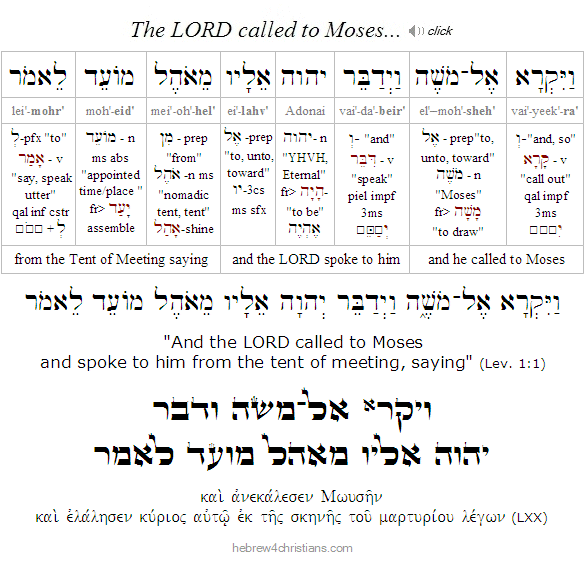 |
Something interesting in this connection is that the Hebrew text of the Torah scroll is written with a diminutive Aleph (א) at the end of the verb vayikra which indicates something of textual and grammatical interest. Note that the letter Aleph is constructed from two letter Yods (י), each of which represents a yad, or "hand," joined by a diagonal Vav (ו) which represents a man (see diagram below). One Yod (י) reaches upward while the other reaches downward, and both extend from the "fallen" Vav (ו), picturing Yeshua, the humble One who was "wounded for our transgressions, and bruised for our iniquities" as our Mediator between heaven and earth (Isa. 53:5; 1 Tim. 2:5). The implied subject, then, of vayikra can be seen to be the "small Aleph," the Humble One who calls out from the Tent of Meeting...
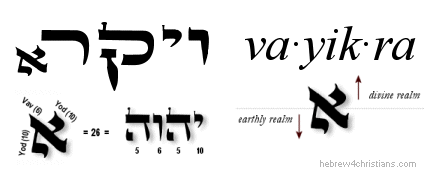 |
Aleph is the first letter of the first word of the first commandment of God: anokhi (אָנכִי): "I AM" (Exod. 20:2), which also designates the Name ehyeh (אֶהְיֶה) first revealed to Moses (Exod. 3:14). The numerical value of Aleph is one, indicating its preeminence, and it is a silent letter, alluding to the ineffable mystery of God's sovereign will (the related word aluph (אַלּוּף) means "Master" or "Champion"). In the Hebrew script used for writing Torah scrolls (ketav Ashurit), Aleph is constructed from two Yods (that represent "hands") joined by a diagonal Vav (that represents man). One Yod (י) reaches upward while the other reaches downward, and both extend from the "fallen" Vav (ו), picturing a "wounded Man" or Mediator (1 Tim. 2:5). In the Hebrew numbering system (i.e., gematria), Yod = 10 and Vav = 6, so adding up the three parts of Aleph yields 26, the same value as the Name of the LORD: YHVH (יהוה). The very first letter of the Hebrew Alphabet, then, pictures the three-in-one LORD who mediates all of life for our salvation. And just as there are three parts to Aleph, but Aleph is One (echad: אֶחָד), so there are three Persons to the Godhead, yet God is absolutely One. Indeed, the gematria of the word Aleph (אָלֶף) is 111 (Aleph=1, Lamed=30, and Pey=80). As Yeshua said, every "jot and tittle" of Scripture is significant...
"And he called" is written anonymously, but once you understand that this is the Word of the LORD speaking, you will turn back to the Creator and then YHVH will speak to you from within the Tent of Meeting...
The LORD Calls Out - ויקרא

[ This week we begin a new book of Torah, sefer Vayikra (i.e., the book of Leviticus)... ]
03.06.22 (II Adar 3, 5782) Chodesh tov, chaverim! Welcome to another week to study Torah and draw close to the Living God. Our Torah reading for this week is Vayikra ("and he called"), the very first portion from the Book of Leviticus (ספר ויקרא). In Jewish tradition, the Book of Leviticus is sometimes called the "Book of Sacrifices" (ספר הזבחים) since it deals largely with the various sacrificial offerings brought to the altar at the Mishkan (i.e., Tabernacle). Indeed, over 40 percent of all the Torah's commandments are found in this central book of the Scriptures, highlighting that blood atonement is essential to the Torah. Indeed, since the revelation of the Tabernacle was the climax of the revelation given at Sinai, the Book of Leviticus serves as its ritual expression, as it is written: "For the life of the flesh is in the blood, and I have given it for you on the altar to make atonement for your souls, for it is the blood that makes atonement (kapparah) by the life" (Lev. 17:11).
Unlike narrative portions of other books of the Torah, the Book of Leviticus begins with the LORD "calling out" (i.e., vayikra) to Moses to explain that the way to draw near to Him is by means of atoning sacrifice. It is noteworthy that throughout the book, only the sacred name of the LORD (יהוה) is used in connection with sacrificial offerings, and never the name Elohim (אלוהים). This suggests that sacrificial offerings were given to draw us near to experience God's mercy and compassion rather than to simply appease His anger.... In other words, the Name of the LORD represents salvation (i.e., yeshuah: ישועה) and healing for the sinner, not God's judgment (John 3:17). Indeed, the word korban (קרבן), often translated as "sacrifice" or "offering," comes from a root word karov (קרב) that means to "draw close" or "to come near" (James 4:8). The sinner who approached the LORD trusting in the efficacy of the sacrificial blood shed on his or her behalf would find healing and life...
Note that the word in the ancient Greek translation of the Torah (called the Septuagint) that was selected to translate the Hebrew word kapporet (i.e., כפרת, "mercy seat") is hilasterion (ἱλαστήριον), sometimes translated "propitiation." The New Testament picks up this usage in Romans 3:25: "God put forward Yeshua as a propitiation (ἱλαστήριον) through faith in His blood." In other words, the shedding of Yeshua's blood - represented by His Passion upon the cross - was "presented" upon the Heavenly Kapporet, before the very Throne of God Himself for our atoning sacrifice (i.e., kapparah: כפרה) before God.
Made Captive to Hope...
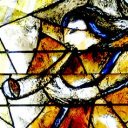
[ "As long as I am content to know that He is infinitely greater than I, and that I cannot know Him unless He shows himself to me, I will have Peace, and He will be near me and in me, and I will rest in Him." - Thomas Merton ]
03.04.22 (II Adar 1, 5782) Many people want healing apart from the cure. How many settle for half-measures? While you might find respite for your suffering in temporary measures, you cannot have lasting healing apart from the divine remedy...
God gives us special graces, especially in light of the passing of days, with thwarted hope, aching bones, and inner keening for lasting deliverance from the relentless insanity of this world. This gift of despondency helps us to awaken and to reach out to find the Real, the True, the Eternal. Learn to wait; ask God for the wisdom of patience. Between acceptance and anxiety, always choose acceptance. Find hope while waiting... there is hidden joy.
An old Jewish prayer, uttered somewhat wistfully, begins, "O Lord, I know that Thou wilt help us; but wilt Thou help us before Thou wilt help us?" It's not always easy to wait for God, especially when we are in pain or anxiety, but we must never, ever, give up; we must never ever, abandon our heart's longing for ultimate healing. Faith excercises hope in the Reality, Substance, and Being (ὑπόστασις) of the Invisible and is made captive to undying hope (Heb. 11:1). Therefore the Spirit cries out: "Wait for the LORD; be strong and he will strengthen your heart; therefore wait for the LORD" (Psalm 27:14).
Hebrew Lesson:
Psalm 27:14 Hebrew reading lesson:
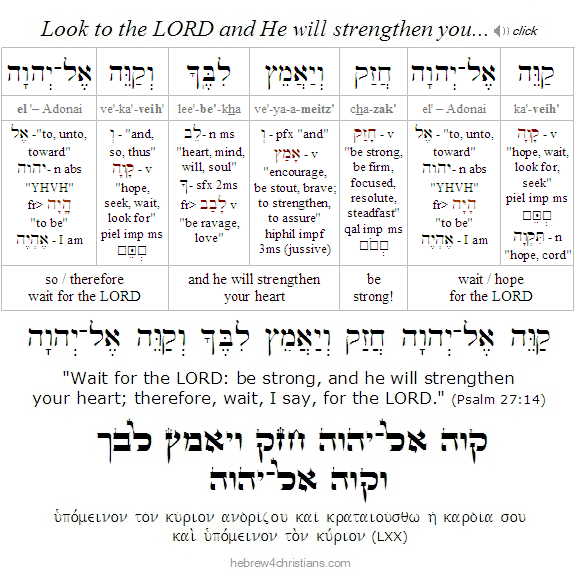 |
In this verse, the imperative verb translated "wait" is the Hebrew word kaveh (קַוֵּה), which might better be rendered as "look for with anticipation!" or "hope!" (the same root appears in the Hebrew word for hope, i.e., tikvah: תִּקְוָה). Therefore hope in the Lord and "chazak!" - be strong! (the Septuagint translates chazak as "andridzou" (ἀνδρίζου - act like a man!). Note that the verb ve'ametz is a causal active stem (i.e., Hiphal) in the "jussive mood," which means it is imperative – "command your heart to be strengthened," or "let your heart be made strong!" Make the decision to be strong in the LORD, and the LORD will give you the strength of heart to persevere: "Look to the LORD (קַוֵּה אֶל־יְהוָה) and find hope."
בָּרוּךְ אַתָּה יהוה אֱלהֵנוּ מֶלֶךְ הָעוֹלָם
אֲשֶׁר עָשָׂנוּ אֲסִירֵי תִּקְוָה
ba·rookh · a·tah · Adonai · E·lo·hei'·noo · me'·lekh · ha·o·lahm
a·sher · ah·sah'·noo · a·see·rei · teek·vah

"Blessed are You, LORD our God, King of the universe,
who has made us captives of hope."

When we put our hope in the LORD, strong in our conviction, we will be given courage to bear whatever may befall us - and this is help indeed during these perilous days! So "hope to the LORD (קַוֵּה אֶל־יְהוָה); be strong and strengthen your heart; and (again) hope to the LORD." There can be no turning to God without genuine hope (תִּקְוָה). Indeed, as the Apostle Paul wrote: "We are saved by hope" (Rom. 8:24). Shabbat shalom!
|













































